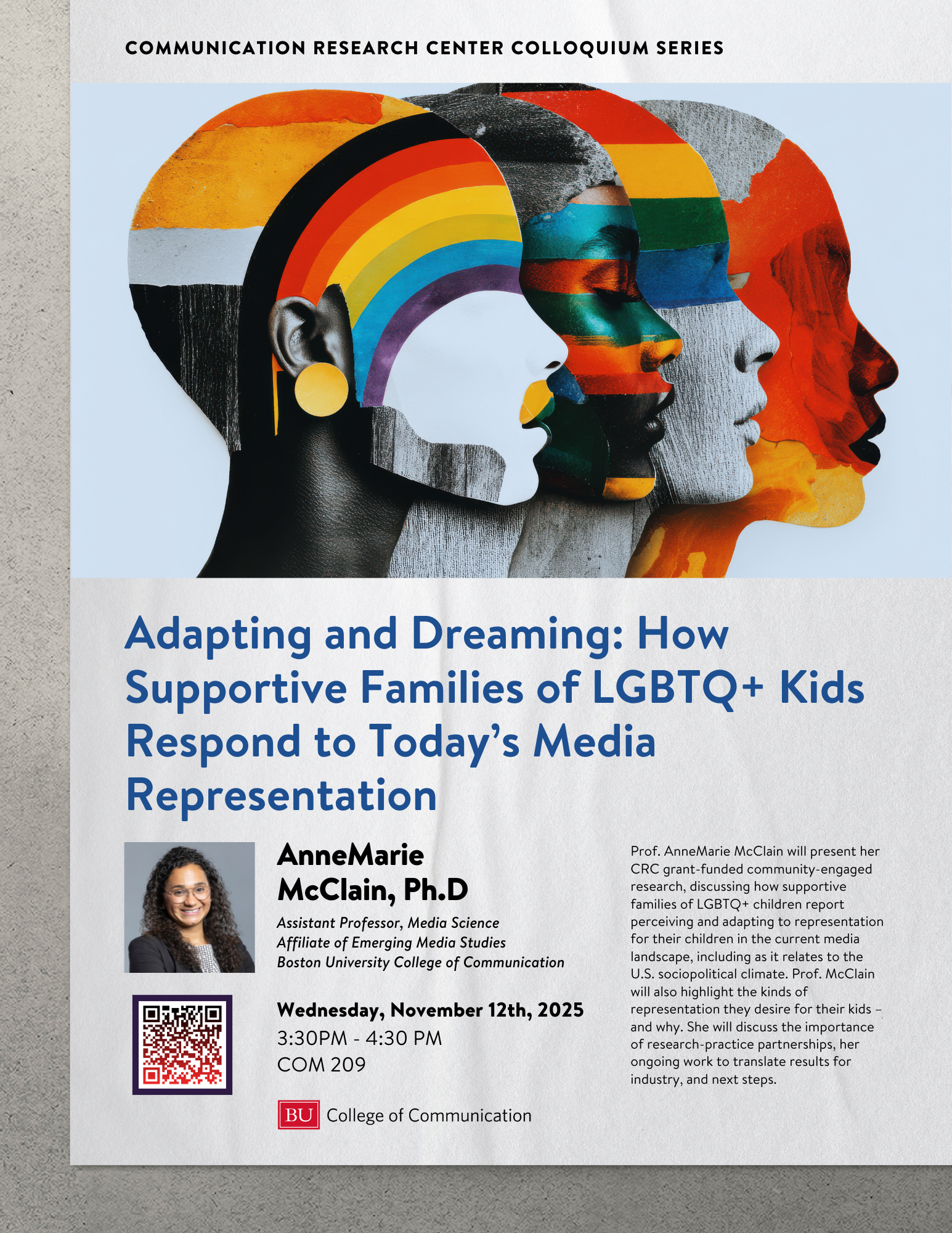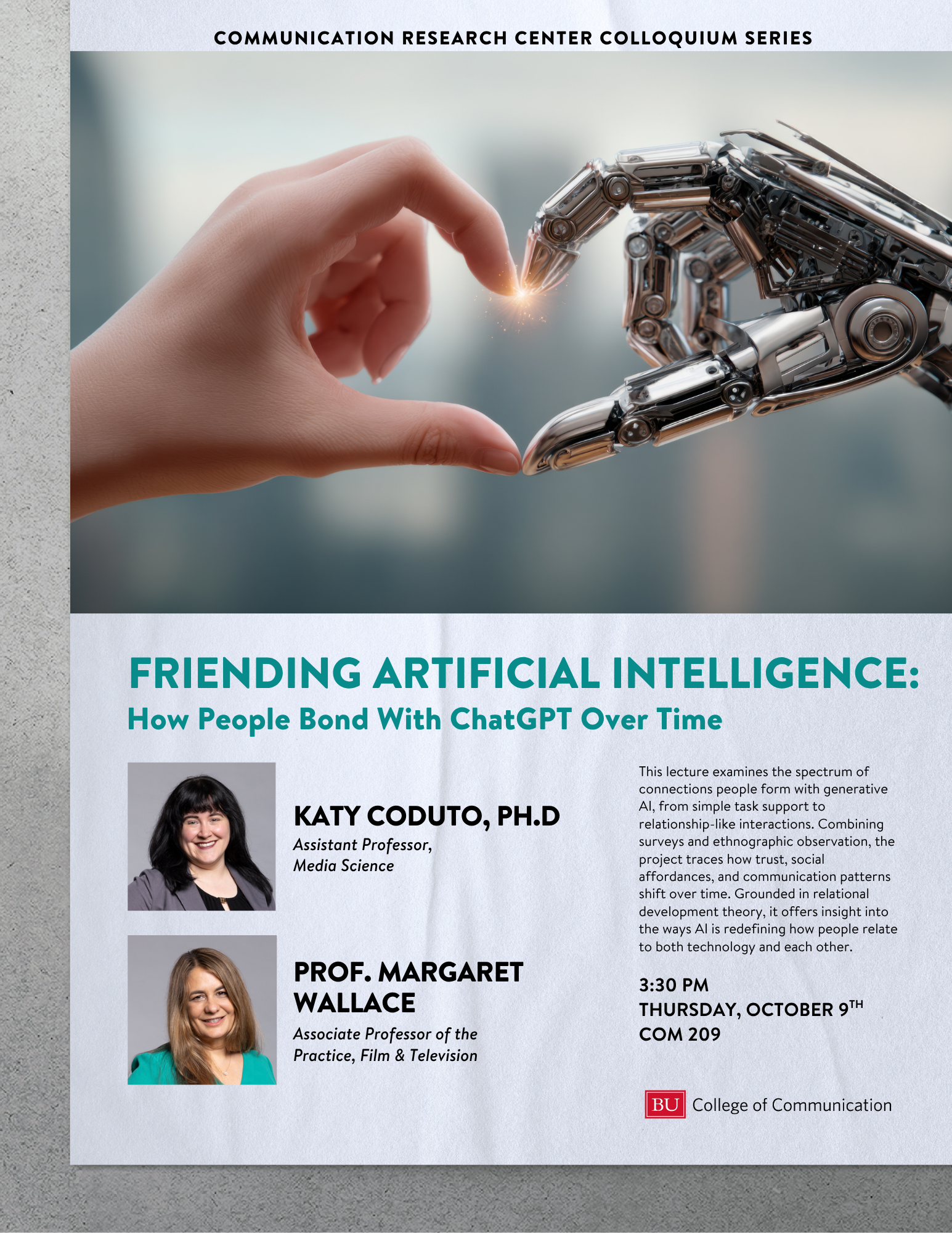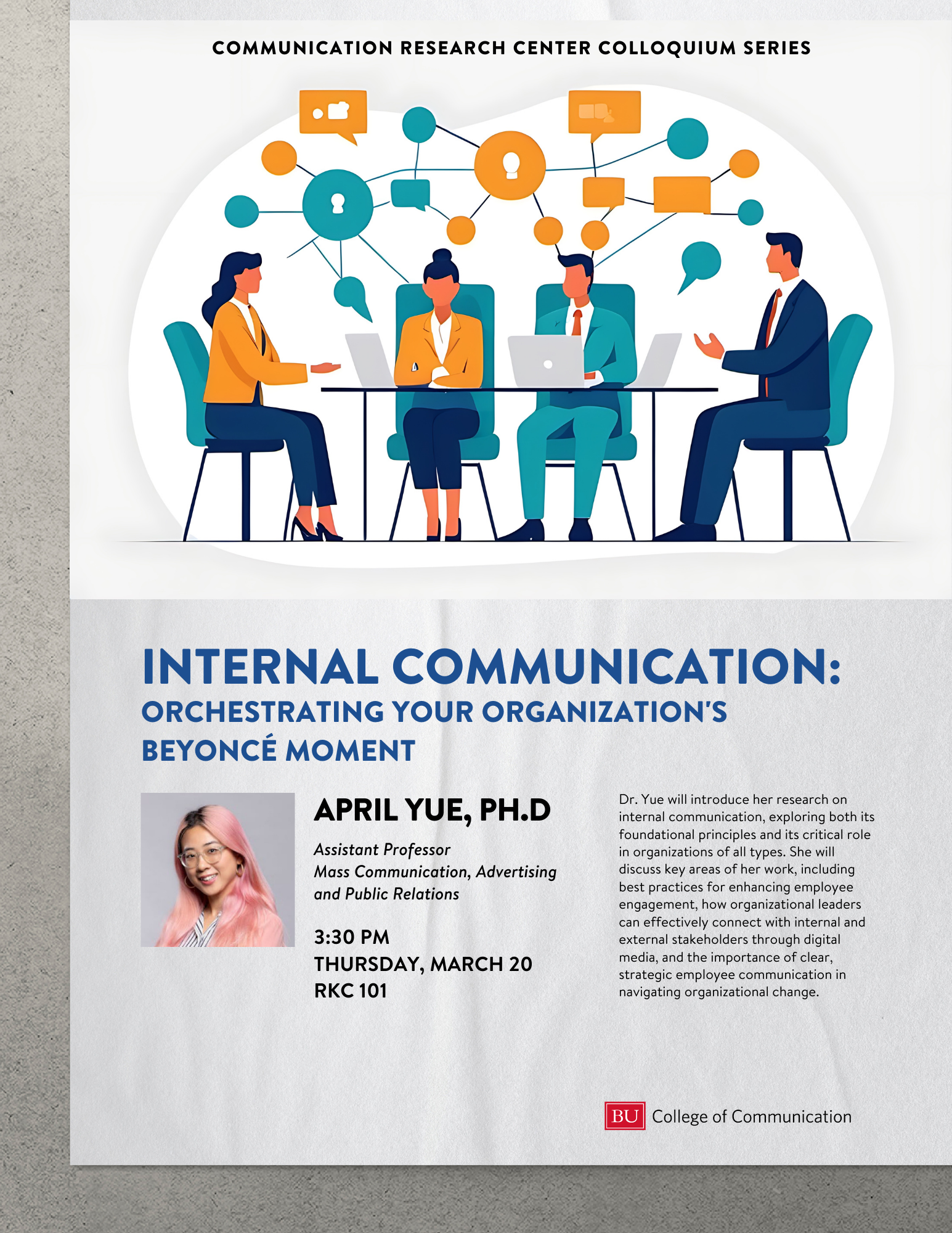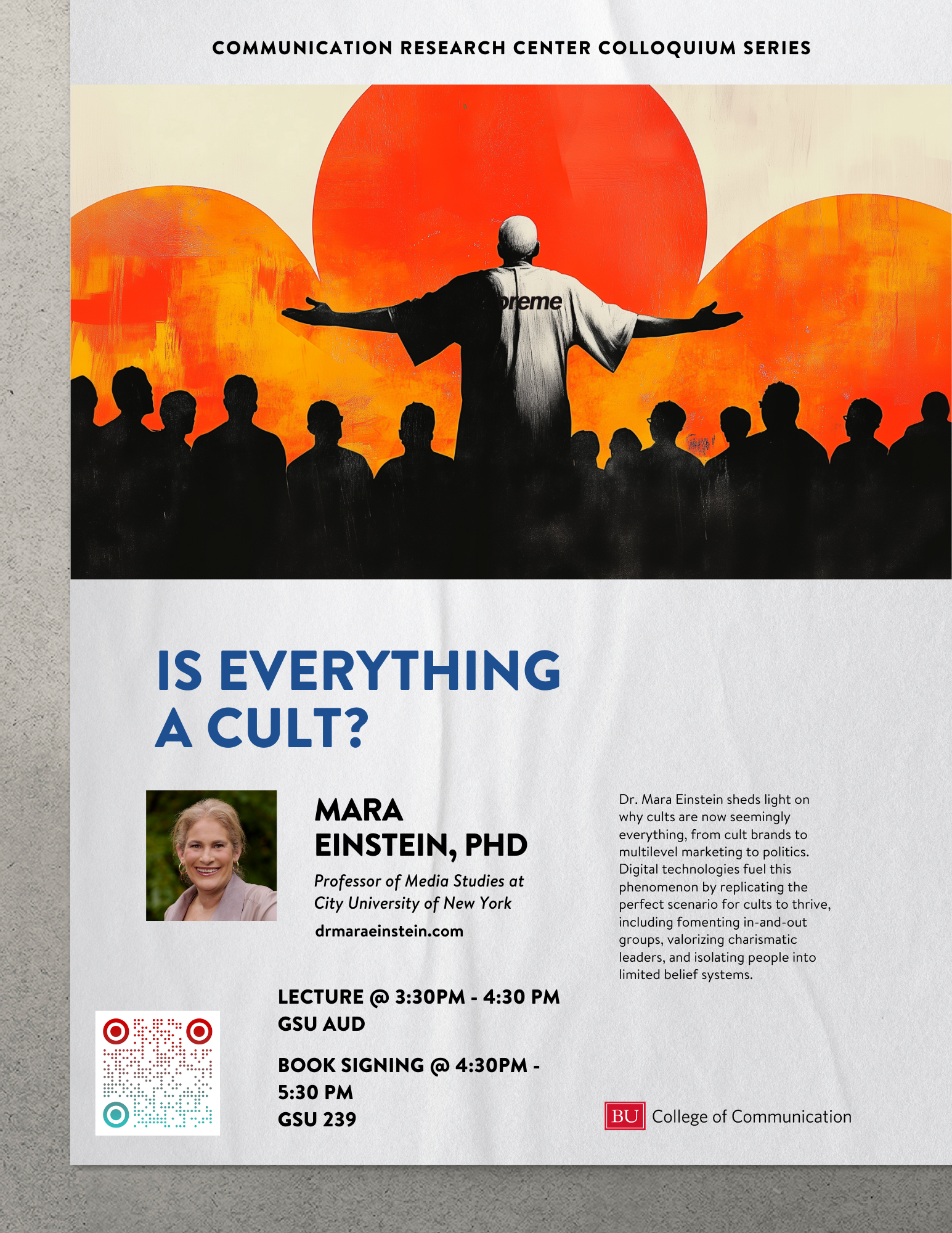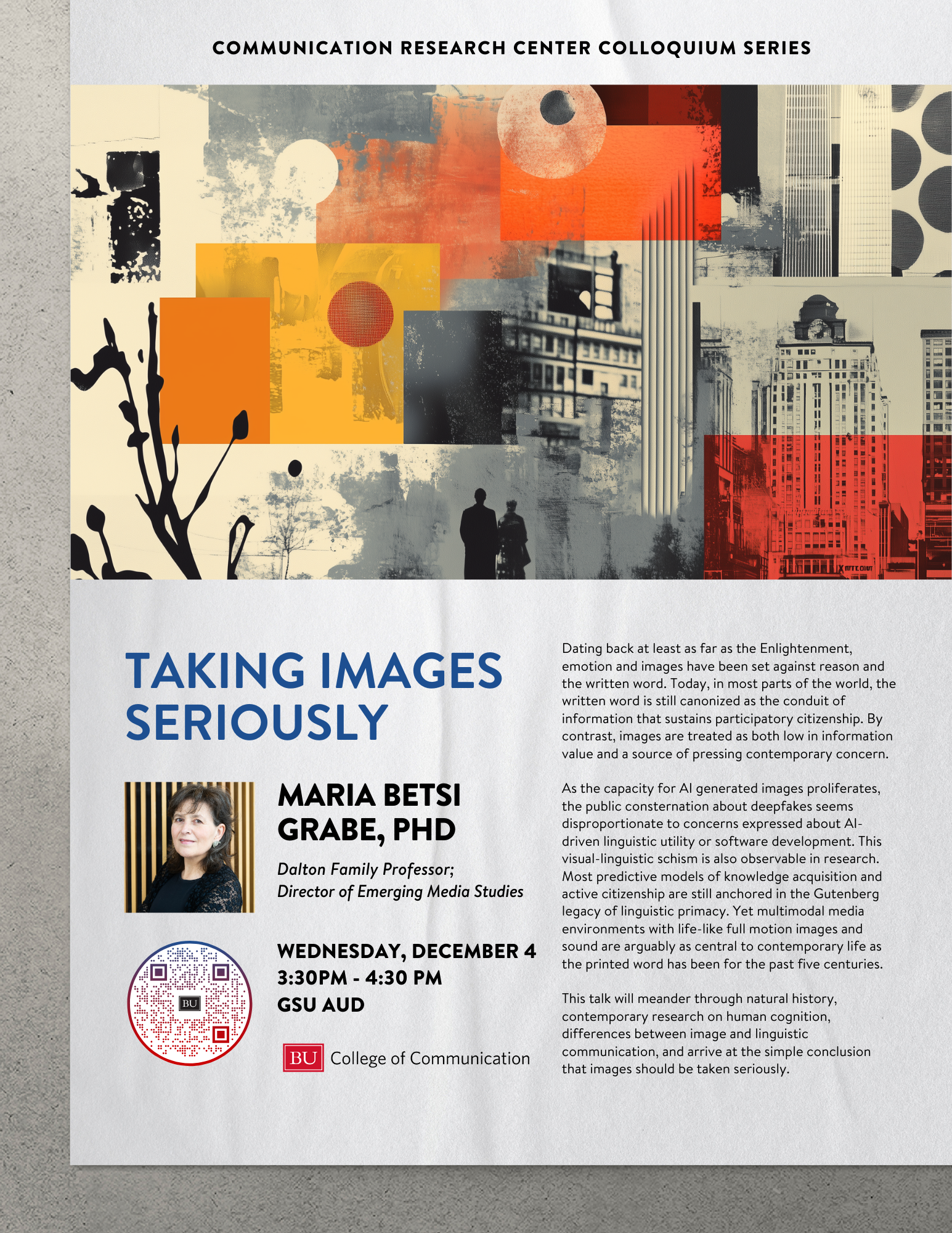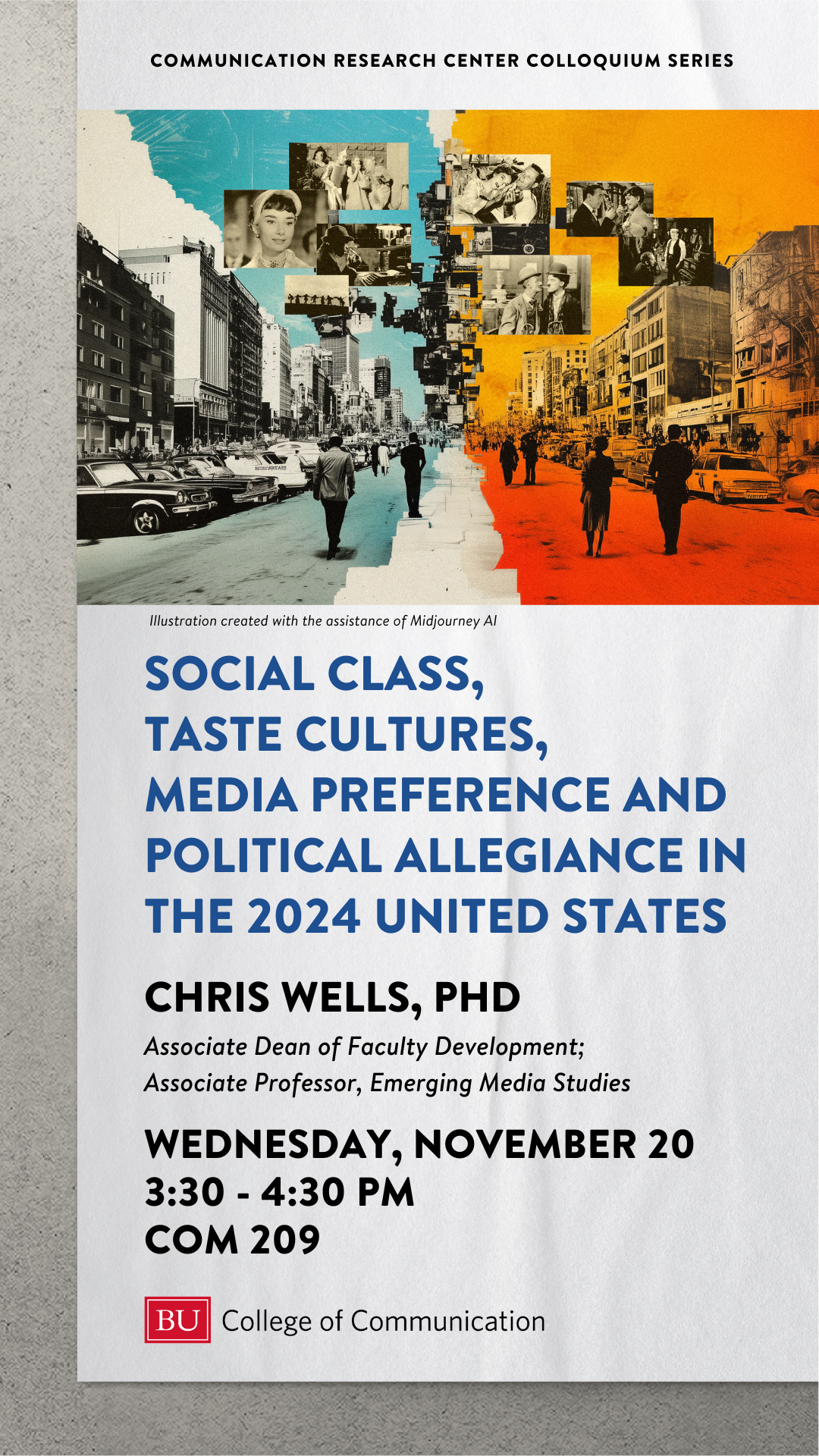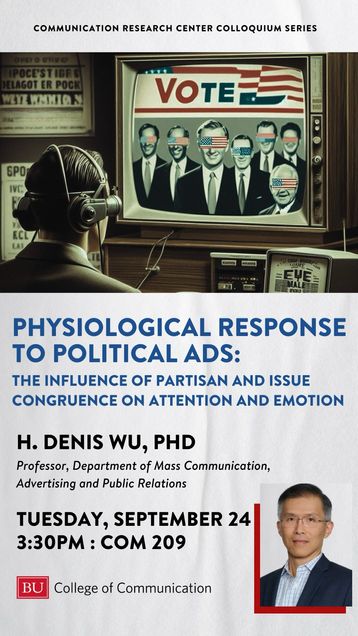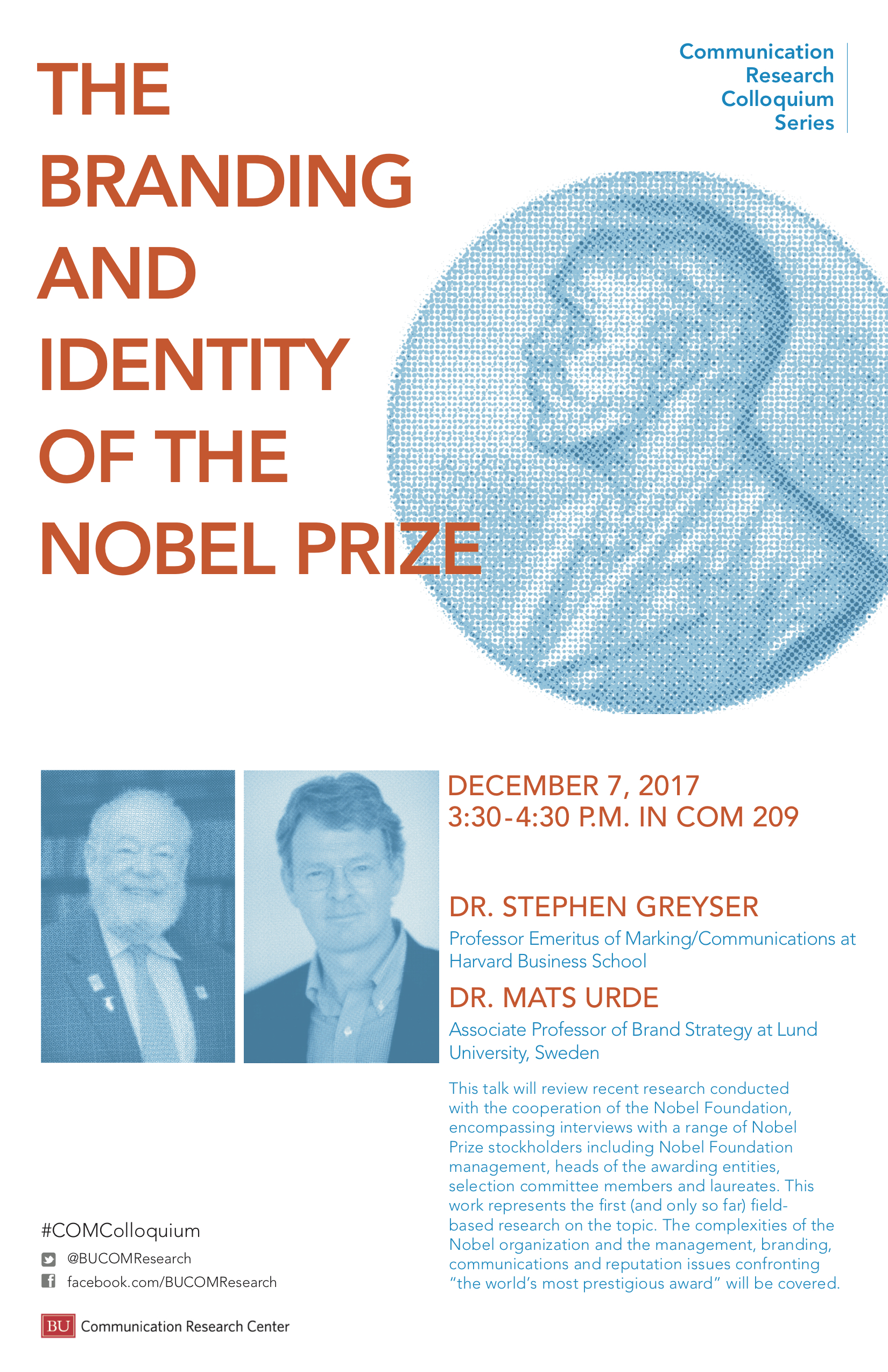COM Research Colloquium Series
The Communication Research Colloquium Series at Boston University was established in October 2009. This series consists of monthly research presentations that highlight current and original research of faculty in the College of Communication. This forum provides an intellectual exchange of ideas and perspectives, features scholarship in several methodological traditions, and fosters discussions among faculty and students about a variety of research topics in the field of communication.
Upcoming Lectures
Past Lectures
Adapting and Dreaming: How Supportive Families of LGBTQ+ Kids Respond to Today’s Media Representation
ANNEMARIE MCCLAIN, PH.D
Associate Professor of the Practice, Film & Television
November 2025
Prof. McClain will present her CRC grant-funded community-engaged research, discussing how supportive families of LGBTQ+ children report perceiving and adapting to representation for their children in the current media landscape, including as it relates to the U.S. sociopolitical climate.
She will also highlight the kinds of representation they desire for their kids–and why. She will discuss the importance of research-practice partnerships, her ongoing work to translate results for industry, and next steps.
Friending Artificial Intelligence: How People Bond with ChatGPT Over Time
KATY CODUTO, PH.D
Assistant Professor of Media Science
MARGARET WALLACE
Associate Professor of the Practice, Film & Television
October 2025
This lecture examines the spectrum of connections people form with generative AI, from simple task support to relationship-like interactions. Combining surveys and ethnographic observation, the project traces how trust, social affordances, and communication patterns shift over time. Grounded in relational development theory, it offers insight into the ways AI is redefining how people relate to both technology and each other.
An AI-Assisted Methodology for Quantifying Measurement Error of Social Media Text Posts
MICHAEL G. ELASMAR, PH.D
Associate Professor of Media Science
September 2025
Can we use AI to help us extract media users’ thoughts and feelings from the texts they post? This presentation proposes and provides a proof of concept for an AI-assisted methodology that aims to quantify validity and reliability in the context of social media text expressions.
It demonstrates that there is a lot more to extract from text than sentiment and shows that the traditional practice of analyzing whole text isn’t the best approach.
Communicating Authenticity in Corporate Social Advocacy
EJAE LEE, PH.D
Assistant Professor of Public Relations
April 2025
Corporate engagement with sociopolitical issues leads to both tangible and potential outcomes that enhance relationship quality, corporate reputation, and financial performance. However, when people perceive corporate social advocacy (CSA) communication as lacking authenticity, it can compromise the impact of CSA efforts, undermining the company’s genuine commitment to social change.
This talk will examine how individuals’ perceptions of a corporation’s stance on sociopolitical issues—whether it upholds, alters, or remains silent—affect their views on authenticity, as well as their attitudes and behaviors toward the corporation. From a public relations perspective, we will also discuss the implications of research on authenticity, particularly in light of recent cases where some corporations have scaled back their CSA initiatives due to social and political pressures.
Internal Communication: Orchestrating Your Organization’s Beyoncé Moment
APRIL ‘CEN’ YUE, PHD
Assistant Professor of Mass Communication, Advertising, and Public Relations
March 2025
Internal communication is the backbone of any successful organization, shaping how information flows between leaders and employees, fostering engagement, and ensuring alignment with organizational goals. It encompasses everything from leadership messaging and company-wide announcements to team collaboration and crisis communication. For example, during times of major change—such as corporate mergers, leadership transitions, or policy shifts—effective internal communication helps employees stay informed, motivated, and aligned with the company’s vision.
In this talk, Dr. Yue will introduce her research on internal communication, exploring both its foundational principles and its critical role in organizations of all types. She will discuss key areas of her work, including best practices for enhancing employee engagement, how organizational leaders can effectively connect with internal and external stakeholders through digital media, and the importance of clear, strategic employee communication in navigating organizational change.
Is Everything a Cult?
MARA EINSTEIN, PHD
Professor of Media Studies at City University of New York
February 2025
Dr. Mara Einstein sheds light on why cults are now seemingly everything, from cult brands to multilevel marketing to politics. Digital technologies fuel this phenomenon by replicating the perfect scenario for cults to thrive, including fomenting in-and-out groups, valorizing charismatic leaders, and isolating people into limited belief systems.
At the lecturer’s request, the video will not be uploaded.
Taking Images Seriously
MARIA BETSI GRABE, PHD
Dalton Family Professor and Director of Emerging Media Studies
December 2024
As the capacity for Al generated images proliferates, the public consternation about deepfakes seems disproportionate to concerns expressed about Al-driven linguistic utility or software development. This visual-linguistic schism is also observable in research.
Most predictive models of knowledge acquisition and active citizenship are still anchored in the Gutenberg legacy of linguistic primacy. Yet multimodal media environments with life-like full motion images and sound are arguably as central to contemporary life as the printed word has been for the past five centuries.
This talk will meander through natural history, contemporary research on human cognition, differences between image and linguistic communication, and arrive at the simple conclusion that images should be taken seriously.
Social Class, Taste Cultures, Media Preference and Political Allegiance in the 2024 United States
CHRIS WELLS, PHD
Associate Dean of Faculty Development; Associate Professor of Emerging Media Studies
November 2024
Defining social class in the United States has been a puzzle for over two hundred years, and class has always had complex interactions with political power. This is all the more true in 2024; the presidential election results are expected to show significant reconfiguration of the relationship between certain core constituents of social class—economic wealth and race—and partisan politics. Elsewhere in our culture, we have seen the steadily growing politicization of a wide range of consumer preferences, from clothing to automobiles to entertainment, not to mention proliferating partisan media and social media.
How can we understand social class, the consumer practices that help to constitute it, and political media in 2024? This presentation will discuss work in progress from a project that takes intellectual inspiration from sociologists Pierre Bourdieu and Michael Savage and aims to (1) provide a typology of American social class based on individuals’ levels of economic and cultural capital (in particular, tastes for particular consumer objects); and (2) relate those social classes to political and media preferences.
In this talk, I will discuss the theory that informs the project, two primary methods (correspondence analysis and latent class analysis of survey data), and preliminary results.linguistic primacy. Yet multimodal media environments with life-like full motion images and sound are arguably as central to contemporary life as the printed word has been for the past five centuries.
Physiological Response to Political Ads:The Influence of Partisan and Issue Congruence on Attention and Emotion
H. DENIS WU, PHD
Professor, Department of Mass Communication, Advertisingand Public Relations
September 2024
Political advertisements are a mainstay of electoral campaigns. Voters’ physiological responses to political advertisements can disclose genuine campaign effects, but they are hardly studied.
This talk will report an experimental study that employed eye-tracking and facial expression analyses to gauge voters’ cognitive and affective responses to real campaign ads that are focused on specific issues and sponsored by different political entities.
The findings shed light on questions including: Do voters’ party affiliation and issue concern influence their attention and emotional response to political ads? To what extent do self-report and physiological measures match? Do whether positive or negative emotions drive voting decisions?
2023 - 2024 Lectures
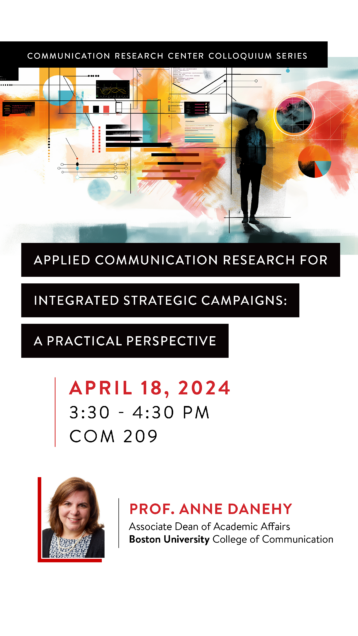
Applied Communication Research For Integrated Strategic Campaigns: A Practical Perspective
Prof. Anne Danehy
Associate Dean of Academic Affairs
April 2024
This presentation delves into the indispensable role of applied communication research within the realm of integrated strategic communication campaigns.
Applied research informs and elevates communication strategies across diverse channels and platforms and aids in creating culturally sensitive messaging. This presentation will provide insights into how research methodologies are used in the development, implementation and evaluation of strategic communication campaigns. Through case studies we will explore different research methodologies, learn how research is used in a variety of different contexts and how applied consumer research is used to understand attitudes, motivation and behaviors, leading to the development of integrated campaigns that resonate with target audiences across diverse industries.
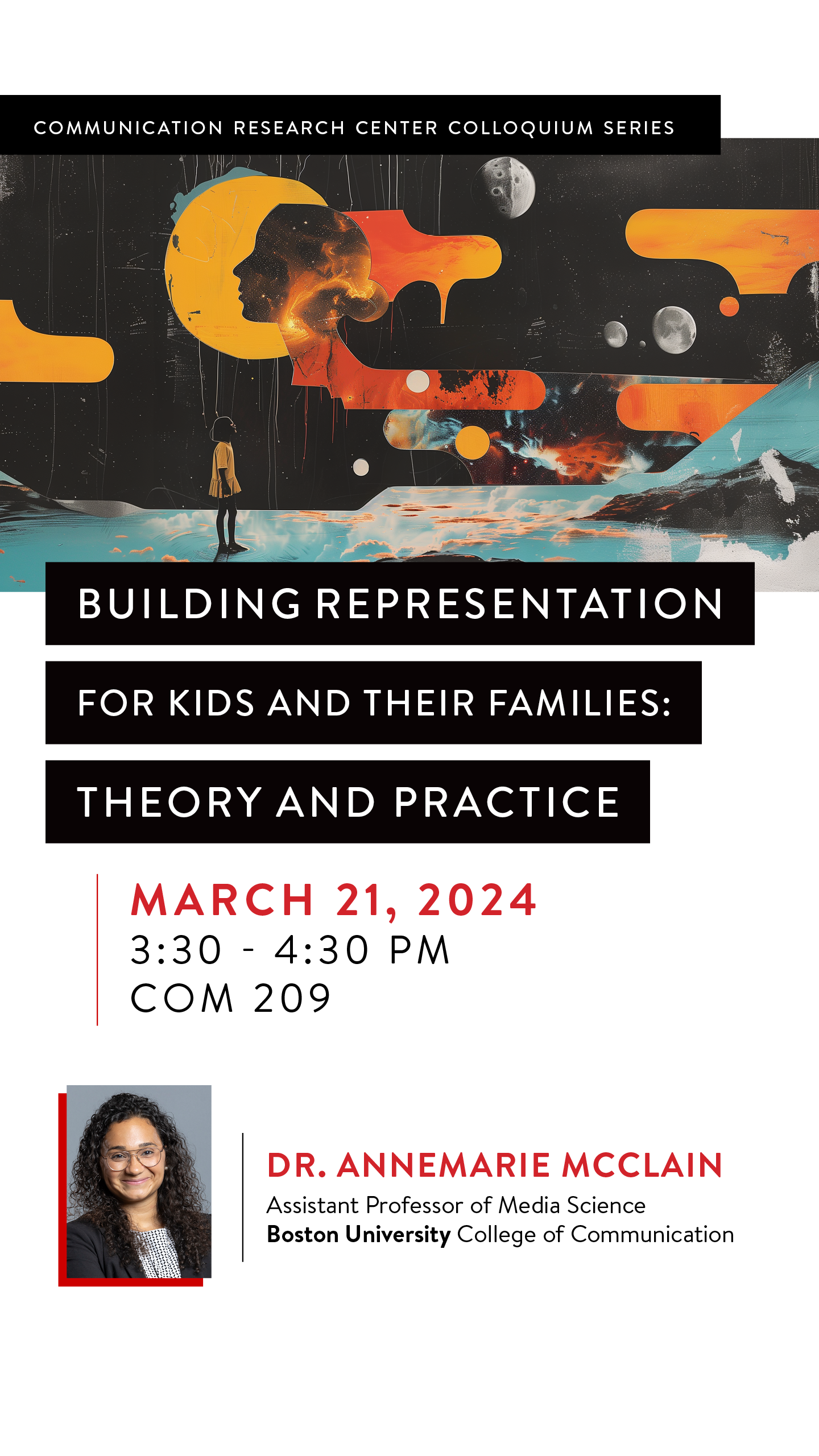
Building Representation for Kids and Their Families: Theory & Practice
Dr. AnneMarie McClain
Assistant Professor of Media Science
March 2024
DEI considerations are increasingly being placed front and center in the children’s media industry, and it seems like more and more people are understanding that representation matters. But how and why does it matter and to whom? And how do we figure out what kids and their families need, and then build content informed by those realities?
In this talk, we’ll explore recent and ongoing research that applies, tests, and works towards building theories and establishing more groundwork for informing our understanding of representation needs for marginalized children and their communities, as well as what educational consulting in this domain can look like.
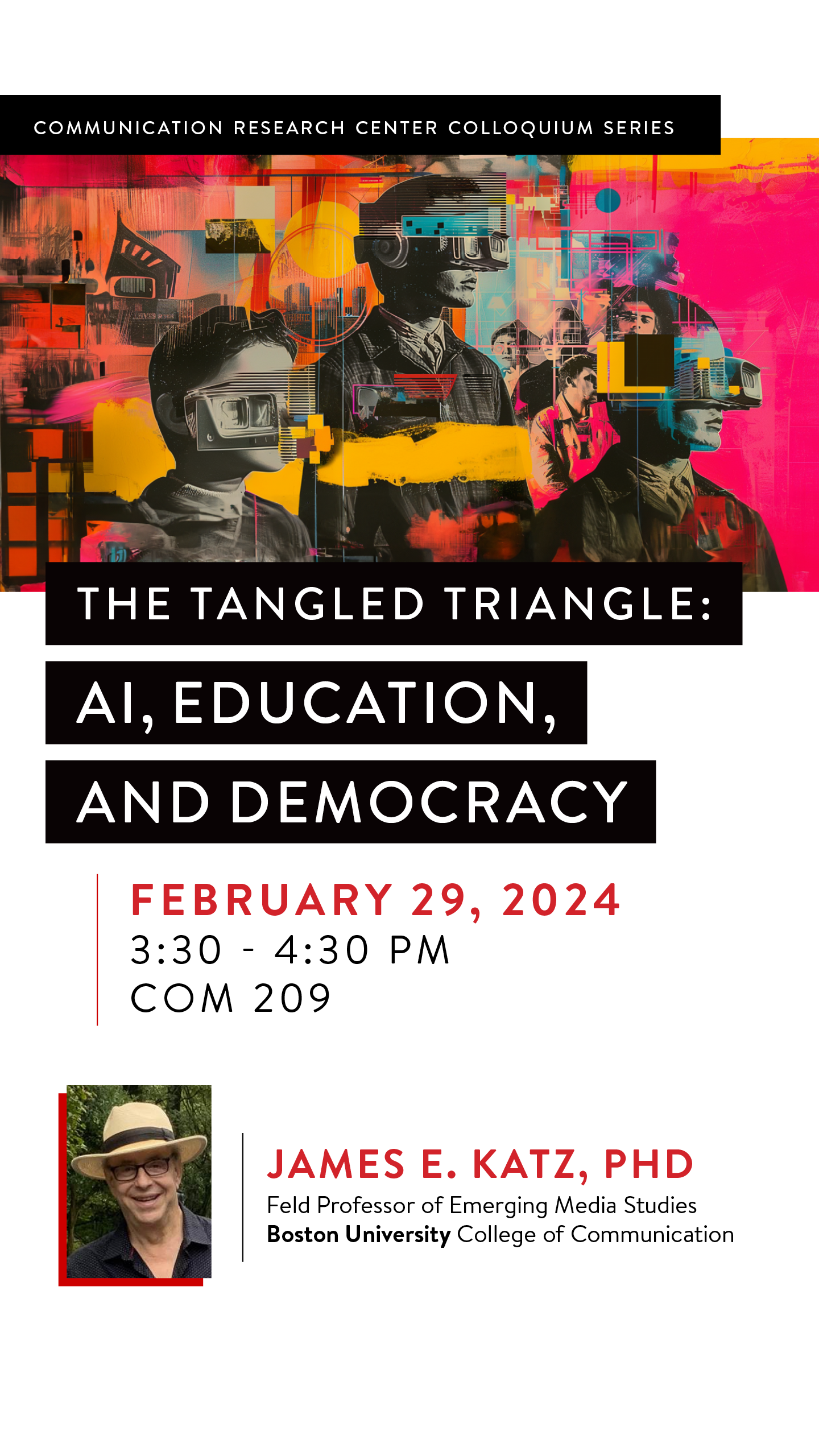
The Tangled Triangle: AI, Education, and Democracy
Dr. James E. Katz
Felt Professor of Emerging Media Studies
February 2024
Artificial intelligence (AI) is reshaping education at all levels, transforming everything from personalized learning to automated grading. While these advancements hold immense promise, they also raise critical questions about their potential consequences for the very foundation of democracy.
This talk delves into the complex interplay between AI, education, and democracy, examining both the optimistic possibilities for enhanced learning and potential pitfalls that could undermine democratic values. We’ll explore how AI, while well-intentioned in many cases, can have unforeseen consequences for social cohesion, individual autonomy, and ultimately, democratic participation.
By critically analyzing these emerging trends, we can plot a path forward that leverages the power of AI responsibly, ensuring that education empowers individuals and strengthens democratic societies.
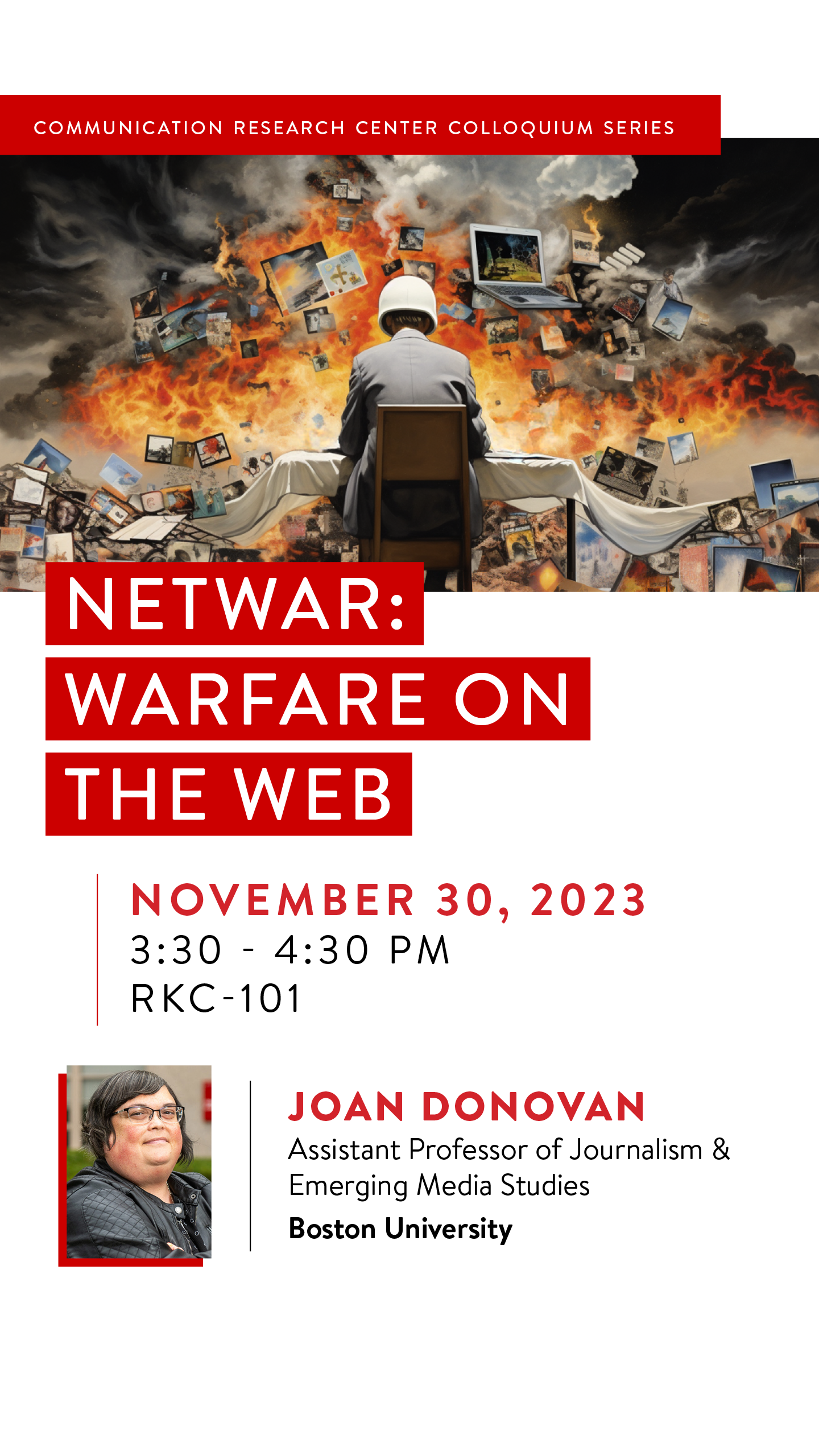
Netwar: Warfare on the Web
Dr. Joan Donovan
Assistant Professor, Journalism & Emerging Media Studies
November 2023
When you think of war, what does your mind conjure? Would you think of whispers and shadows? Of unseen foes, faces lit by the dim glow of a computer monitor? Forces that seek to disrupt and disturb societies by utilizing the complex infrastructure we inhabit daily?
While the term ‘netwar’ is rarely encountered, it’s something we have all experienced or witnessed. Whether it’s a distant relative on Facebook spreading news from a disreputable source to the violent dissidents of the January 6th riot, organized and mobilized via the internet, netwar is ubiquitous. From cyber warfare tactics that disrupt critical infrastructure to information warfare campaigns designed to shape public opinion, the evolving landscape of net war challenges traditional notions of conflict.
This lecture will expose and elucidate the notion of netwar and how we can better prepare ourselves in this interconnected landscape.
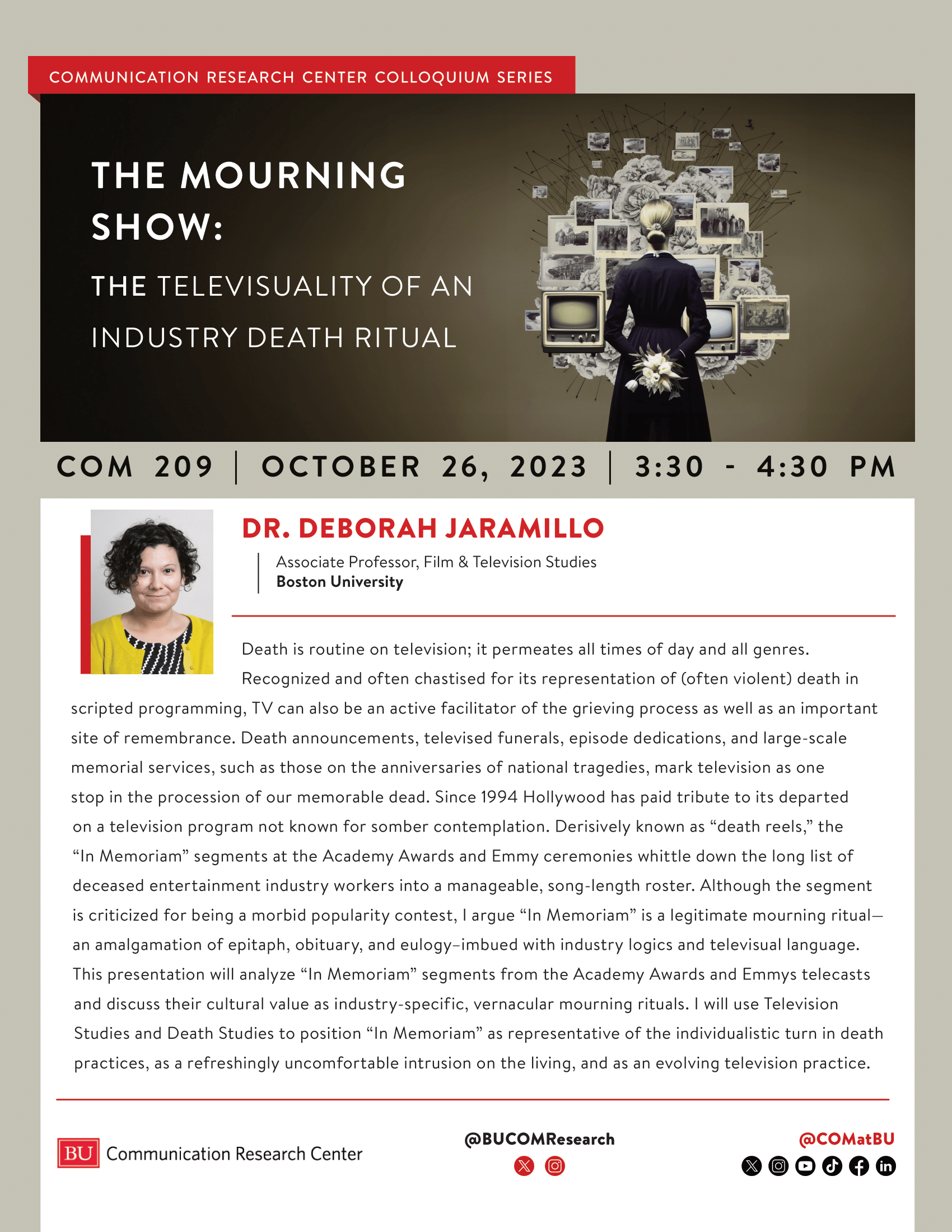
The Mourning Show: The Televisuality Of An Industry Death Ritual
Dr. Deborah Jaramillo
Associate Professor, Film & Television Studies
October 2023
Death is routine on television; it permeates all times of day and all genres. Recognized and often chastised for its representation of (often violent) death in scripted programming, TV can also be an active facilitator of the grieving process as well as an important site of remembrance. Death announcements, televised funerals, episode dedications, and large-scale memorial services, such as those on the anniversaries of national tragedies, mark television as one stop in the procession of our memorable dead. Since 1994 Hollywood has paid tribute to its departed on a television program not known for somber contemplation. Derisively known as “death reels,” the “In Memoriam” segments at the Academy Awards and Emmy ceremonies whittle down the long list of deceased entertainment industry workers into a manageable, song-length roster. Although the segment is criticized for being a morbid popularity contest, I argue “In Memoriam” is a legitimate mourning ritual—an amalgamation of epitaph, obituary, and eulogy–imbued with industry logics and televisual language. This presentation will analyze “In Memoriam” segments from the Academy Awards and Emmys telecasts and discuss their cultural value as industry-specific, vernacular mourning rituals. I will use Television Studies and Death Studies to position “In Memoriam” as representative of the individualistic turn in death practices, as a refreshingly uncomfortable intrusion on the living, and as an evolving television practice.
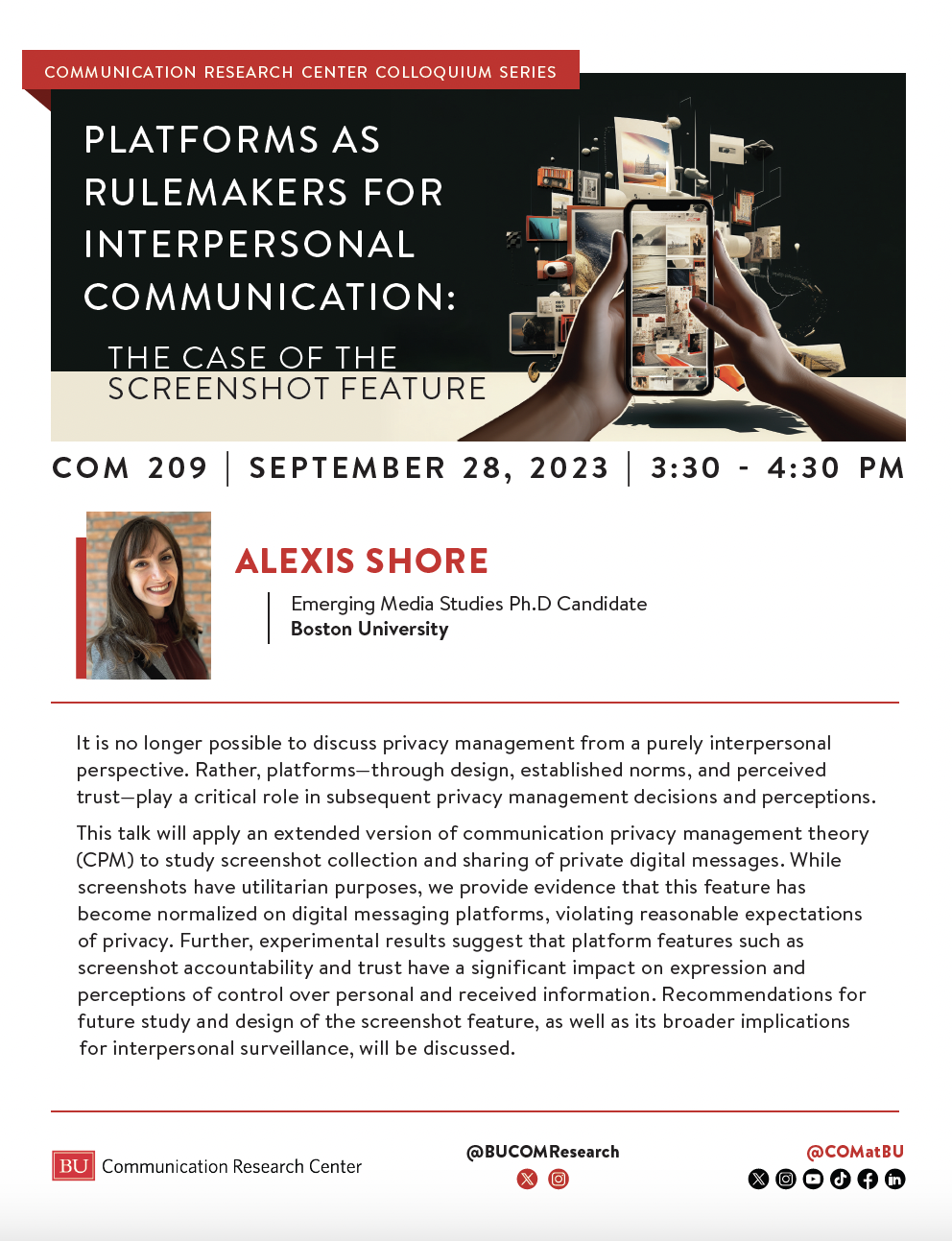
Platforms as Rulemakers for Interpersonal Communication: The Case of The Screenshot Feature
Alexis Shore
Emerging Media Studies, Ph.D Candidate
September 2023
It is no longer possible to discuss privacy management from a purely interpersonal perspective. Rather, platforms—through design, established norms, and perceived trust—play a critical role in subsequent privacy management decisions and perceptions.
This talk will apply an extended version of communication privacy management theory (CPM) to study screenshot collection and sharing of private digital messages. While screenshots have utilitarian purposes, we provide evidence that this feature has become normalized on digital messaging platforms, violating reasonable expectations of privacy. Further, experimental results suggest that platform features such as screenshot accountability and trust have a significant impact on expression and perceptions of control over personal and received information. Recommendations for future study and design of the screenshot feature, as well as its broader implications for interpersonal surveillance, will be discussed.
2022 - 2023 Lectures
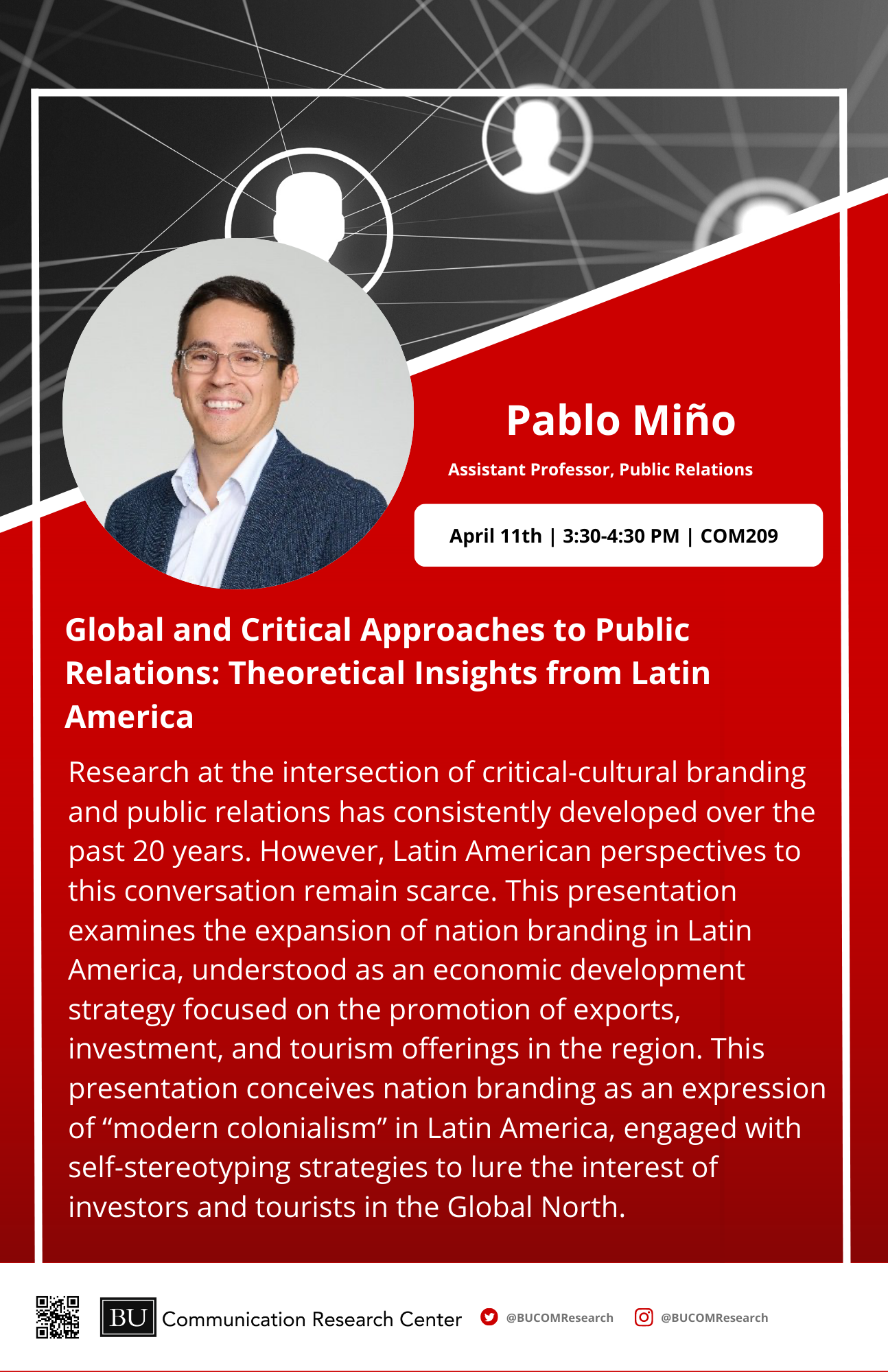
Global and Critical approaches to Public Relations: Theoretical Insights from Latin America
Dr. Pablo Miño
Assistant Professor, Public Relations
April 2023
Research at the intersection of critical-cultural branding and public relations has consistently developed over the past 20 years. However, Latin American perspectives to this conversation remain scarce. This presentation examines the expantion of nation branding in Latin America, understood as an economic development strategy focused on the promotion of exports, investment, and tourism offerings in the region. This presentation conceives nation branding as an expression of “modern colonialism” in Latin America, engaged with self-stereotyping strategies to lure the interest of investors and tourists in the Global North.
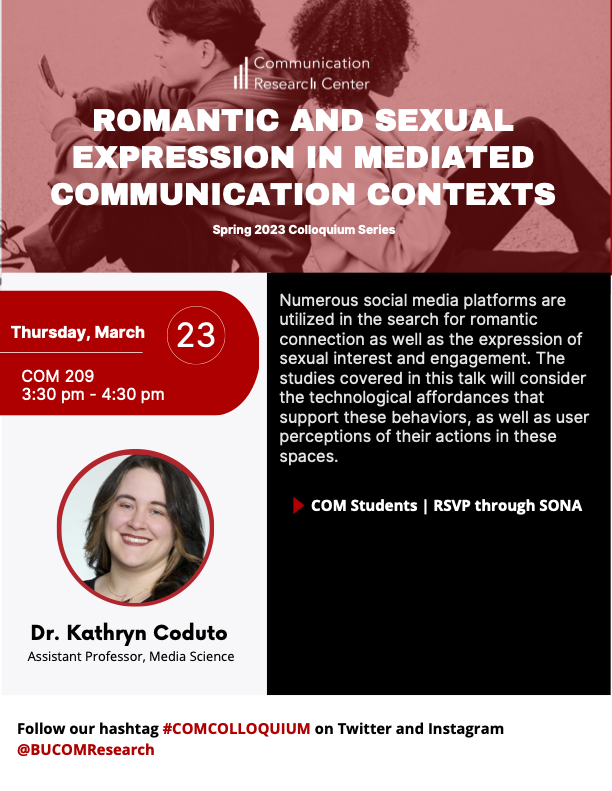
Romantic and Sexual Expression in Mediated Communication Contexts
Dr. Kathryn Coduto
Assistant Professor, Media Science
March 2023
Numerous social media platforms are utilized in the search for romantic conneciton as well as the expression of sexual interest and engagement. The studies covered in this talk witll consider the technological affordances that support these behaviors, as well as user perceptions of their actions in these spaces.
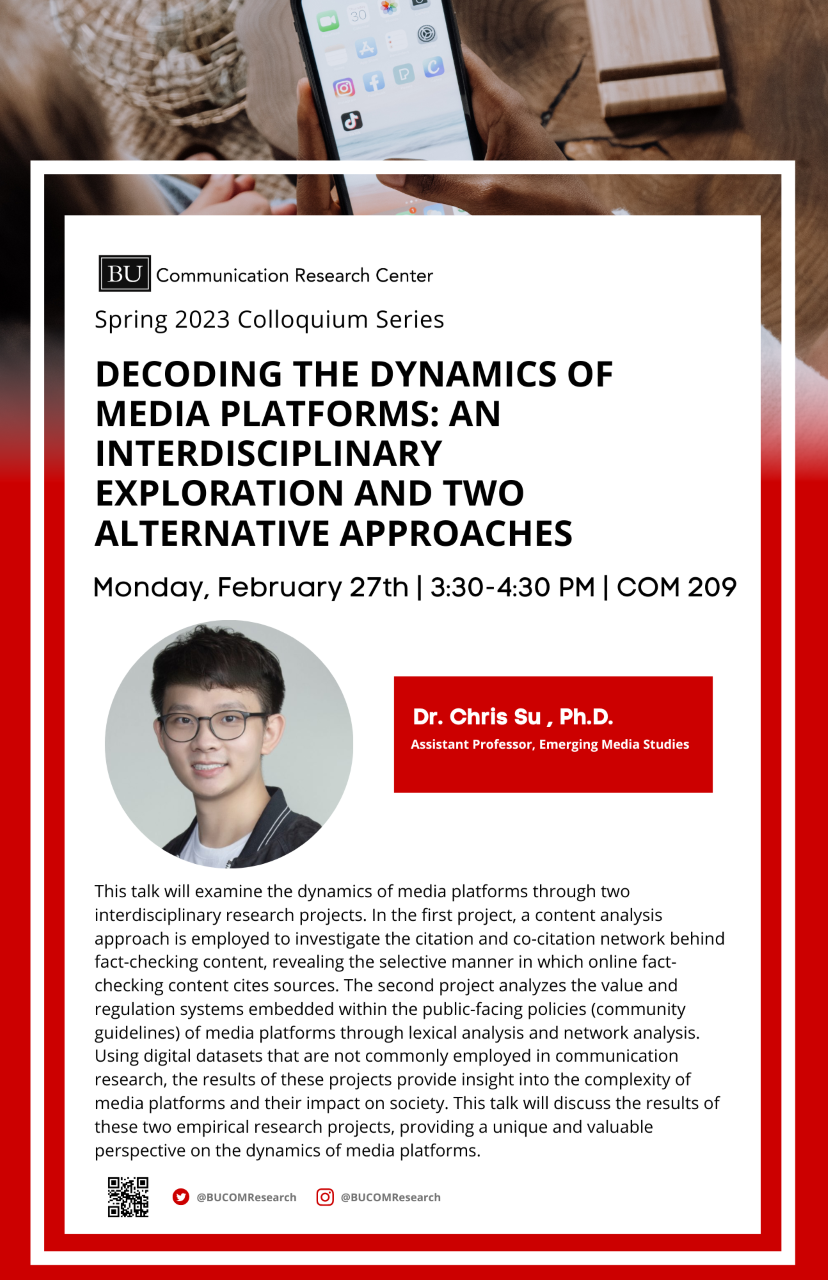
Decoding the Dynamics of Media Platforms: An Interdisciplinary Explanation and Two Alternative Approaches
Dr. Chris Chao Su
Assistant Professor, Emerging Media Studies
February 2023
This talk will examine the dynamics of media platforms through two interdisciplinary research projects. In the first project, a content analysis approach is employed to investigate the citation and co-citation network behind fact-checking content, revealing the selective manner in which online fact-checking content cites sources. The second project analyzes the value and regulation systems embedded within the public-facing policies (community guidelines) of media platforms through lexical analysis and network analysis. Using digital datasets that are not commonly employed in communication research, the results of these projects provide insight into the complexity of media platforms and their impact on society. This talk will discuss the results of these two empirical research projects, providing a unique and valuable perspective on the dynamics of media platforms.
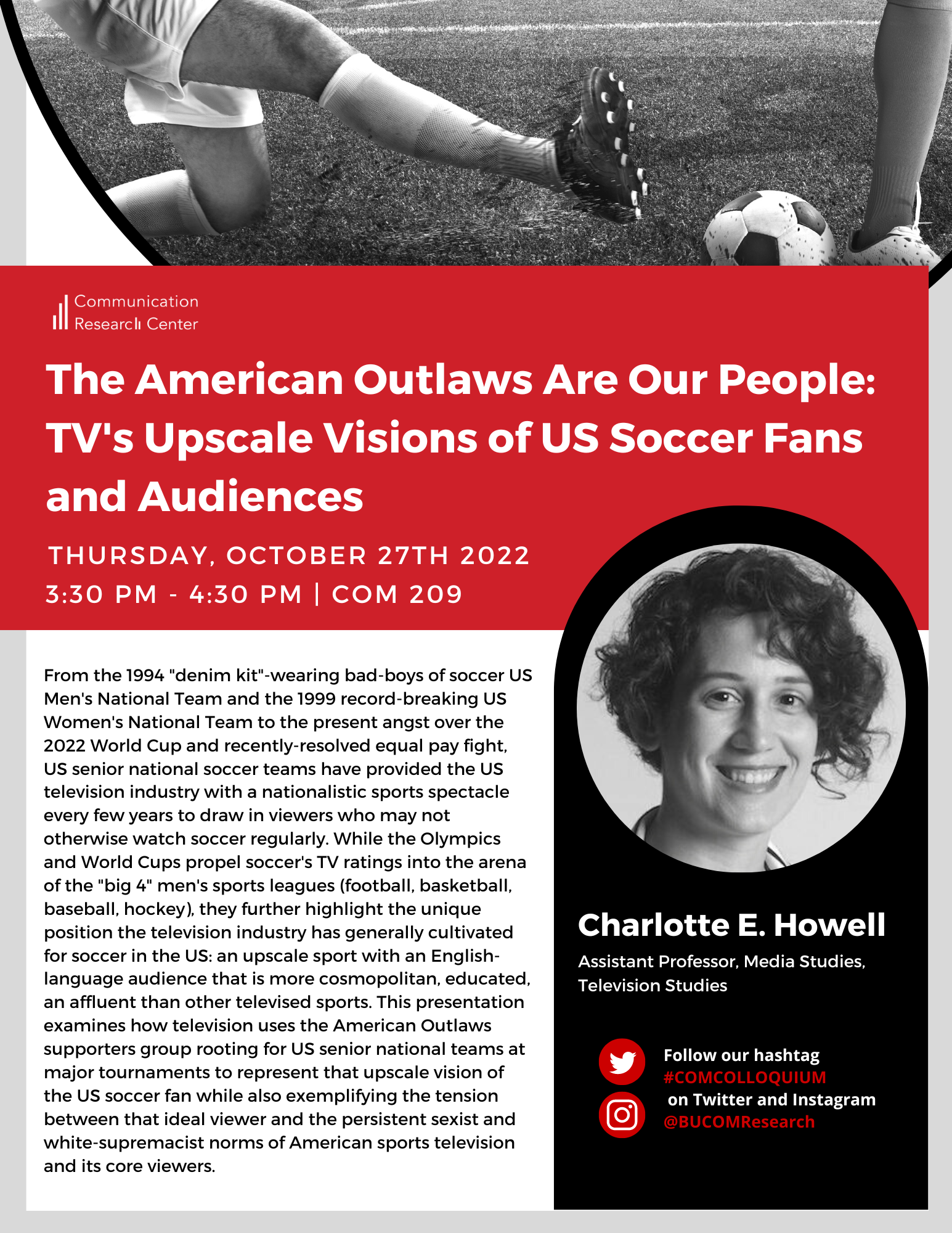
The American Outlaws Are Our People”: TV’s Upscale Visions of US Soccer Fans and Audiences
Dr. Charlotte E. Howell
Assistant Professor, Media Studies, Television Studies
October 2022
From the 1994 “denim kit”-wearing bad-boys of soccer US Men’s National Team and the 1999 record-breaking US Women’s National Team to the present angst over the 2022 World Cup and recently-resolved equal pay fight, US senior national soccer teams have provided the US television industry with a nationalistic sports spectacle every few years to draw in viewers who may not otherwise watch soccer regularly. While the Olympics and World Cups propel soccer’s TV ratings into the arena of the “big 4” men’s sports leagues (football, basketball, baseball, hockey), they further highlight the unique position the television industry has generally cultivated for soccer in the US: an upscale sport with an English-language audience that is more cosmopolitan, educated, an affluent than other televised sports. This presentation examines how television uses the American Outlaws supporters group rooting for US senior national teams at major tournaments to represent that upscale vision of the US soccer fan while also exemplifying the tension between that ideal viewer and the persistent sexist and white-supremacist norms of American sports television and its core viewers.

Transmasculinity on Television
Dr. Patrice Oppliger
Assistant Professor, Communication
September 2022
It has been long accepted that media representations have a direct effect on viewers’ perceptions of the world and society. As more transgender characters are included in television series, it is essential to assess the quality, accuracy, and sensitivity of the portrayals. Dr. Patrice Oppliger will discuss her book Transmasculinity on Television (Routledge 2022), which takes a closer look at 44 transmasculine and nonbinary characters on broadcast, cable, and streaming services between 2000 and 2021. She notes that significant changes have occurred since the release of the 1999 film Boys Don’t Cry, primarily the increase in transgender producers, writers, and actors playing those roles.
2021 - 2022 Lectures
Propagandizing Global Crisis: How China State Media Portray the International PandemicDr. King-wa Fu
Professor at the Journalism & Media Studies Centre, The University of Hong Kong
May 2022How does authoritarian propaganda tell the people about global crisis? This study identifies a political communication strategy, namely “propagandization of relative gratification,” through which 1) state media highlight a global chaos to prompt the people’s downward comparison to a relatively stable domestic situation; 2) the nation’s adversaries are portrayed worse than one’s allies; 3) it leverages popular nationalistic sentiment. This study examines empirically how China state media covered the COVID-19 pandemic of 45 countries by analyzing over 3 million Chinese social media posts using word embedding’s semantic similarity and instrumental variable approach. The result reveals the distant relationship with China a country has, the more severe its COVID-19 representation in China propaganda, while controlling for the country’s epidemiolocal severity and the Chinese general public’s view. Centrally-controlled state media reported in more devastating than did the provincial-level state media. Study implication will be discussed in the talk. 
 Capturing Social Presence: Empirical Insights for Theory Development and Industry Investment in “Being With” MediaDr. Jim Cummings
Capturing Social Presence: Empirical Insights for Theory Development and Industry Investment in “Being With” MediaDr. Jim Cummings
Assistant Professor of Emerging Media Studies
April 2022Recent accounts of the impending metaverse anticipate the application of and reliance on a variety of communication technologies for a range of mediated interpersonal scenarios, spanning formal workplace exchanges, commercial services, and casual hangouts. As such, “social presence” is becoming a broad design goal for firms creating such technologies. To effectively design for this user experience, a rich conceptual understanding of social presence and the technological factors contributing to it will be critical. However, this is no easy task: in recent years, what exactly is meant by “social presence” has come to vary widely across different communication scenarios and corresponding empirical literatures. This talk will review recent research examining what exactly researchers are measuring when they study the concept. As will be discussed, the findings provide for a refined theoretical definition of “social presence” and, in turn, can better guide industry designers seeking to create specific types of social user experience. 
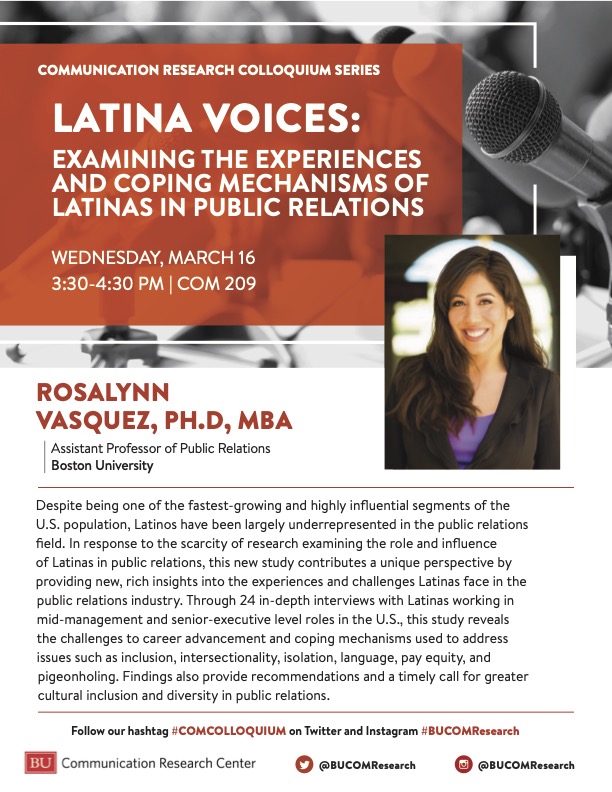 Latina Voices: Examining the Experiences and Coping Mechanisms of Latinas in Public RelationsDr. Rosalynn Vasquez, MBA
Latina Voices: Examining the Experiences and Coping Mechanisms of Latinas in Public RelationsDr. Rosalynn Vasquez, MBA
Assistant Professor of Public Relations
March 2022Despite being one of the fastest-growing and highly influential segments of the U.S. population, Latinos have been largely underrepresented in the public relations field. In response to the scarcity of research examining the role and influence of Latinas in public relations, this new study contributes a unique perspective by providing new, rich insights into the experiences and challenges Latinas face in the public relations industry. Through 24 in-depth interviews with Latinas working in mid-management and senior-executive level roles in the U.S., this study reveals the challenges to career advancement and coping mechanisms used to address issues such as inclusion, intersectionality, isolation, language, pay equity, and pigeonholing. Findings also provide recommendations and a timely call for greater cultural inclusion and diversity in public relations. 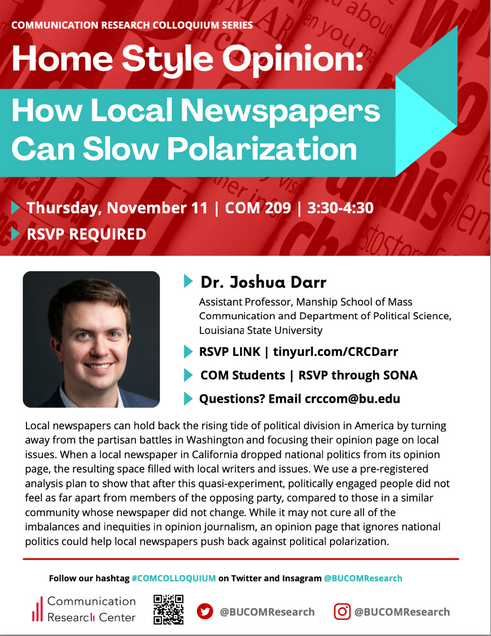 Home Style Opinion: How Local Newspapers Can Slow PolarizationDr. Joshua Darr
Home Style Opinion: How Local Newspapers Can Slow PolarizationDr. Joshua Darr
Assistant Professor, Manship School of Mass Communication and Department of Political Science, Louisiana State University
November 2021Local newspapers can hold back the rising tide of political division in America by turning away from the partisan battles in Washington and focusing their opinion page on local issues. When a local newspaper in California dropped national politics from its opinion page, the resulting space filled with local writers and issues. We use a pre-registered analysis plan to show that after this quasi-experiment, politically engaged people did not feel as far apart from members of the opposing party, compared to those in a similar community whose newspaper did not change. While it may not cure all of the imbalances and inequities in opinion journalism, an opinion page that ignores national politics could help local newspapers push back against political polarization. 
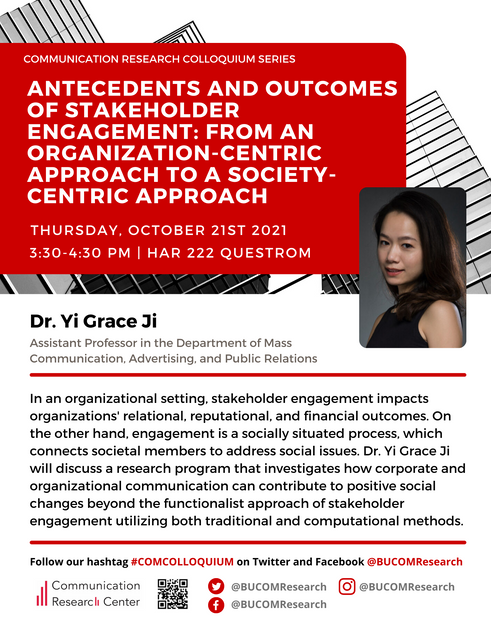 Antecedents and Outcomes of Stakeholder Engagement: From an Organization-Centric Approach to a Society-Centric ApproachDr. Yi Grace Ji
Antecedents and Outcomes of Stakeholder Engagement: From an Organization-Centric Approach to a Society-Centric ApproachDr. Yi Grace Ji
Assistant Professor, Department of Mass Communication, Advertising, and Public Relations
October 2021In an organizational setting, stakeholder engagement impacts organizations’ relational, reputational, and financial outcomes. On the other hand, engagement is a socially situated process, which connects societal members to address social issues. Dr. Yi Grace Ji will discuss a research program that investigates how corporate and organizational communication can contribute to positive social changes beyond the functionalist approach of stakeholder engagement utilizing both traditional and computational methods.

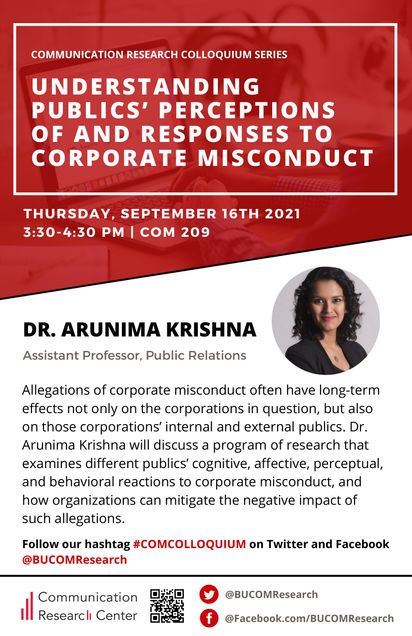 Understanding Publics’ Perceptions of and Responses to Corporate MisconductDr. Arunima Krishna
Understanding Publics’ Perceptions of and Responses to Corporate MisconductDr. Arunima Krishna
Assistant Professor, Public Relations
September 2021Allegations of corporate misconduct often have long-term effects
not only on the corporations in question, but also on those
corporations’ internal and external publics. Dr. Arunima Krishna
will discuss a program of research that examines different
publics’ cognitive, affective, perceptual, and behavioral reactions
to corporate misconduct, and how organizations can mitigate the
negative impact of such allegations.
2019 - 2020 Lectures
 |
Toward Robot Humanization: Exploring Relational Dynamics & Perceptions of Robots & Artificial IntelligenceKate Mays
|
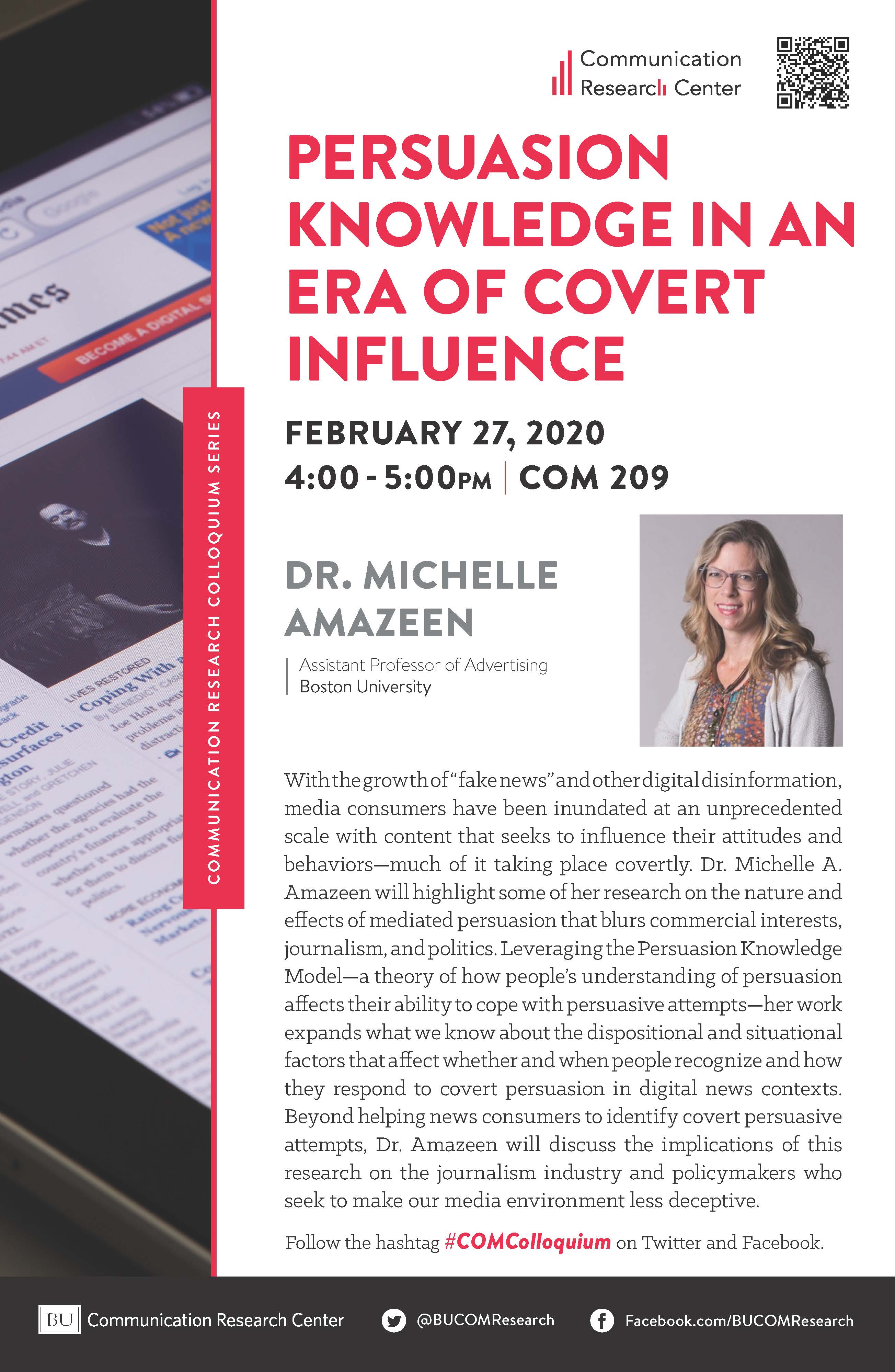 |
Persuasion Knowledge in an Era of Covert InfluenceDr. Michelle Amazeen
|
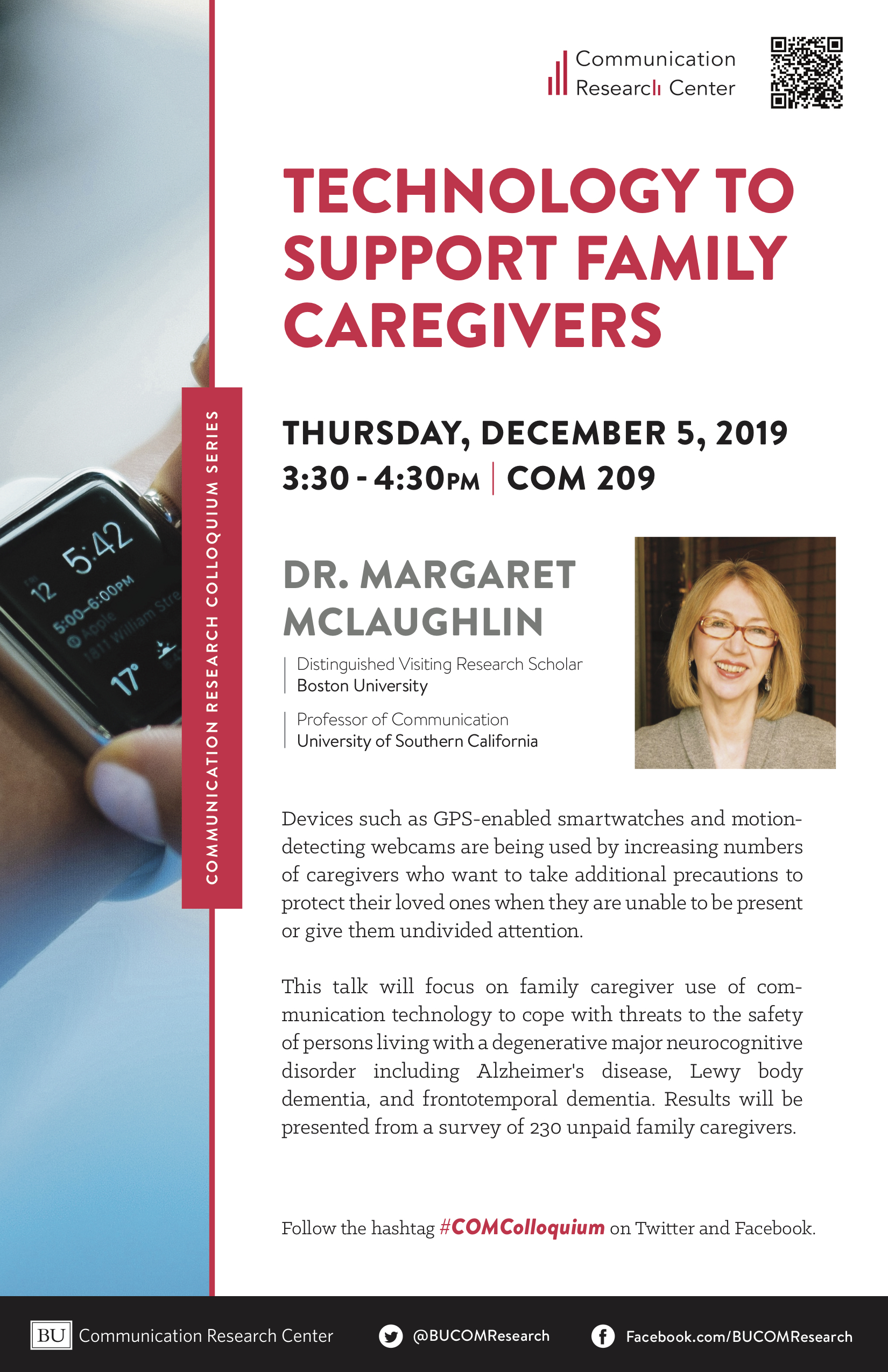 |
Technology to Support Family CaregiversDr. Margaret McLaughlin
|
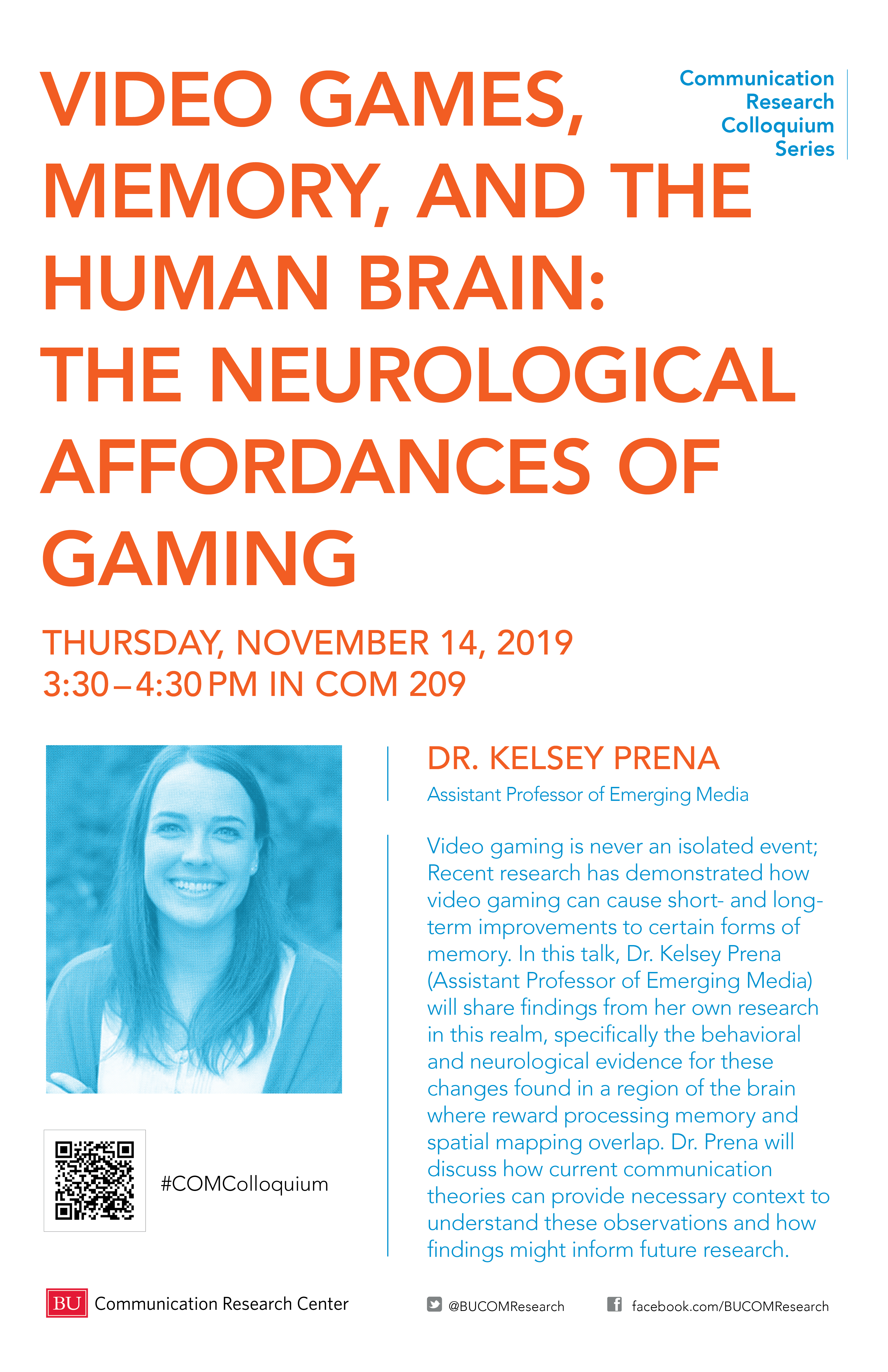 |
Video games, memory, and the human brain: The neurological affordances of gamingDr. Kelsey Prena
|
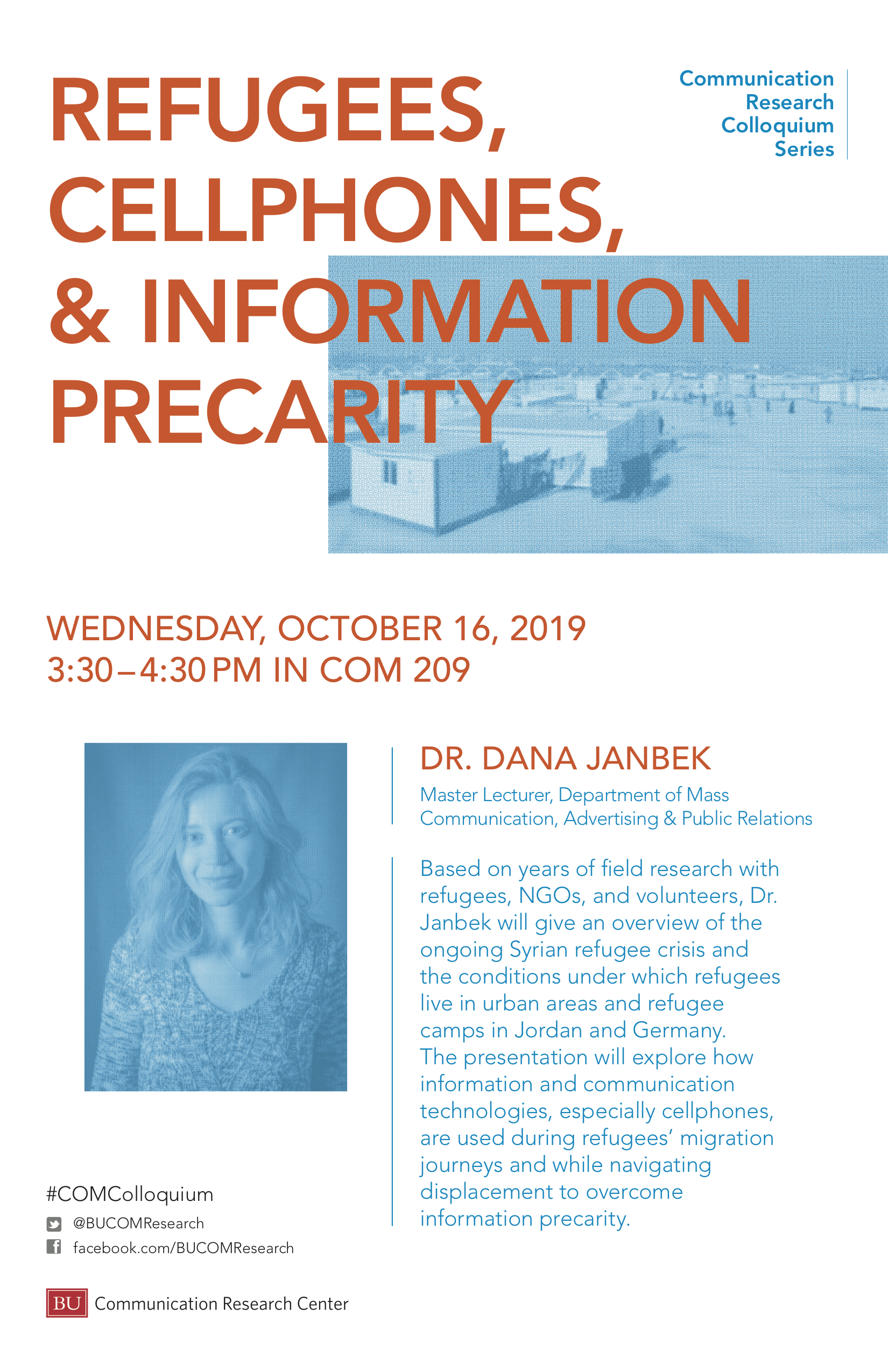 |
Refugees, Cellphones, and Information PrecarityDr. Dana Janbek
|
 |
Fear and Loathing (and Enthusiasm!): A National Study of Attitudes Towards Artificial IntelligenceDr. James E. Katz
|
2018 - 2019 Lectures
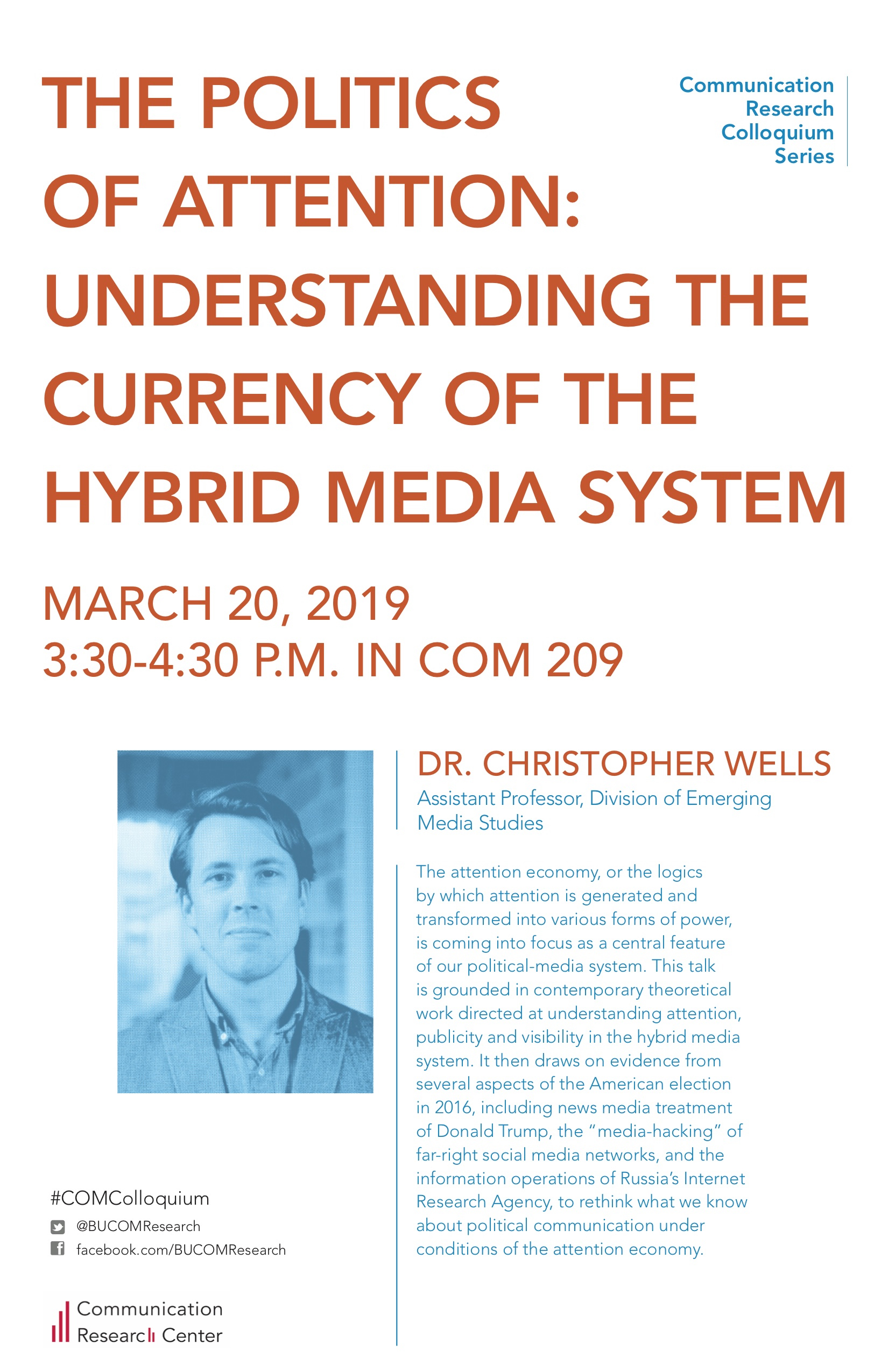 |
The Politics of Attention: Understanding the Currency of the Hybrid Media SystemDr. Christopher Wells
|
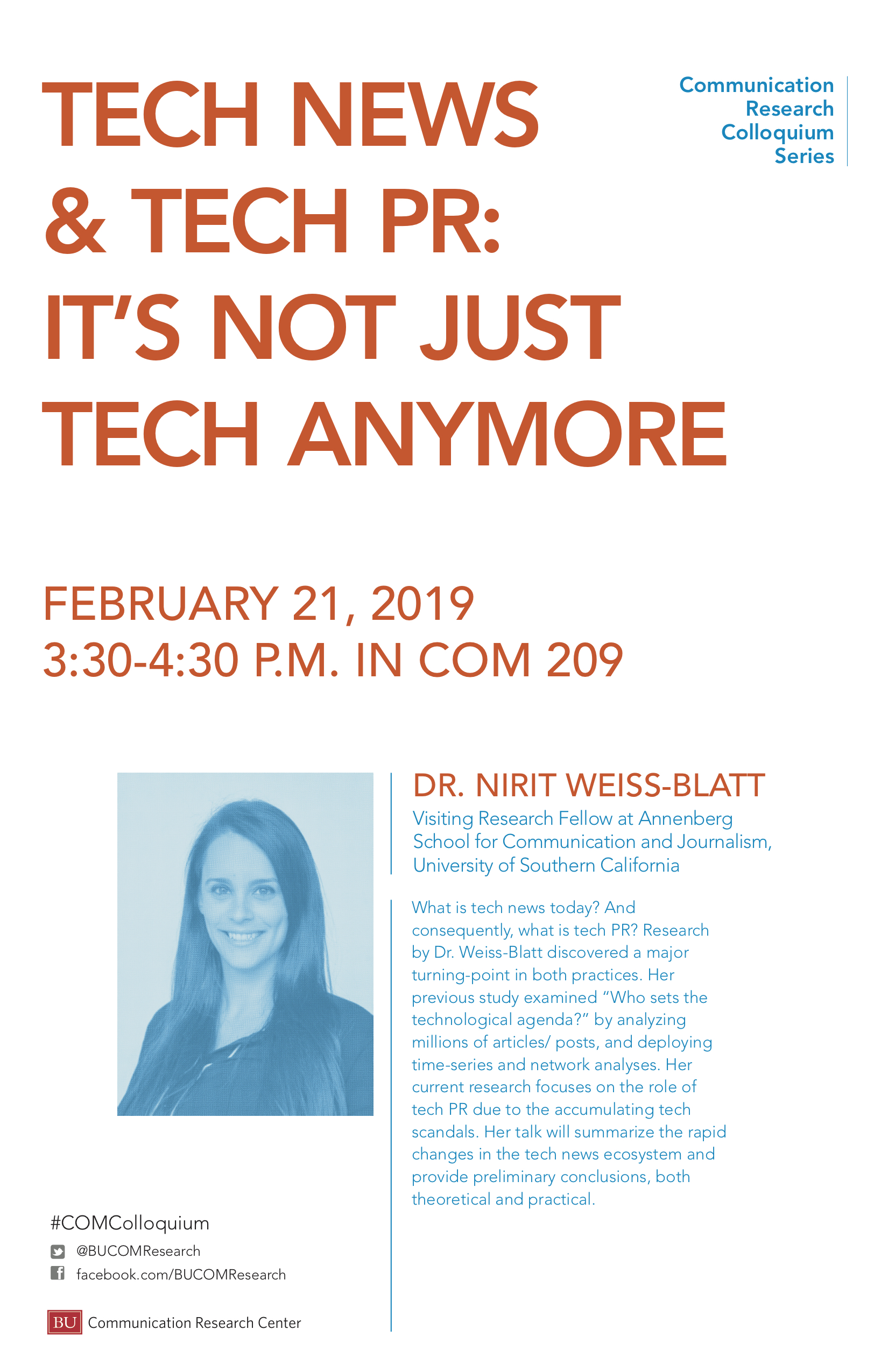 |
Tech News and Tech PR: It’s Not Just Tech AnymoreDr. Nirit Weiss-Blatt
|
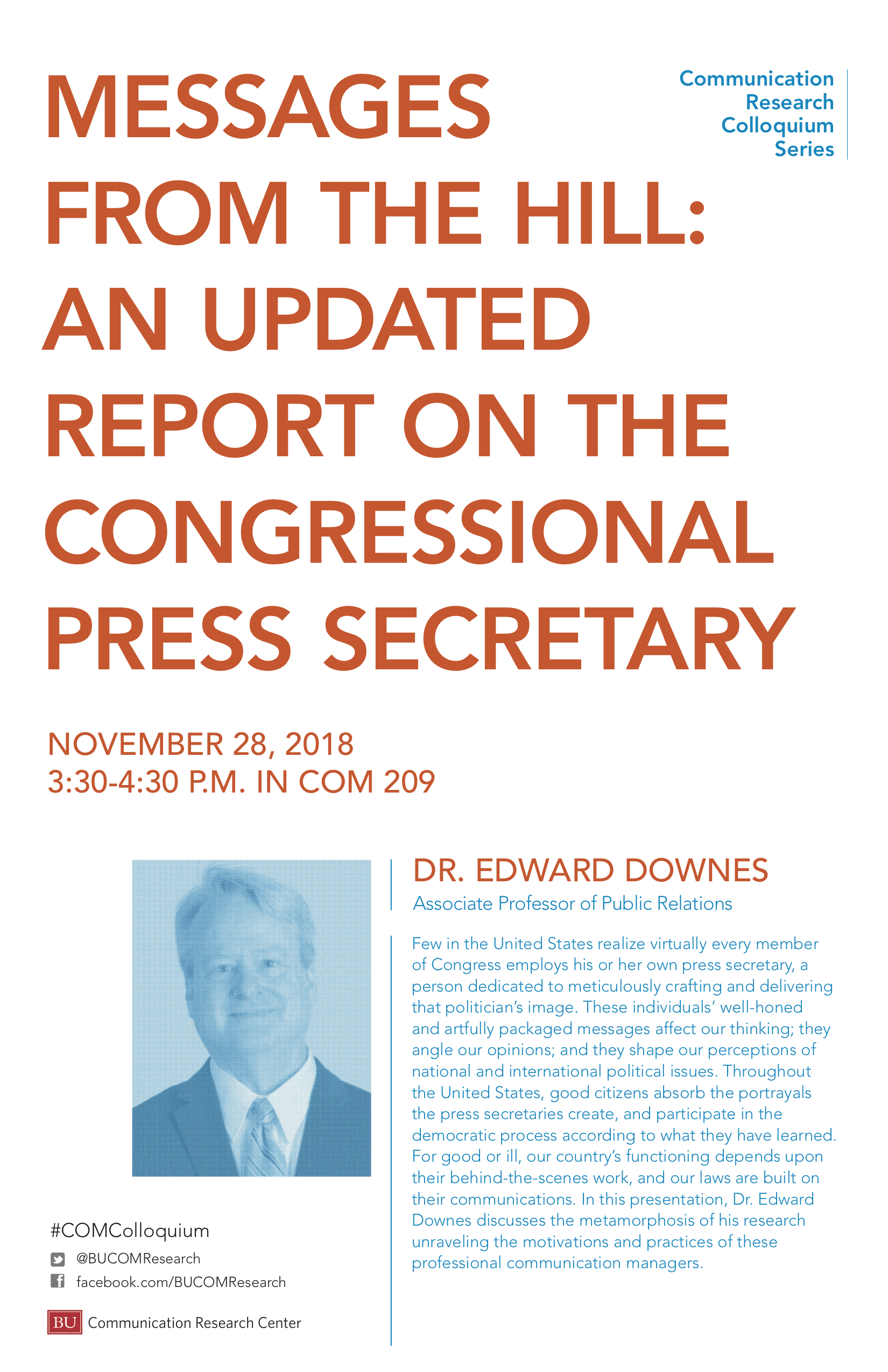 |
Messages from the Hill: An Updated Report on the Congressional Press SecretaryDr. Edward Downes
|
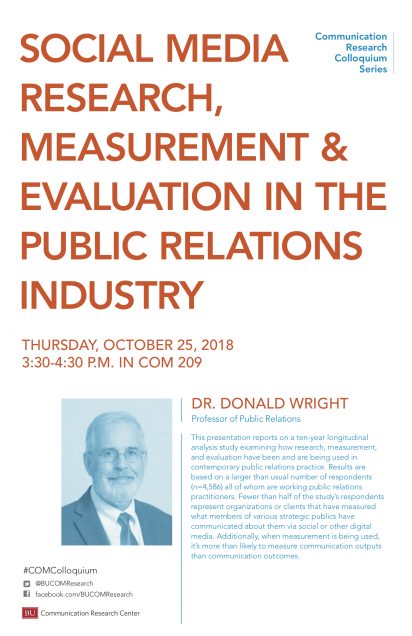 |
Social Media Research, Measurement, and Evaluation in the Public Relations IndustryDr. Donald Wright
|
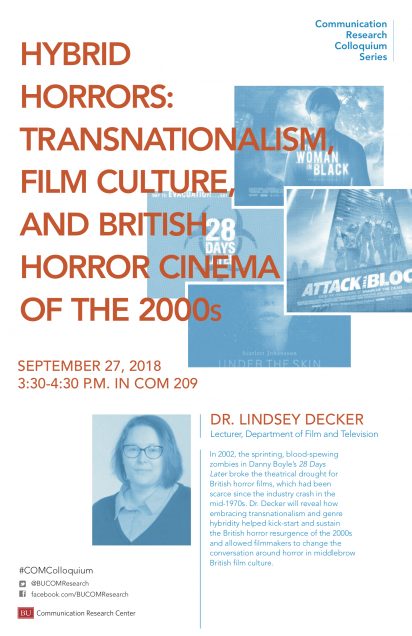 |
Dr. Lindsey Decker
|
2017 - 2018 Lectures
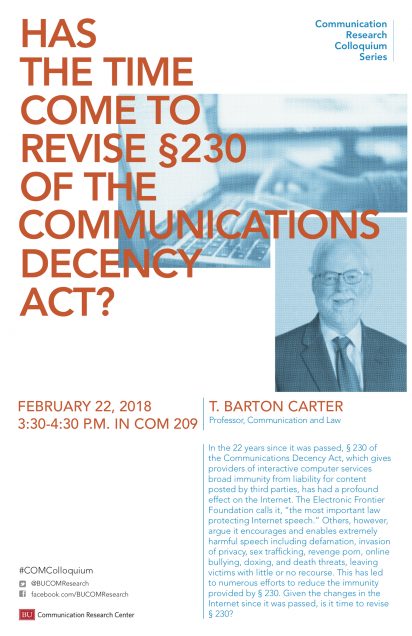 |
Has the Time Come to Revise §230 of the Communications Decency Act?Dr. T. Barton Carter
|
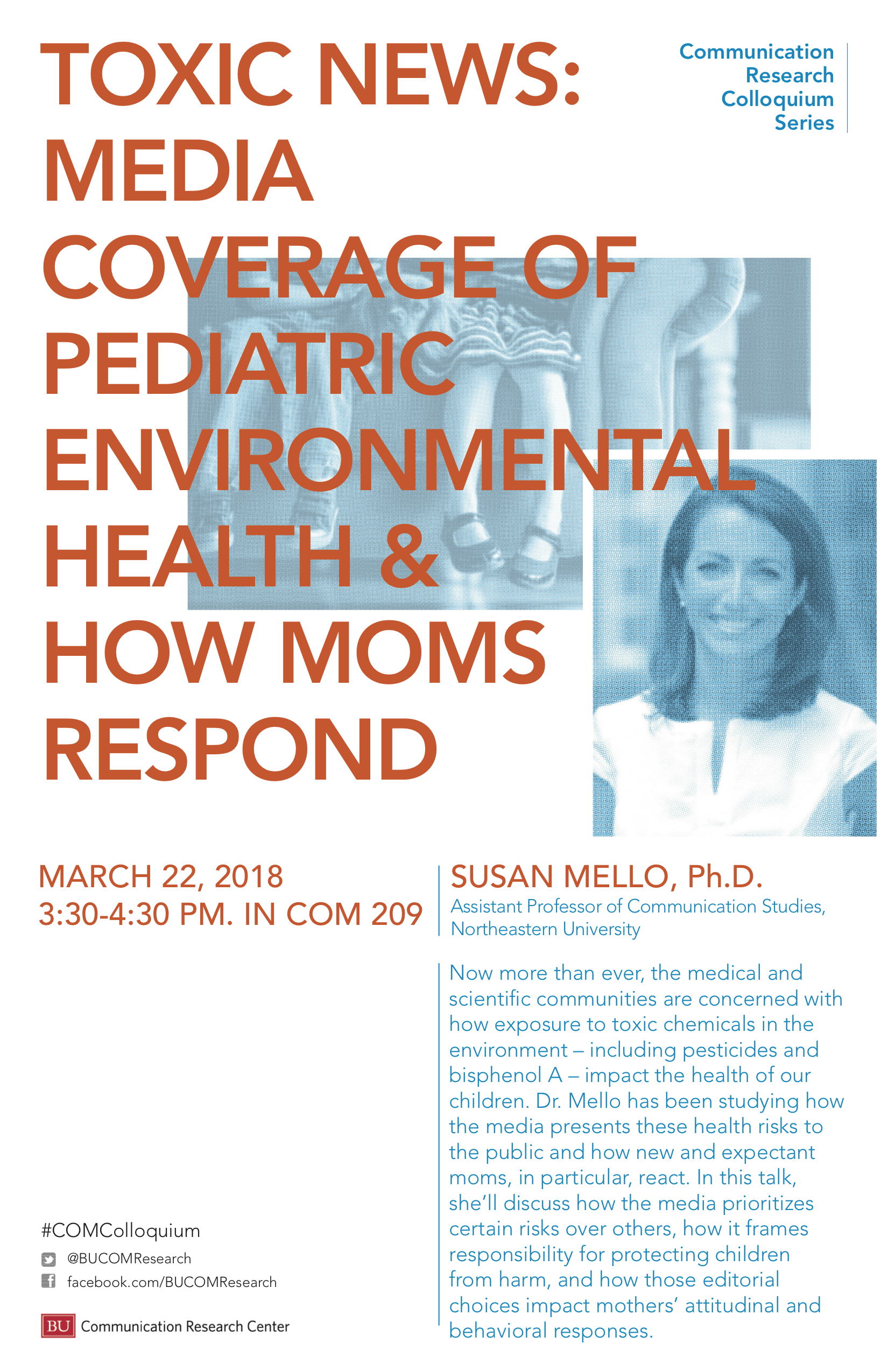 |
Toxic News: Media Coverage of Pediatric Environmental Health & How Moms RespondDr. Susan Mello
|
|
|
The Branding and Identity of the Nobel PrizeDr. Stephen Greyser, Professor Emeritus of Marketing/Communication at Harvard Business School
|
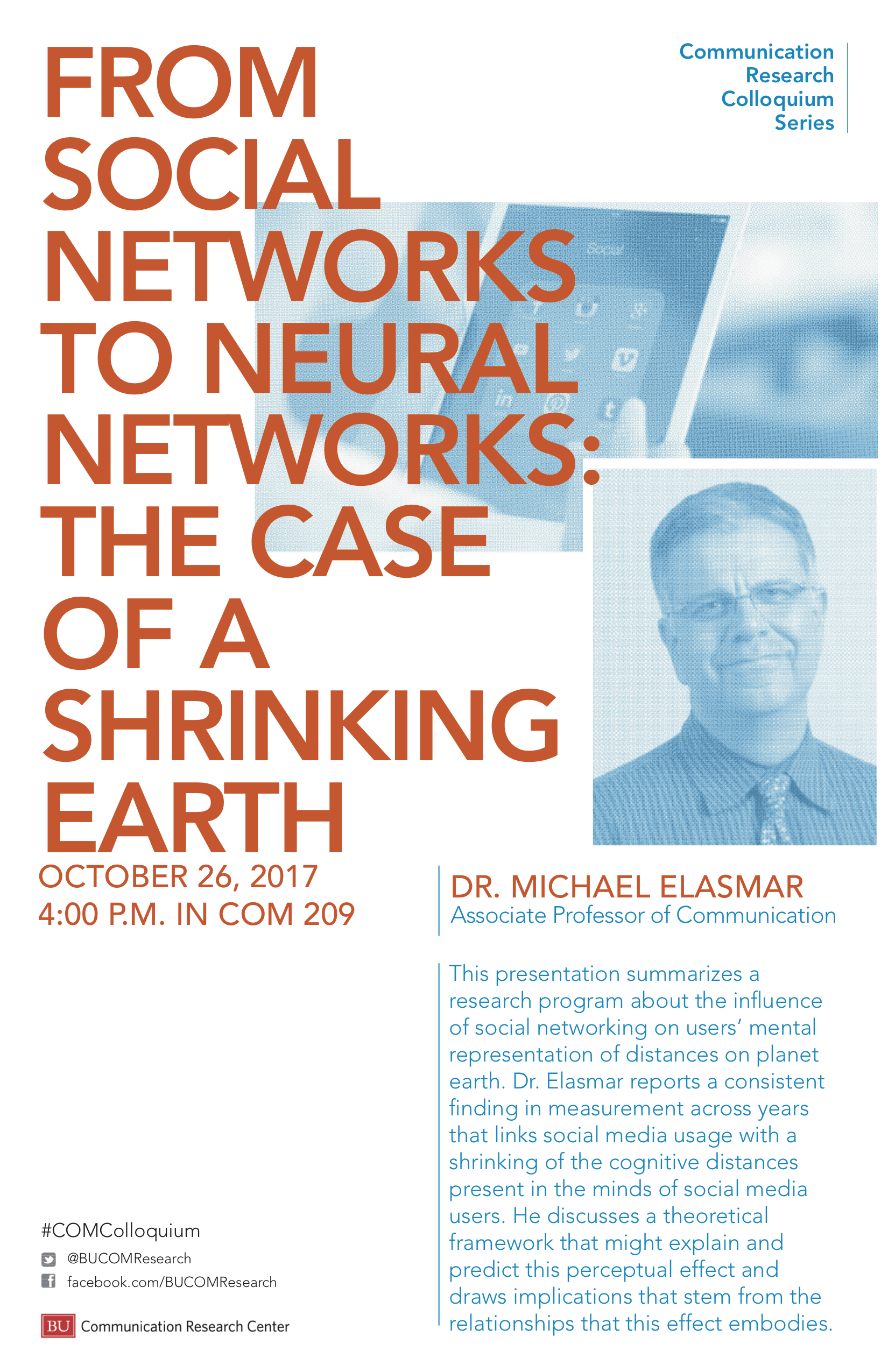 |
From Social Networks to Neural Networks: The Case of a Shrinking EarthDr. Michael Elasmar
|
 |
Social Media Use in Public Relations: The Good, The Bad, and The UglyDr. Donald K. Wright
|
2016 - 2017 Lectures
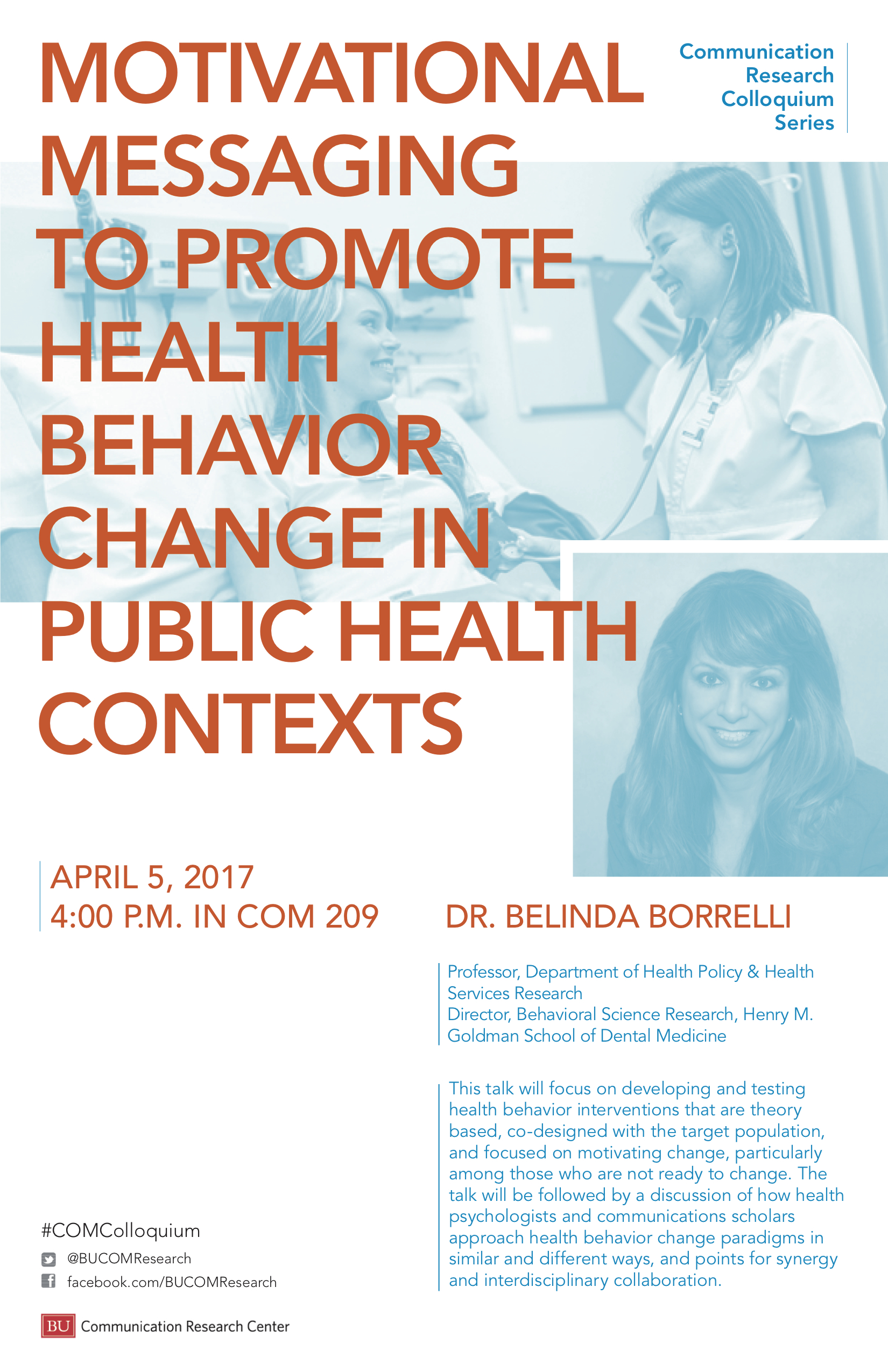 |
Motivational Messaging to Promote Health Behavior Change in Public Health ContextsDr. Belinda Borrelli
|
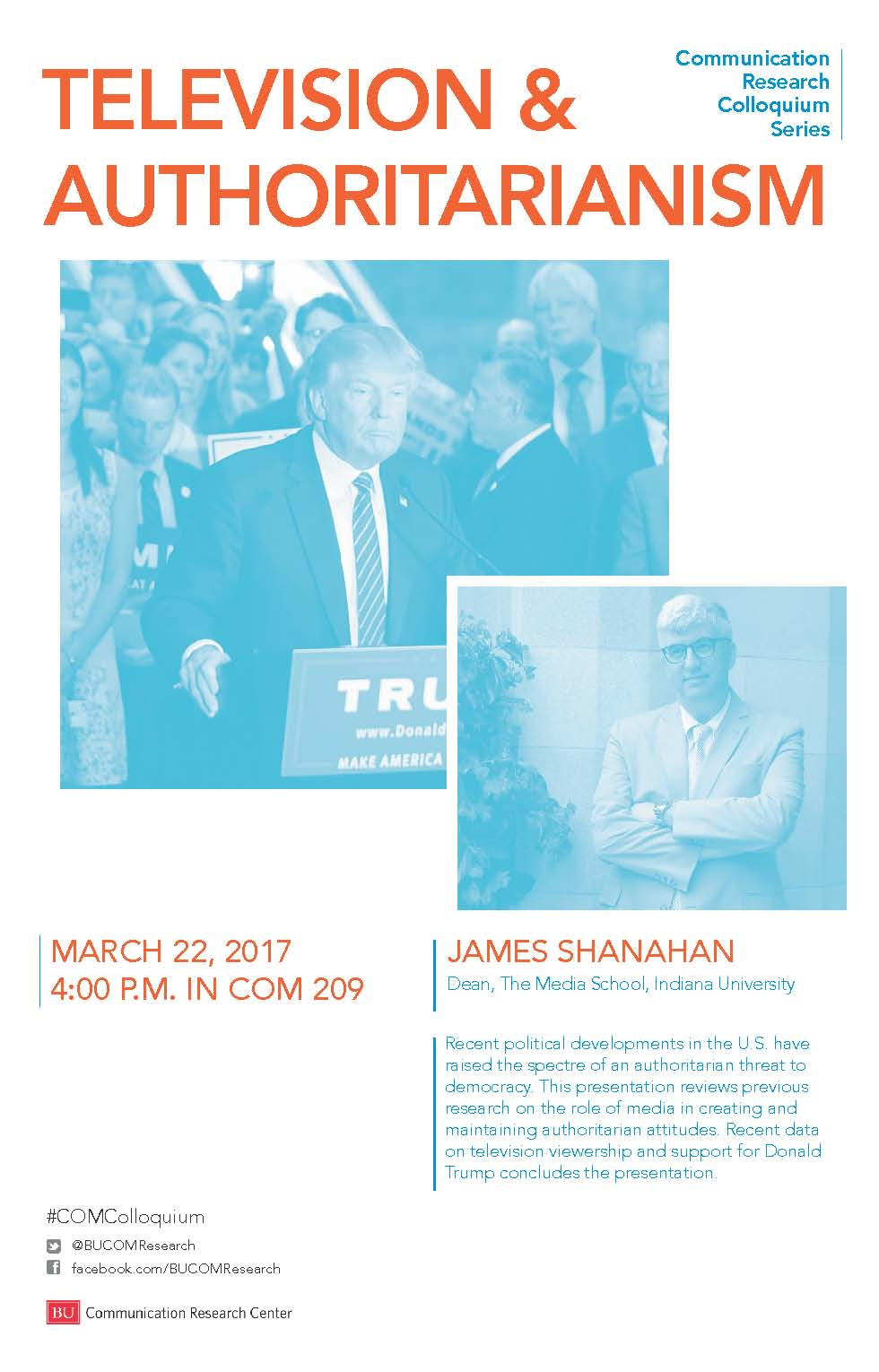 |
Television & AuthoritarianismJames Shanahan
|
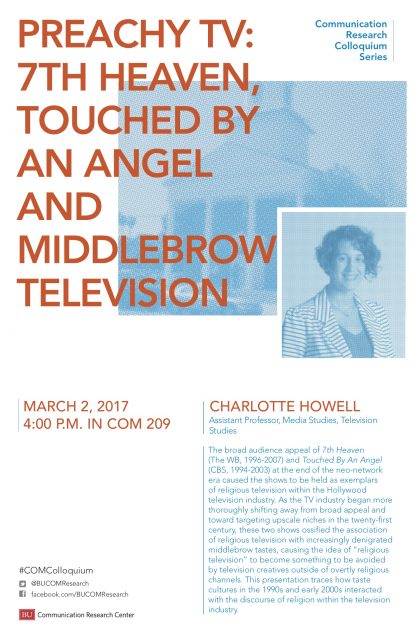 |
Preachy TV: 7th Heaven, Touched by an Angel, and Middlebrow TelevisionDr. Charlotte Howell
|
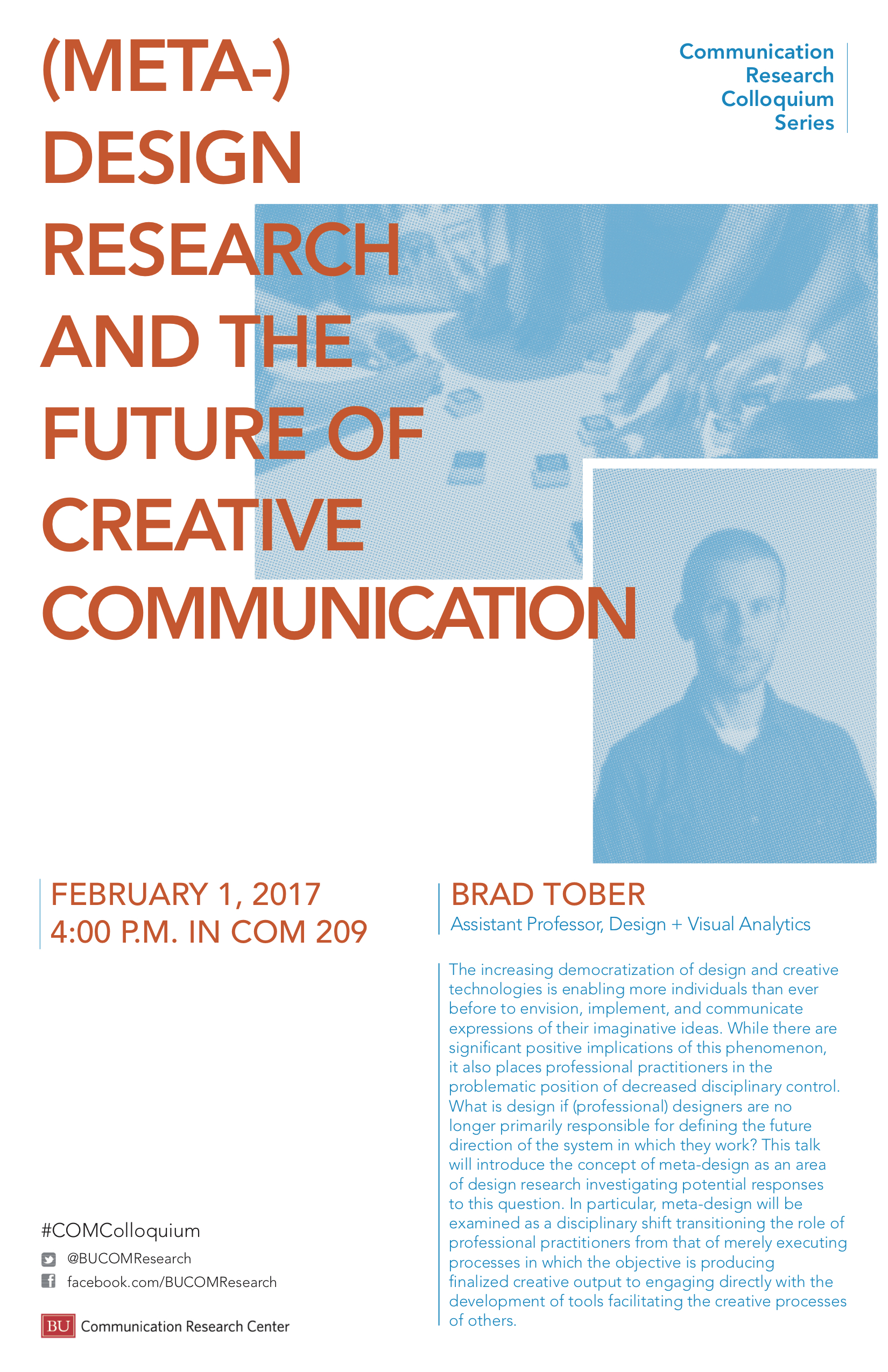 |
(Meta-)Design Research and the Future of Creative CommunicationBrad Tober
|
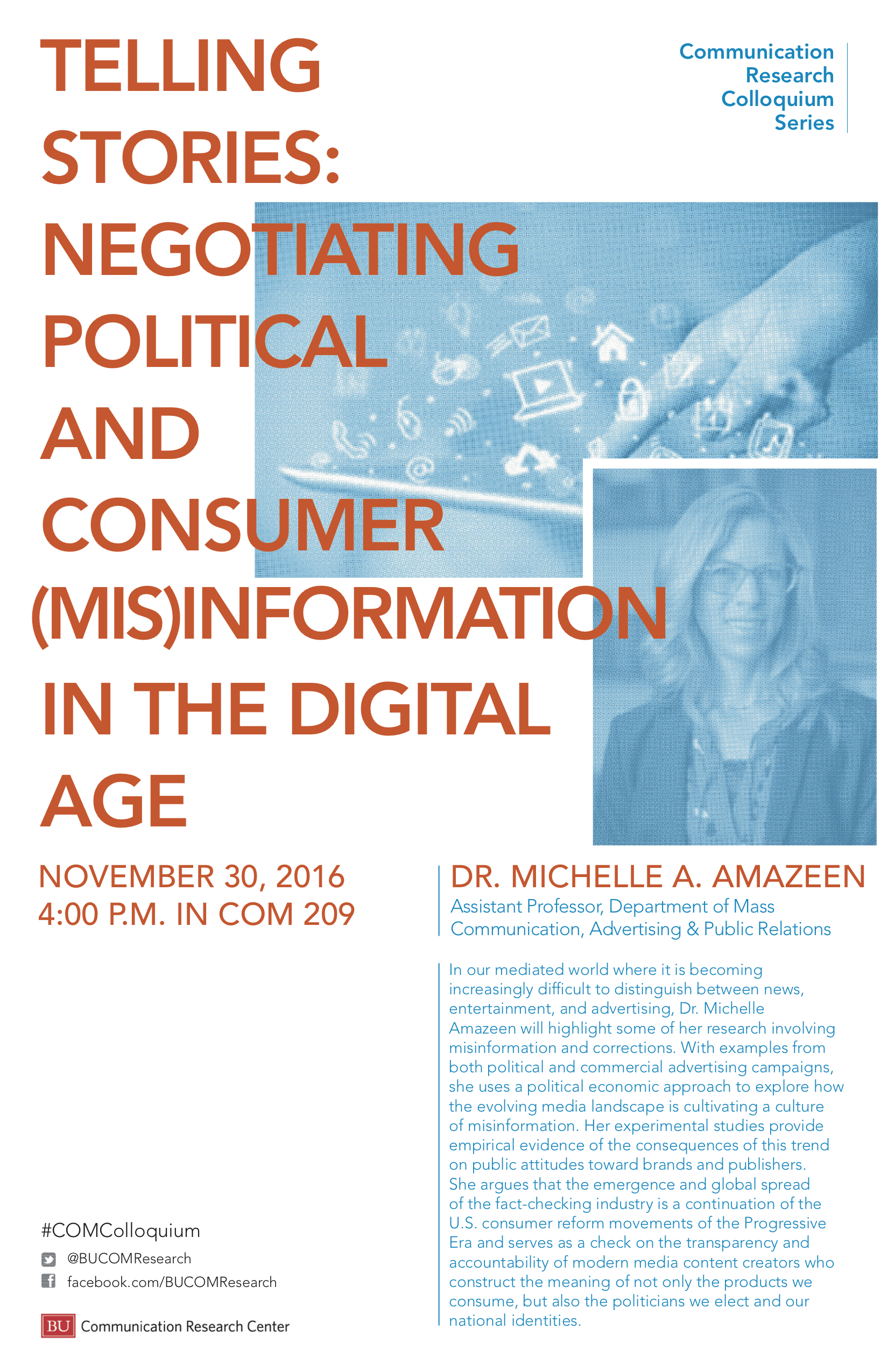 |
Telling Stories: Negotiating Political and Consumer (Mis)Information in the Digital AgeDr. Michelle A. Amazeen
|
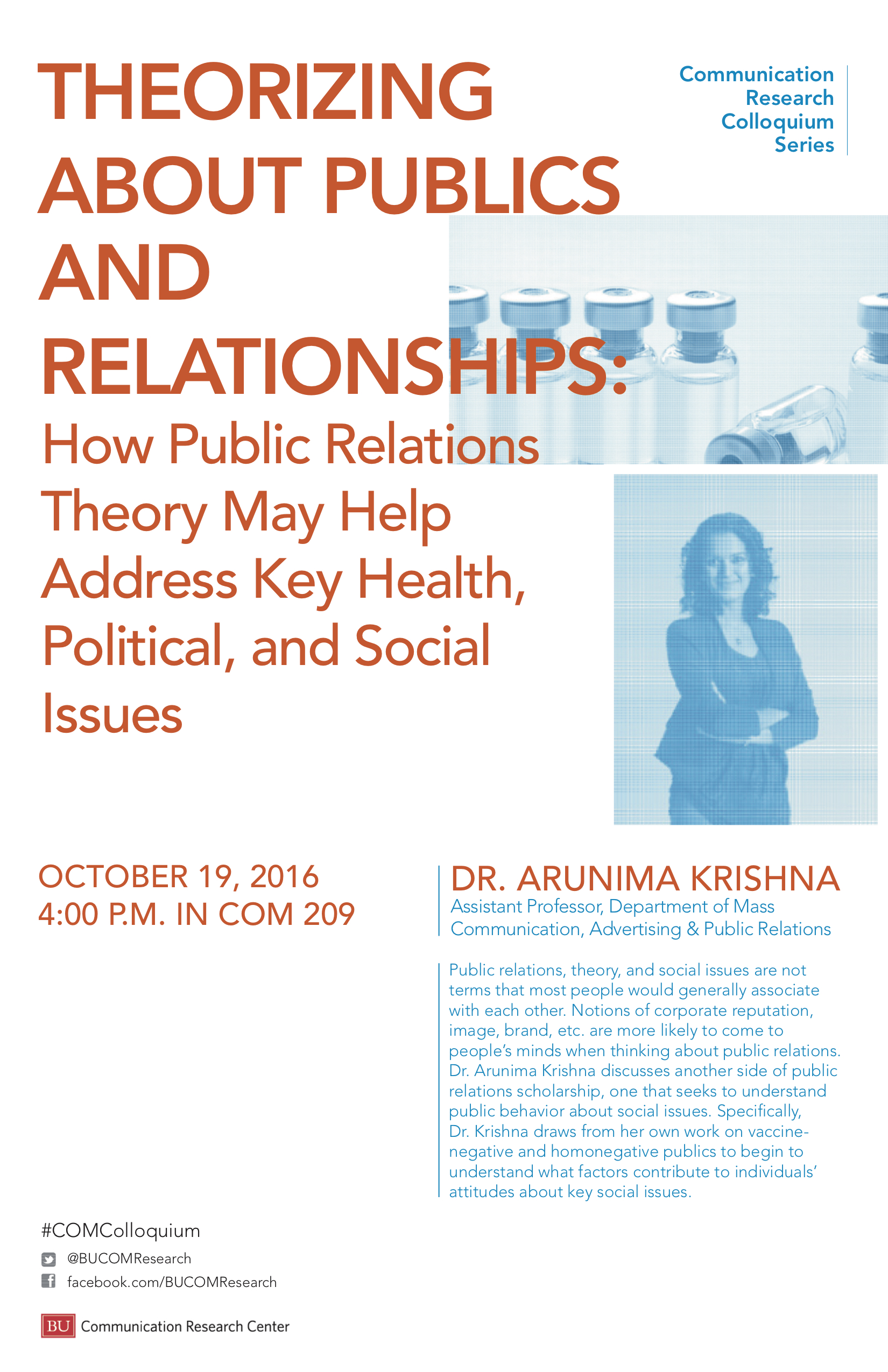 |
Theorizing about Publics and Relationships: How Public Relations May Help Address Key Health, Political, and Social IssuesDr. Arunima Krishna
|
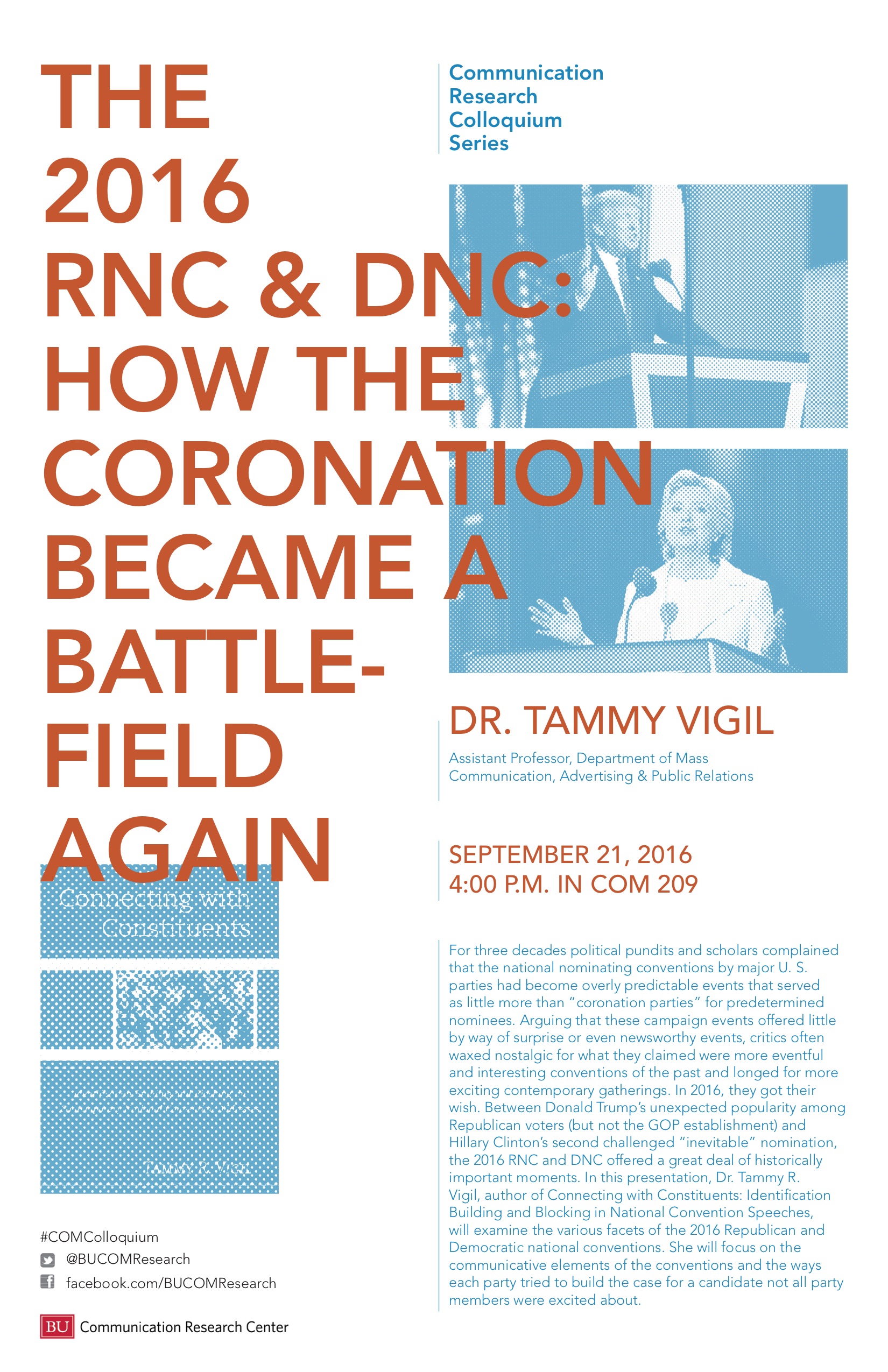 |
The 2016 RNC & DNC: How the Coronation Became a Battlefield AgainDr. Tammy Vigil
|
2015 - 2016 Lectures
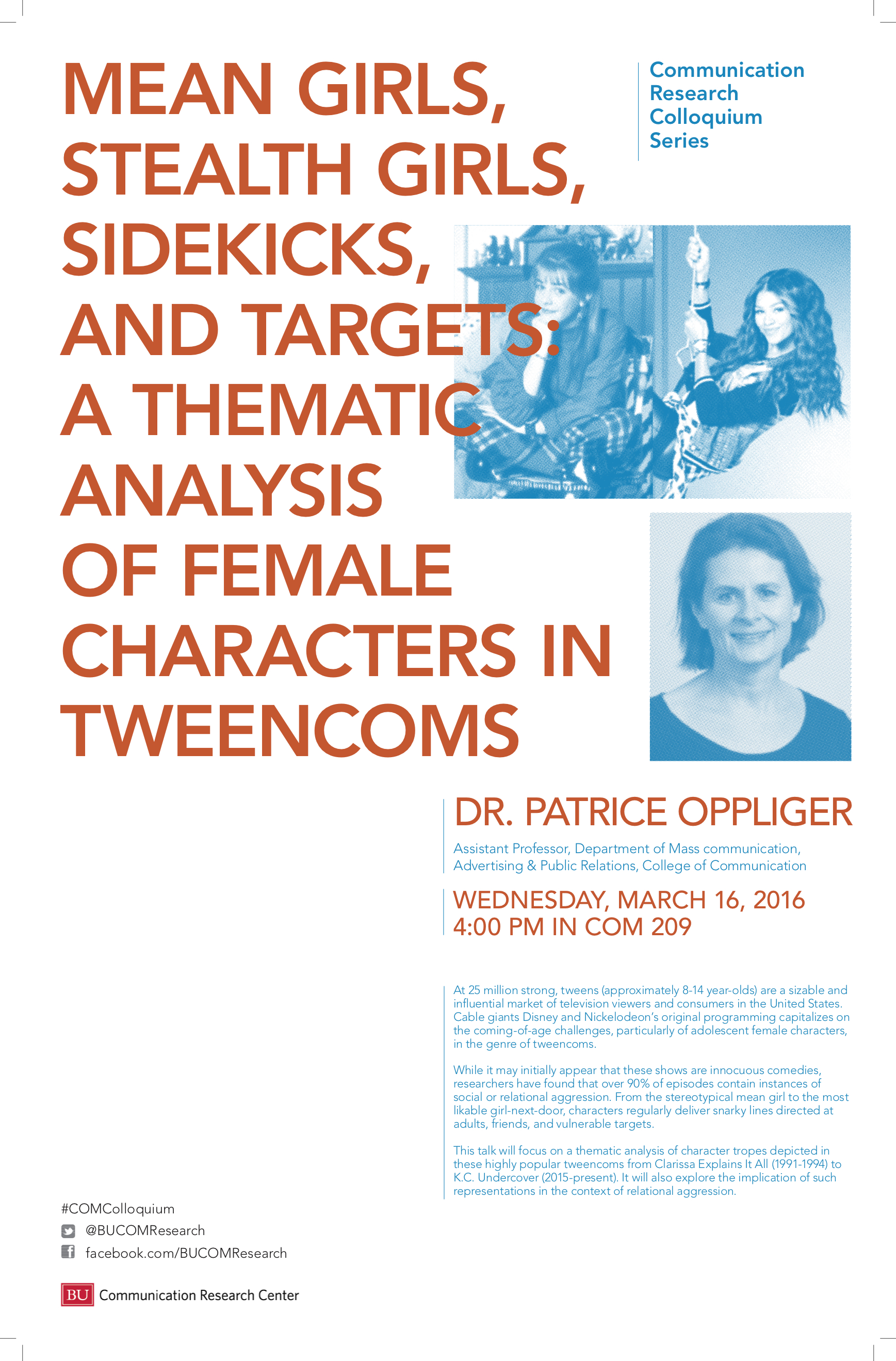 |
Mean Girls, Stealth Girls, Sidekicks, and Targets: A Thematic Analysis of Female Characters in TweencomsDr. Patrice Oppliger
|
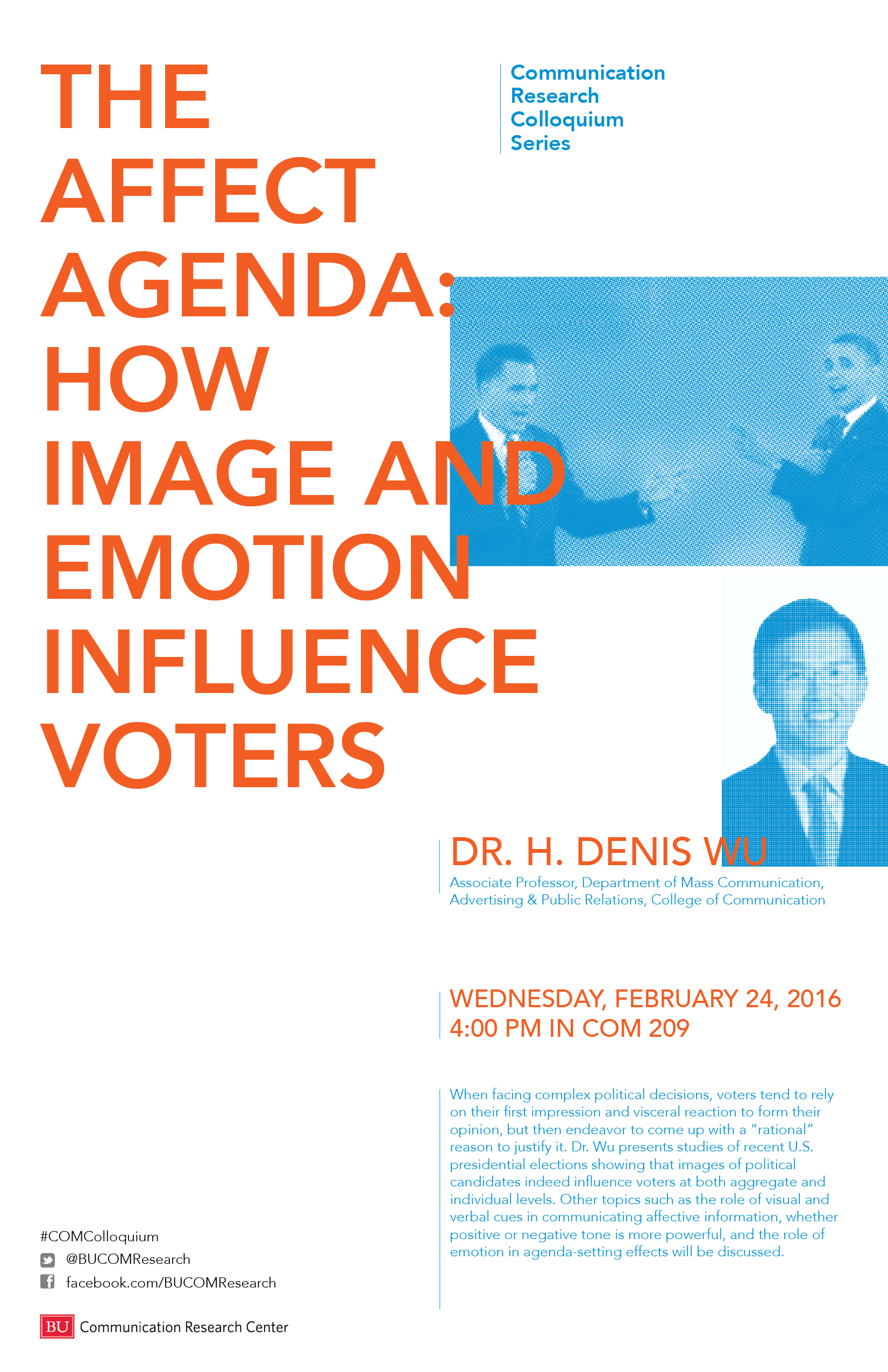 |
The Affect Agenda: How Image and Emotion Influence VotersDr. H. Denis Wu
|
 |
Media Without Borders: Task-Switching on Personal ComputersDr. Jim Cummings
|
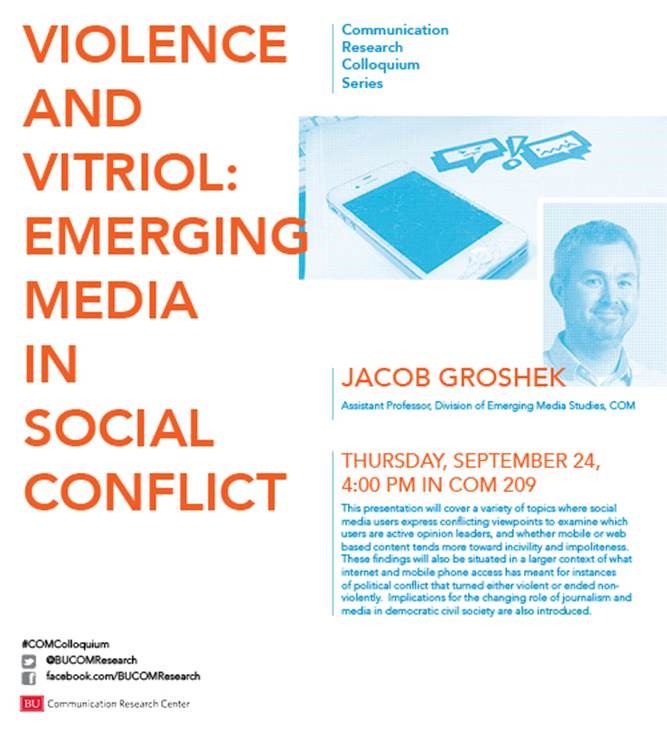 |
Violence and Vitriol: Emerging Media in Social ConflictDr. Jacob Groshek
|
2014 - 2015 Lectures
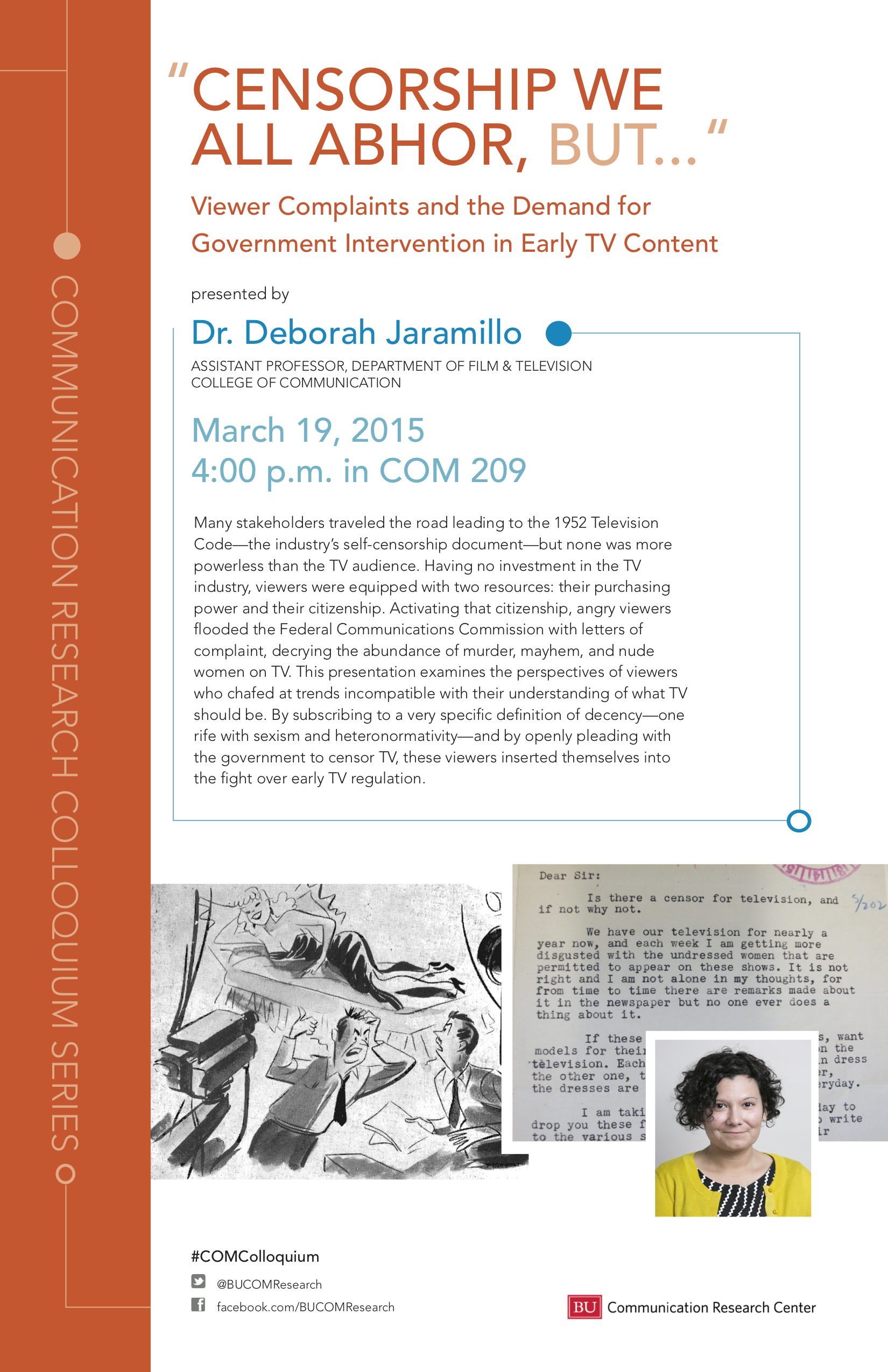 |
“Censorship We All Abhor, But…”: Viewer Complaints and the Demand for Government Intervention in Early TV ContentDr. Deborah Jaramillo
|
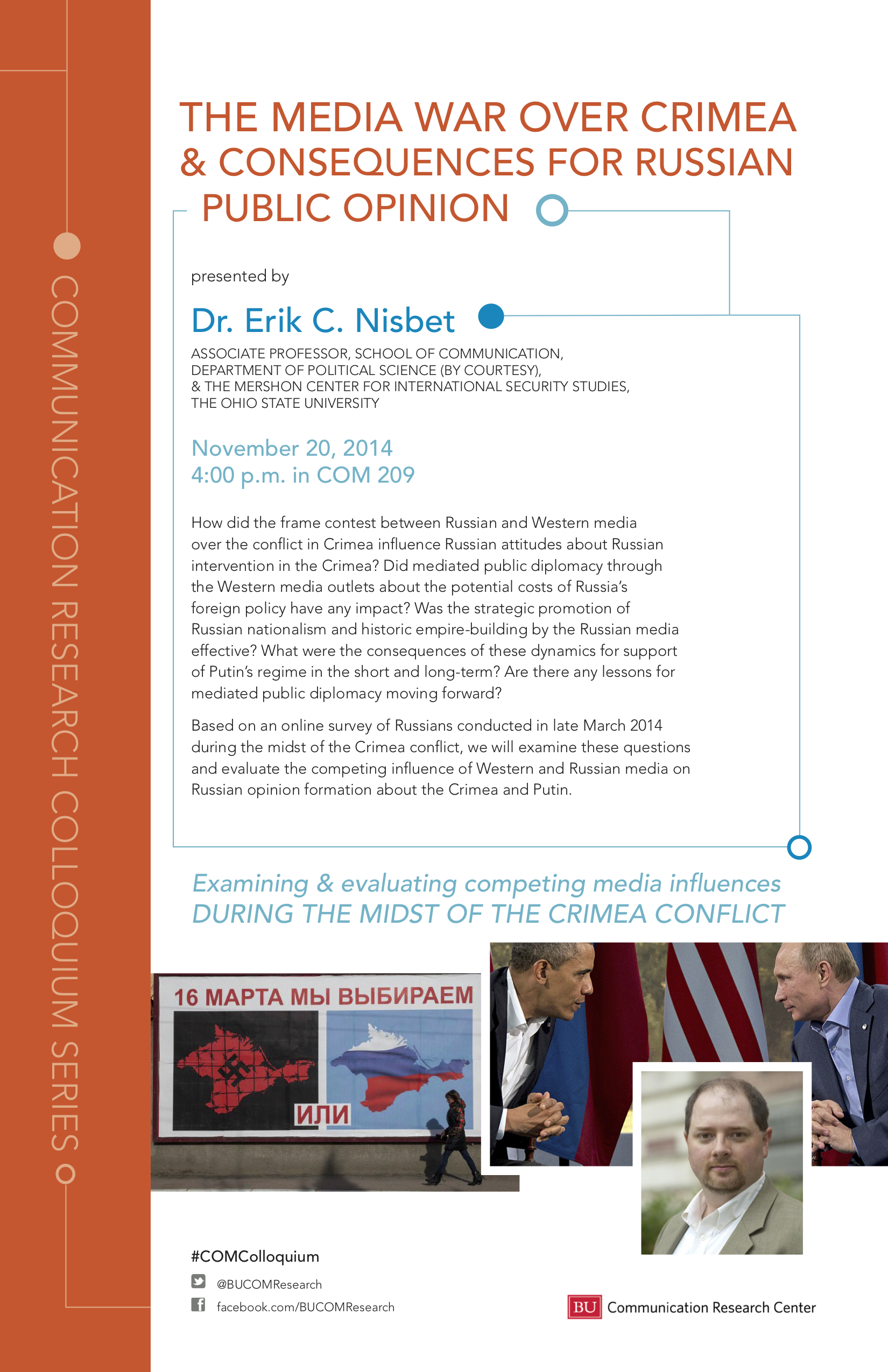 |
The Media War over Crimea and Consequences for Russian Public OpinionDr. Erik C. Nisbet
|
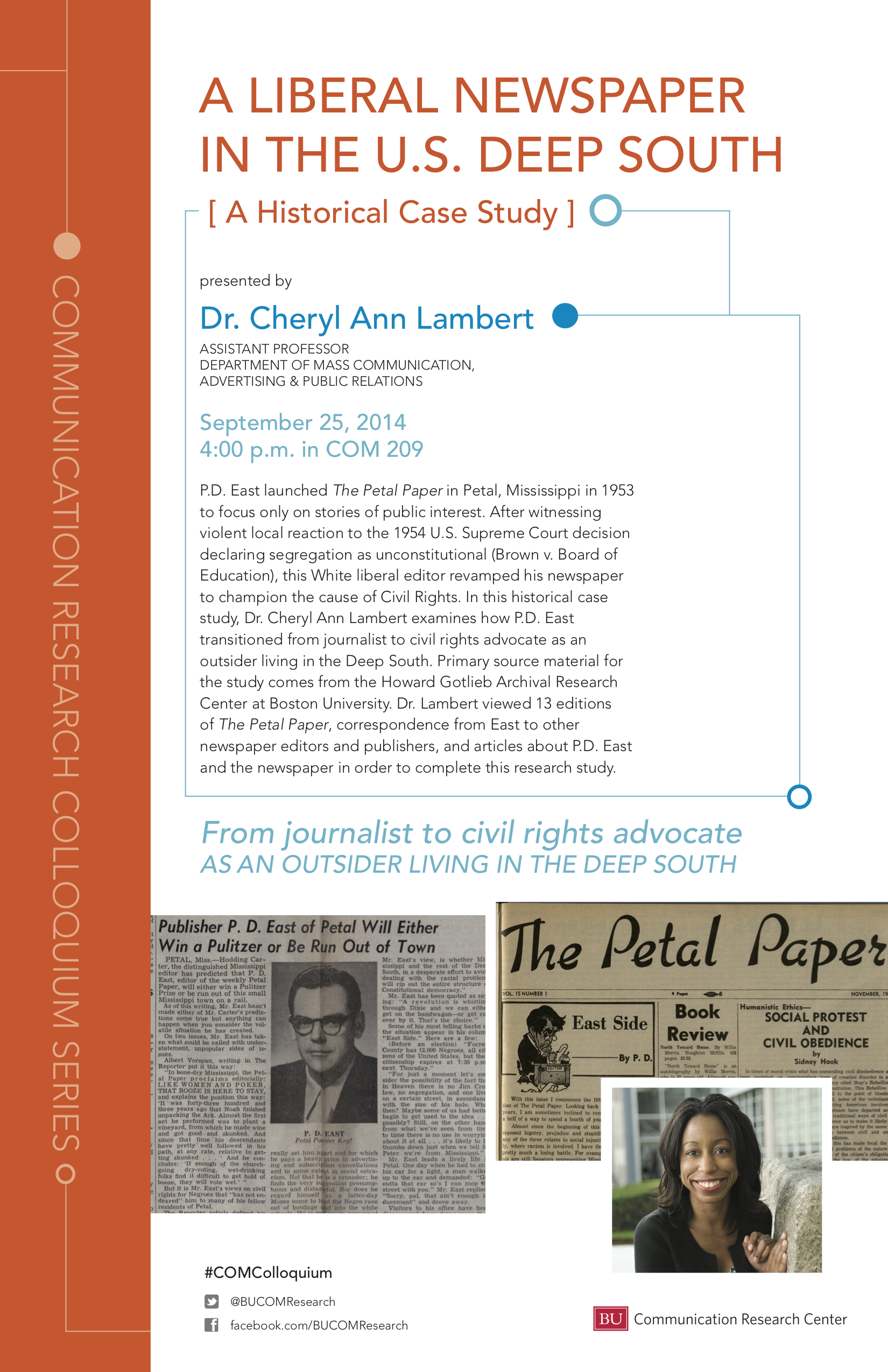 |
A Liberal Newspaper in the U.S. Deep SouthDr. Cheryl Ann Lambert
|
2013 - 2014 Lectures
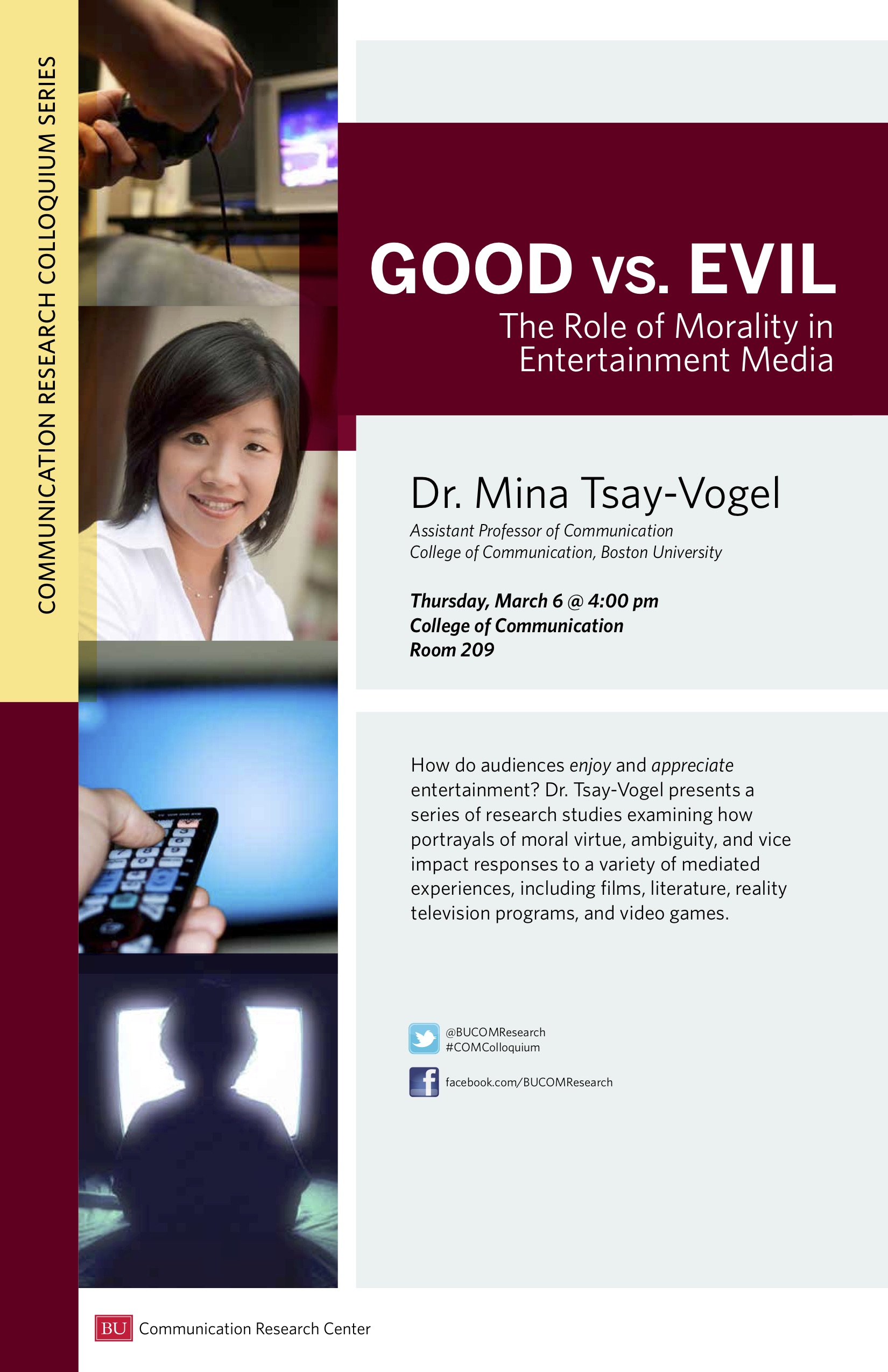 |
Good vs. Evil: The Role of Morality in Entertainment MediaDr. Mina Tsay-Vogel
|
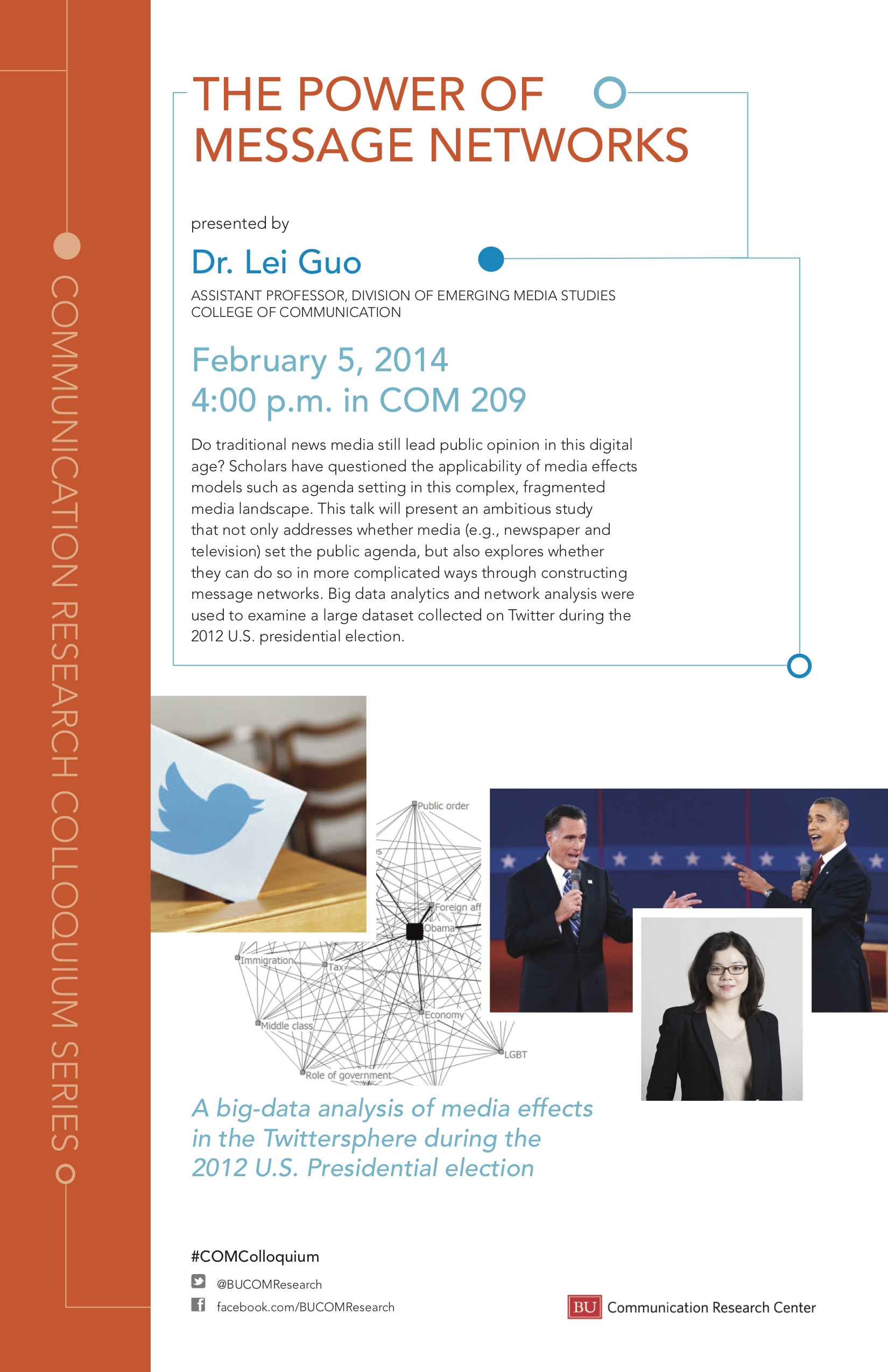 |
The Power of Message NetworksDr. Lei Guo
|
2012 - 2013 Lectures
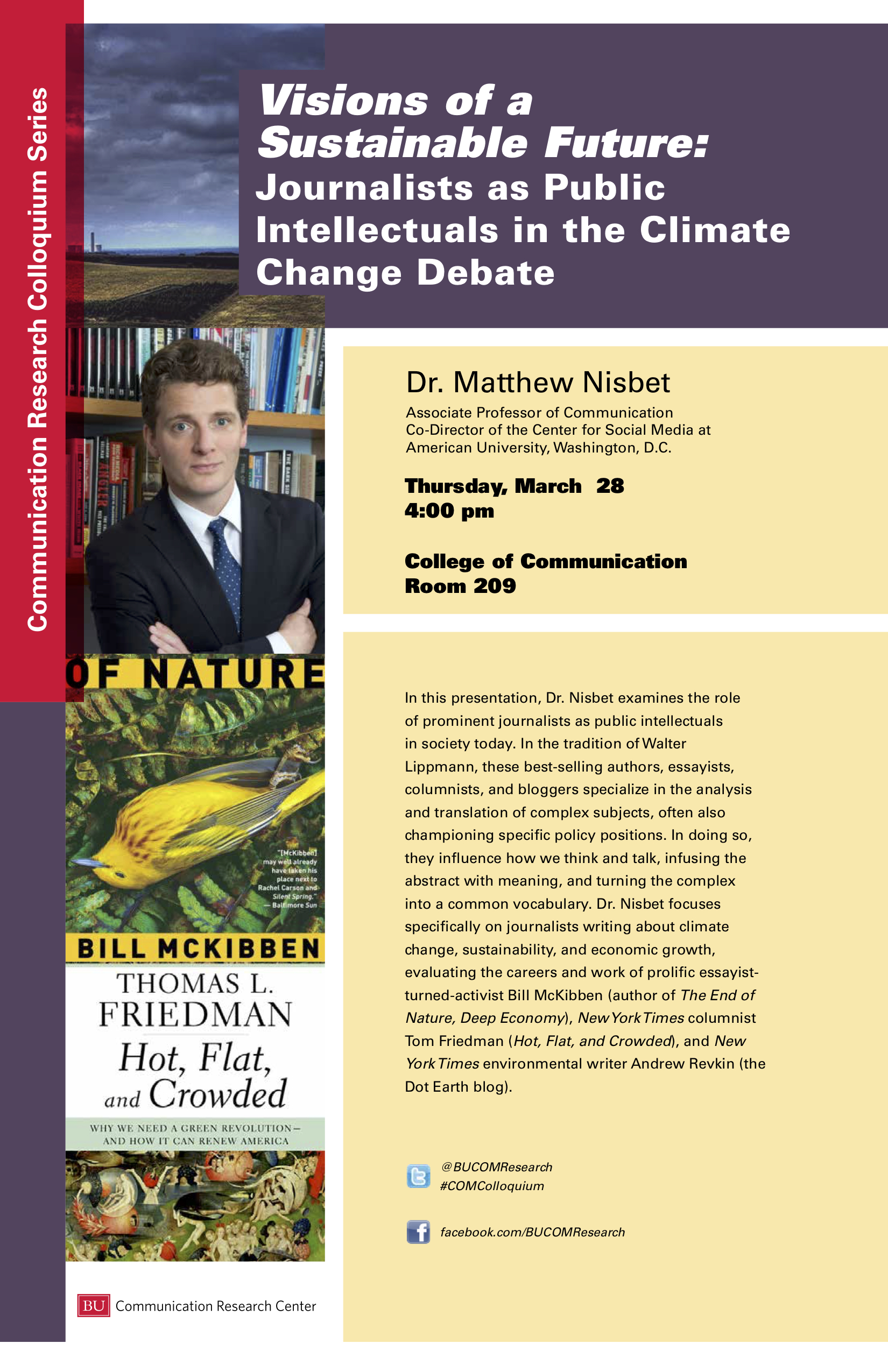 |
Visions of a Sustainable Future: Journalists as Public Intellectuals in the Climate Change DebateDr. Matthew Nisbet
|
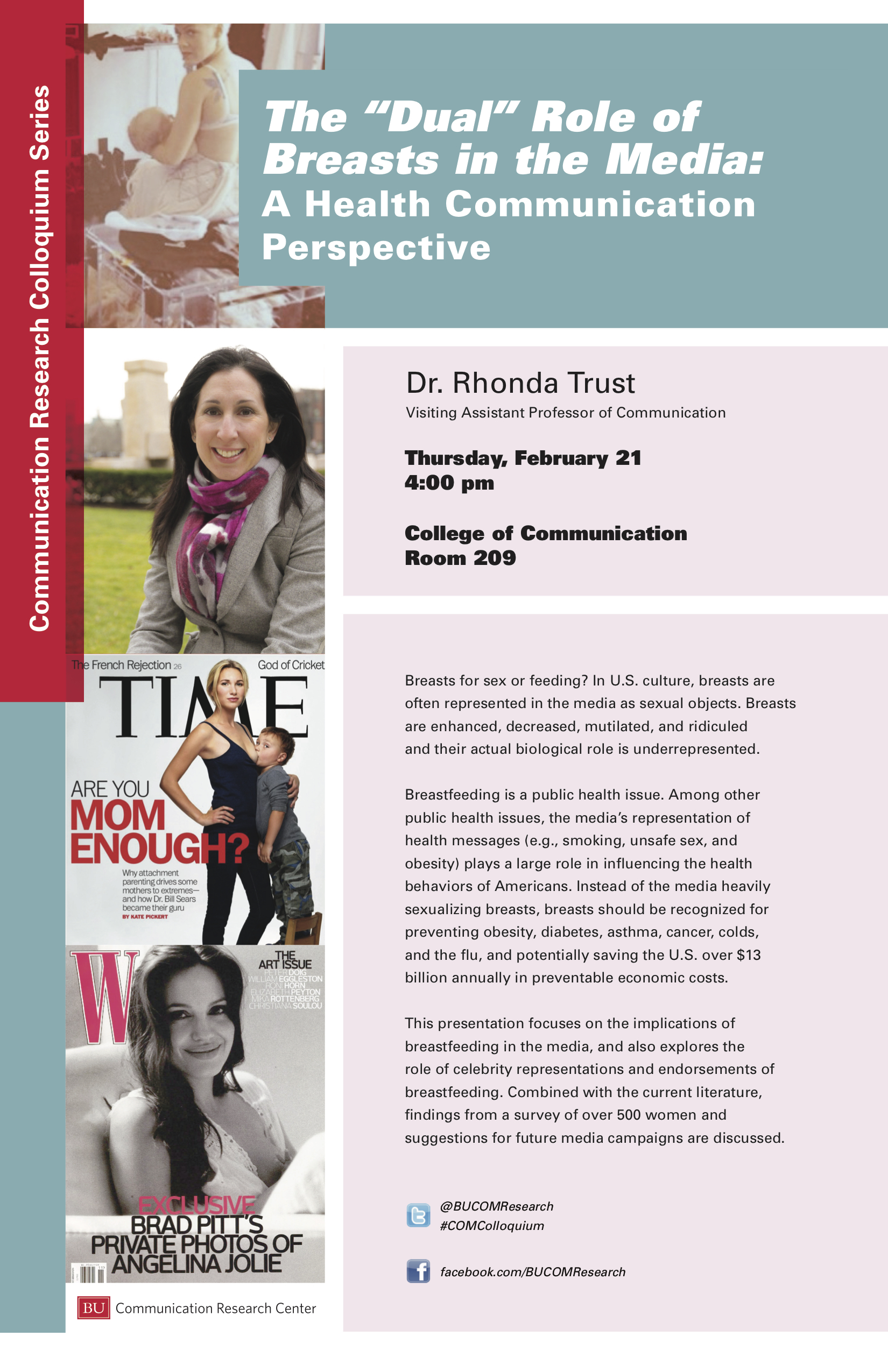 |
The “Dual” Role of Breasts in the Media: A Health Communication PerspectiveDr. Rhonda Trust
|
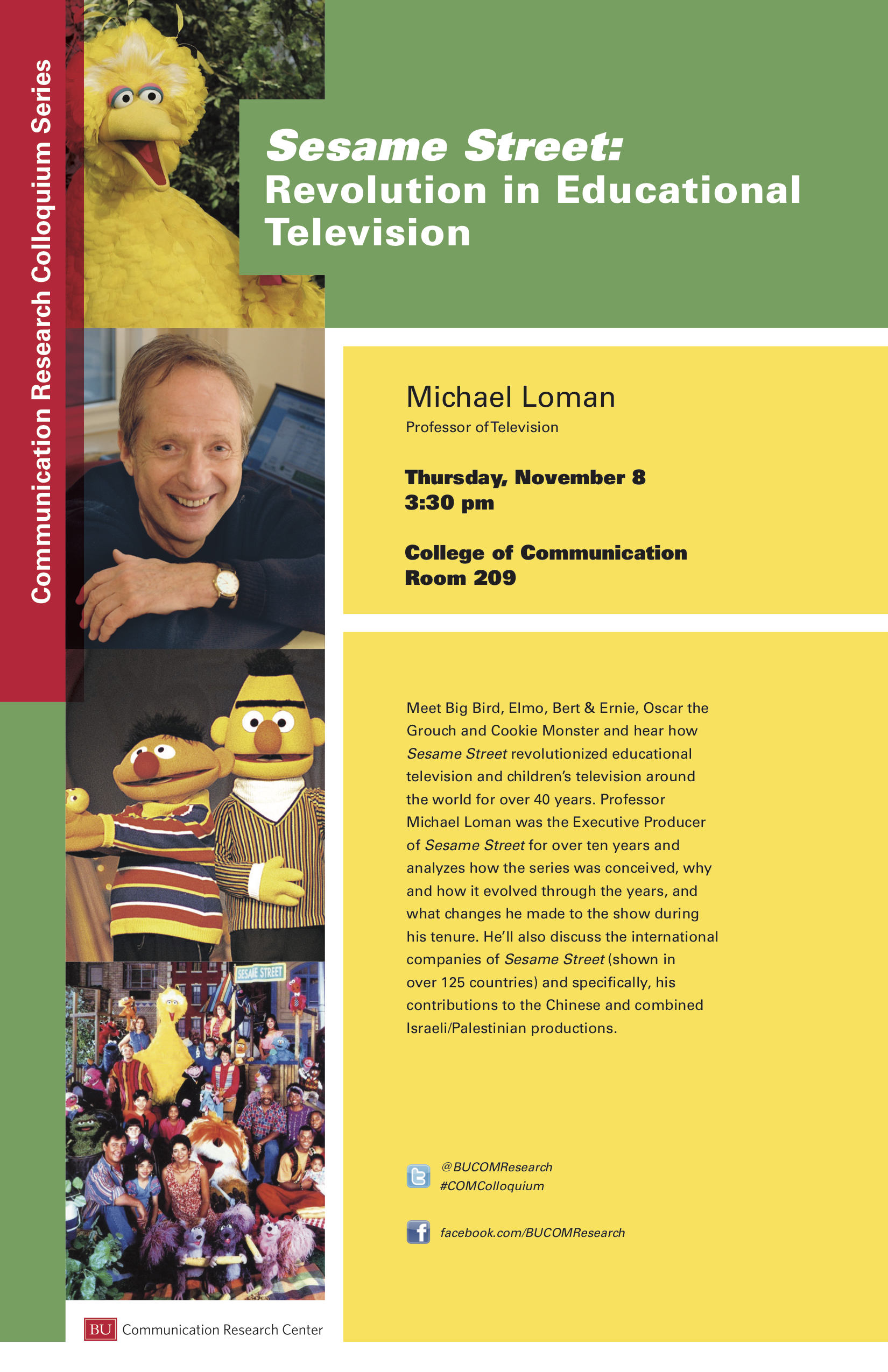 |
Sesame Street: Revolution in Educational TelevisionMichael Loman
|
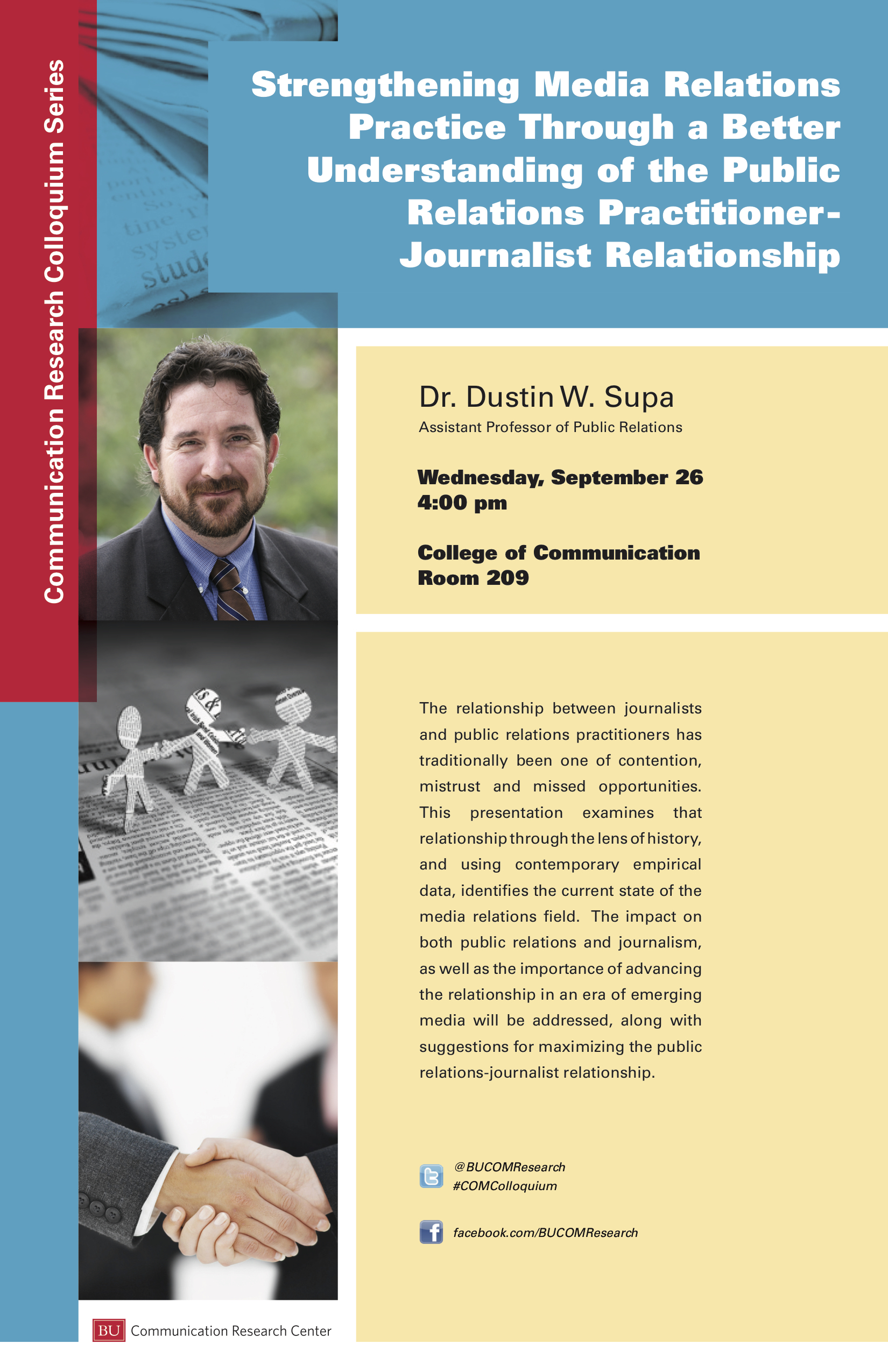 |
Strengthening Media Relations Practice Through a Better Understanding of the Public Relations Practitioner-Journalist RelationshipDr. Dustin Supa
|
2011 - 2012 Lectures
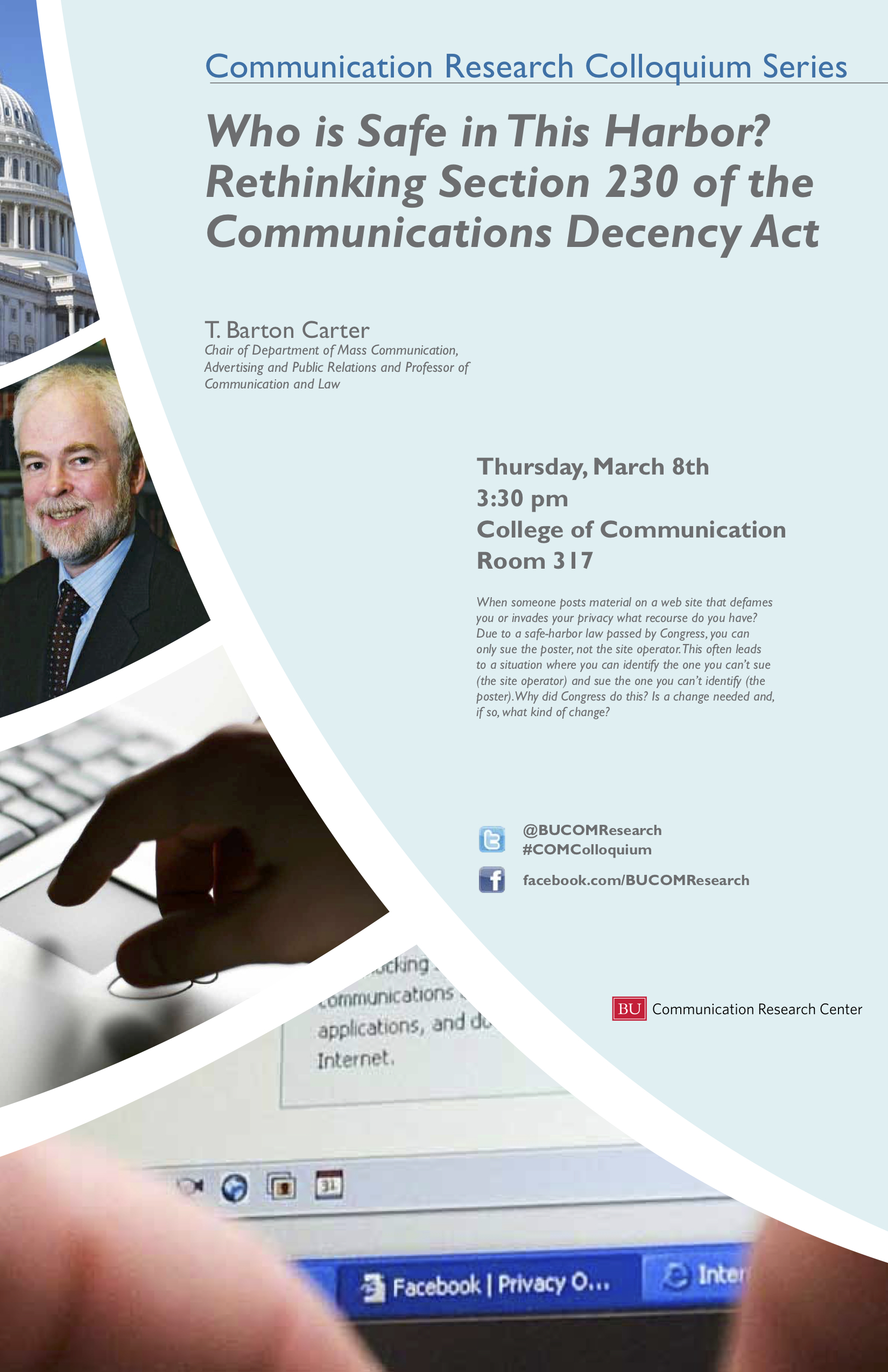 |
Who is Safe in this Harbor? Rethinking Section 230 of the Communications Decency ActDr. Barton Carter
|
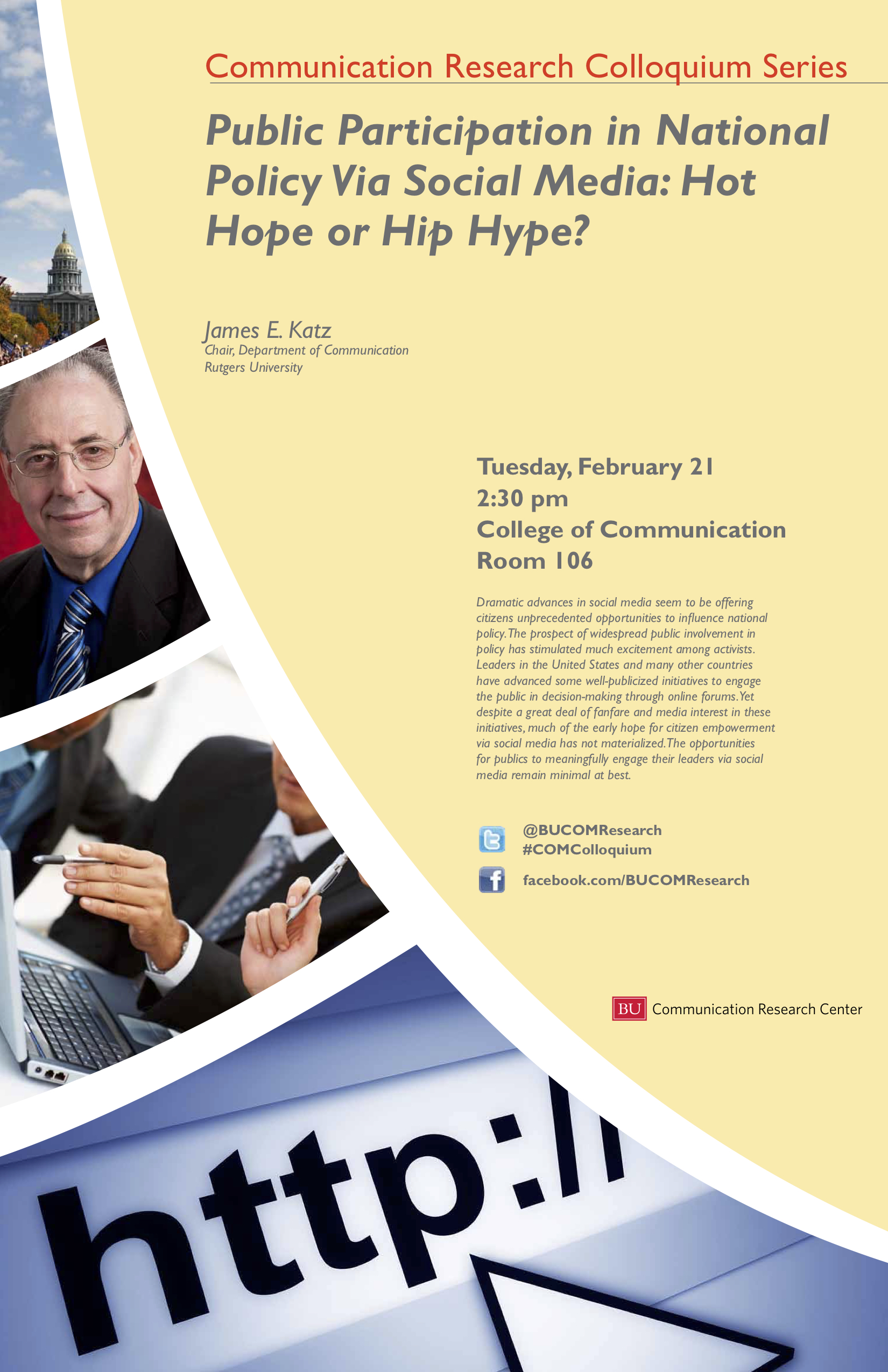 |
Public Participation in National Policy via Social Media: Hot Hope or Hip Hype?Dr. James E. Katz
|
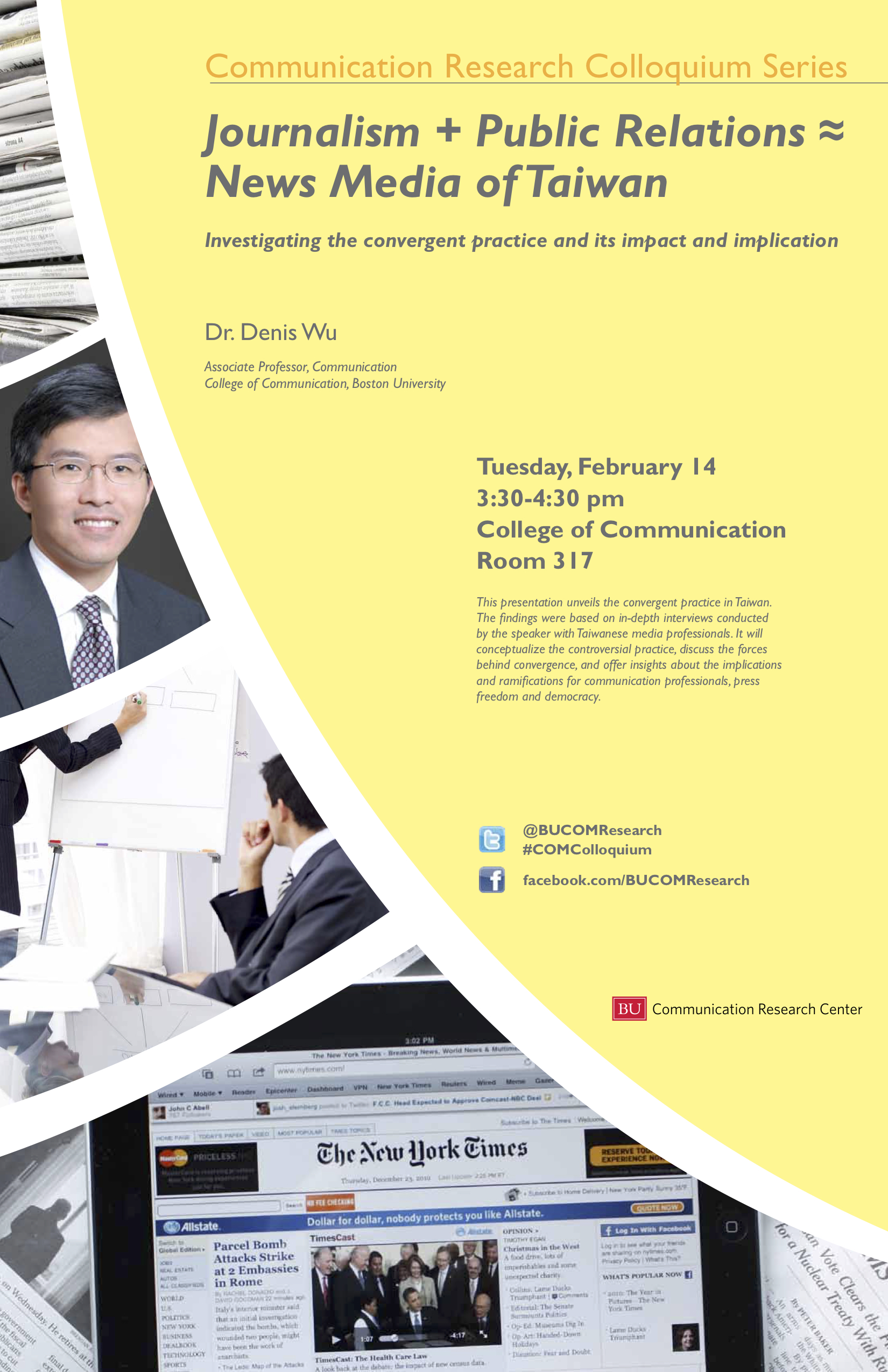 |
Journalism + Public Relations = News Media of TaiwanDr. Denis Wu
|
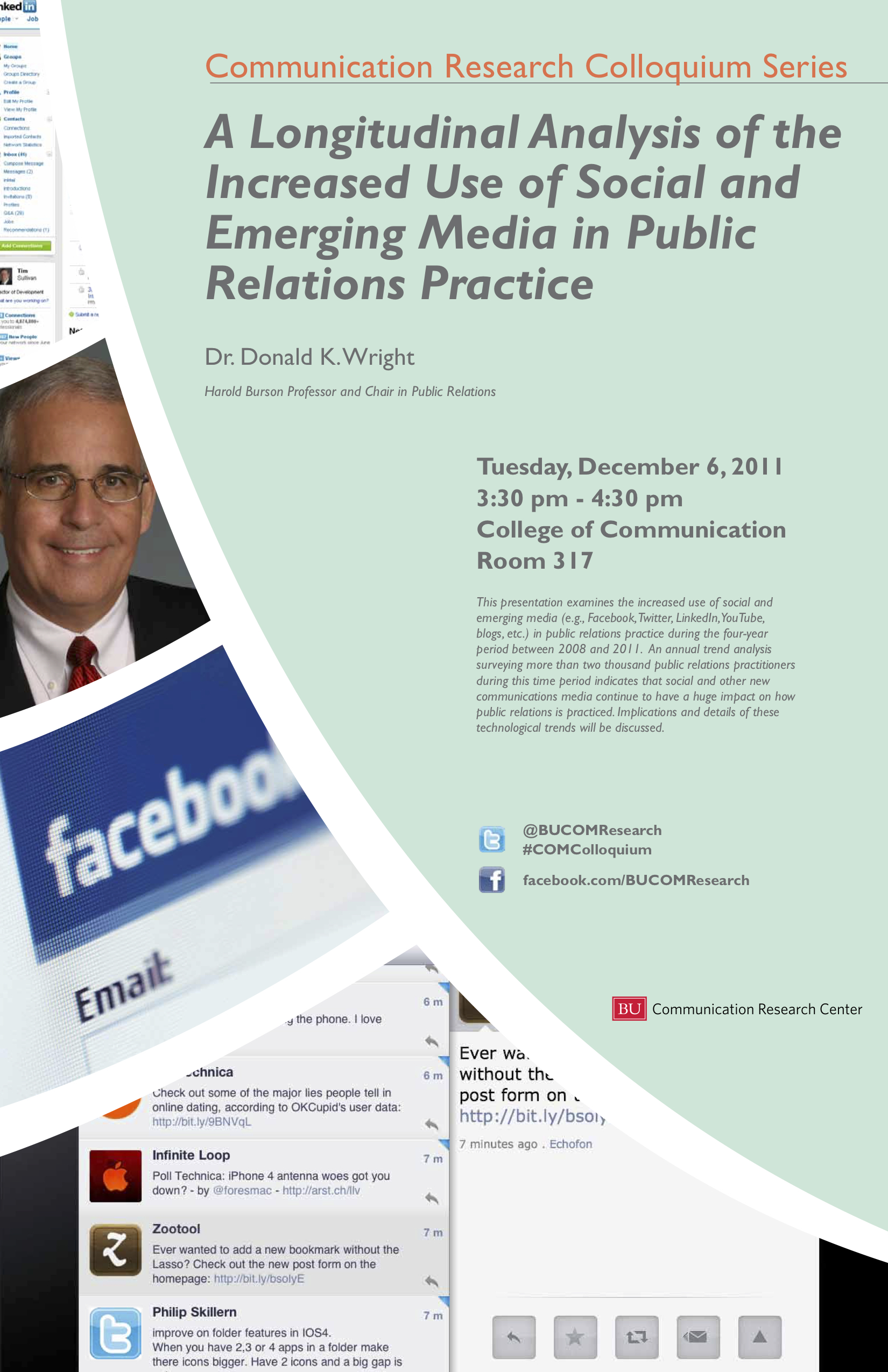 |
A Longitudinal Analysis of the Increased Use of Social and Emerging Media in Public Relations PracticeDr. Donald K. Wright
|
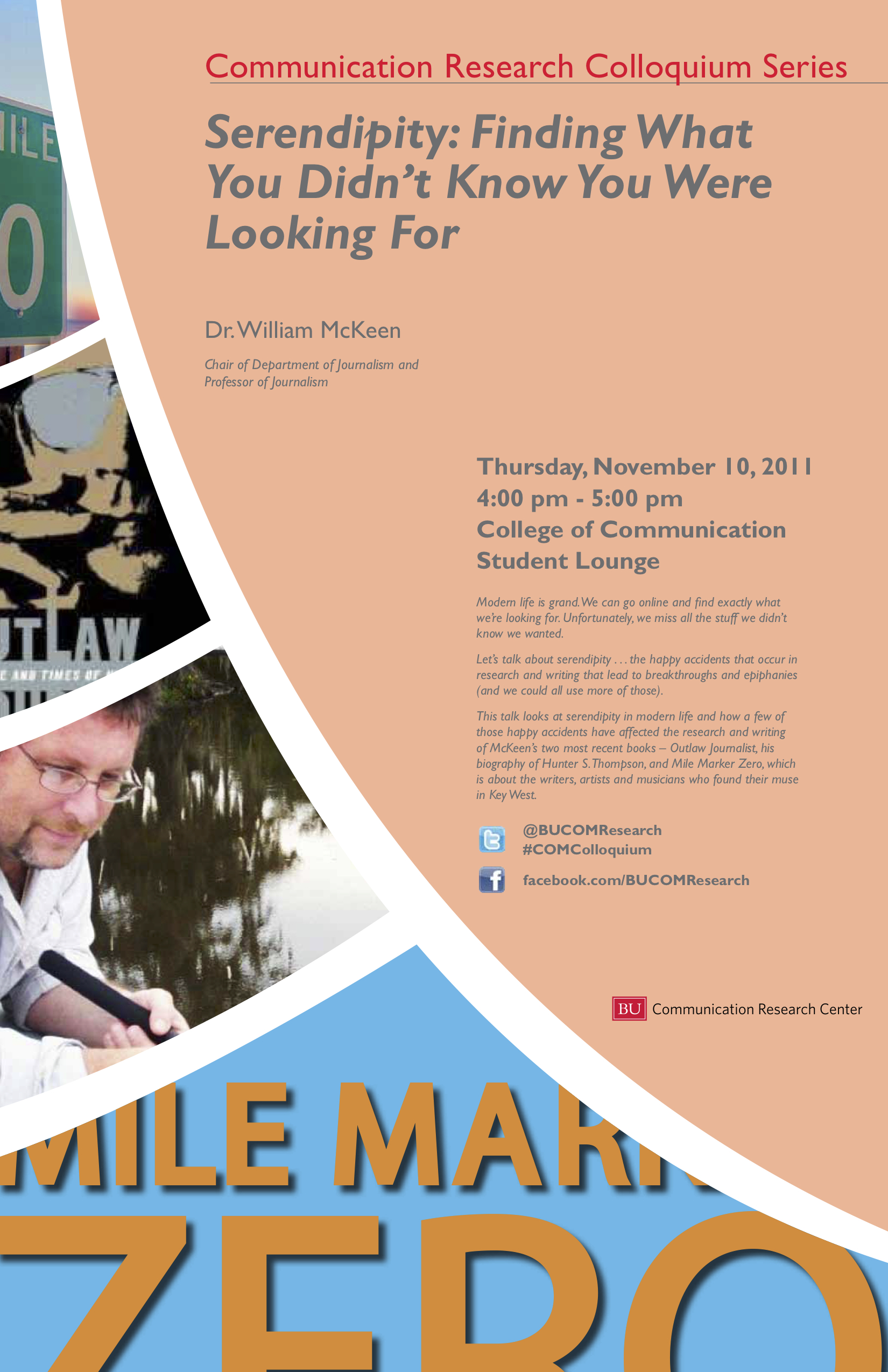 |
Serendipity: Finding What You Didn’t Know You Were Looking ForDr. William McKeen
|
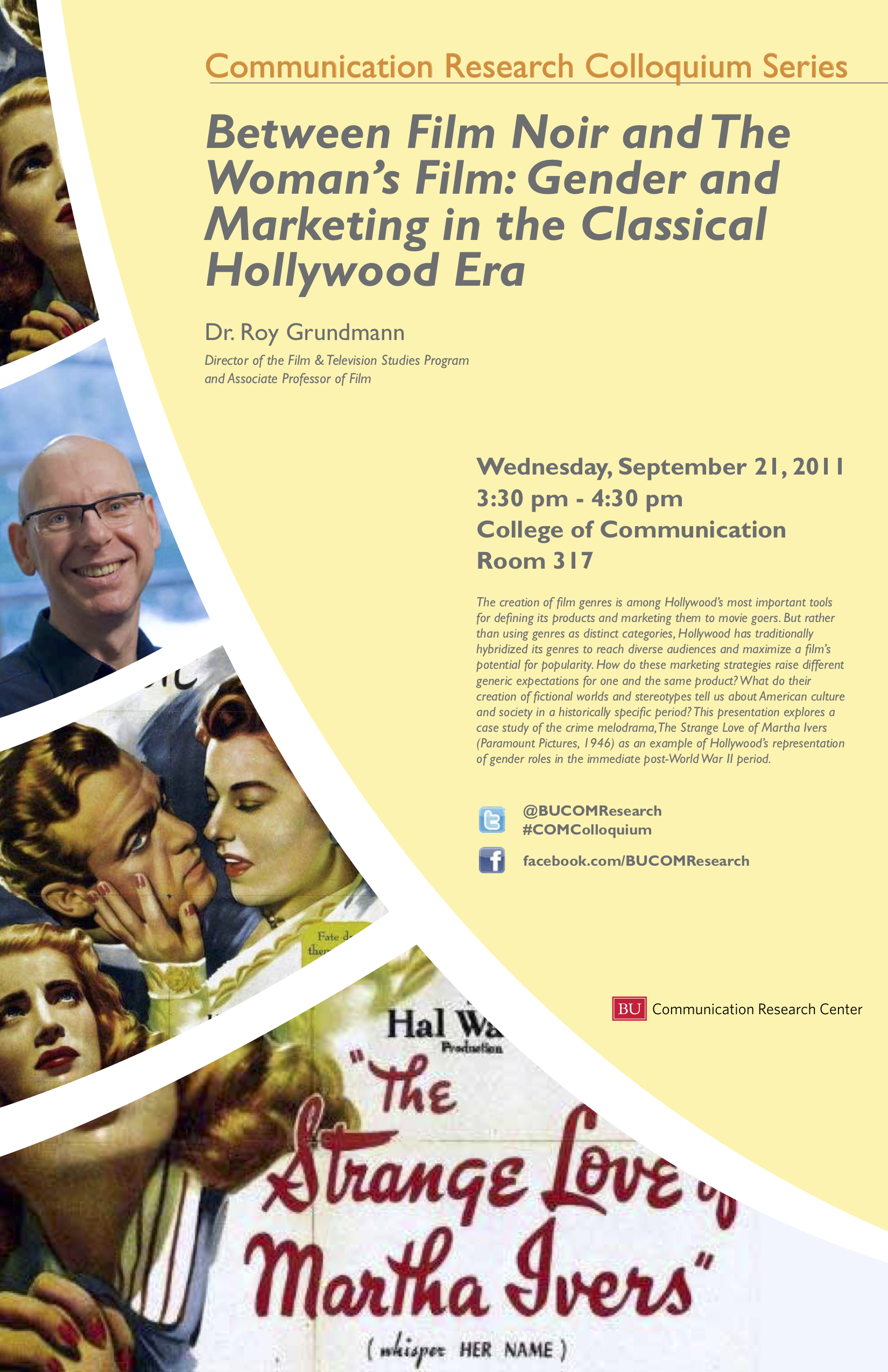 |
Between Film Noir and The Woman’s Film: Gender and Marketing in the Classical Hollywood EraDr. Roy Grundmann
|
2010 - 2011 Lectures
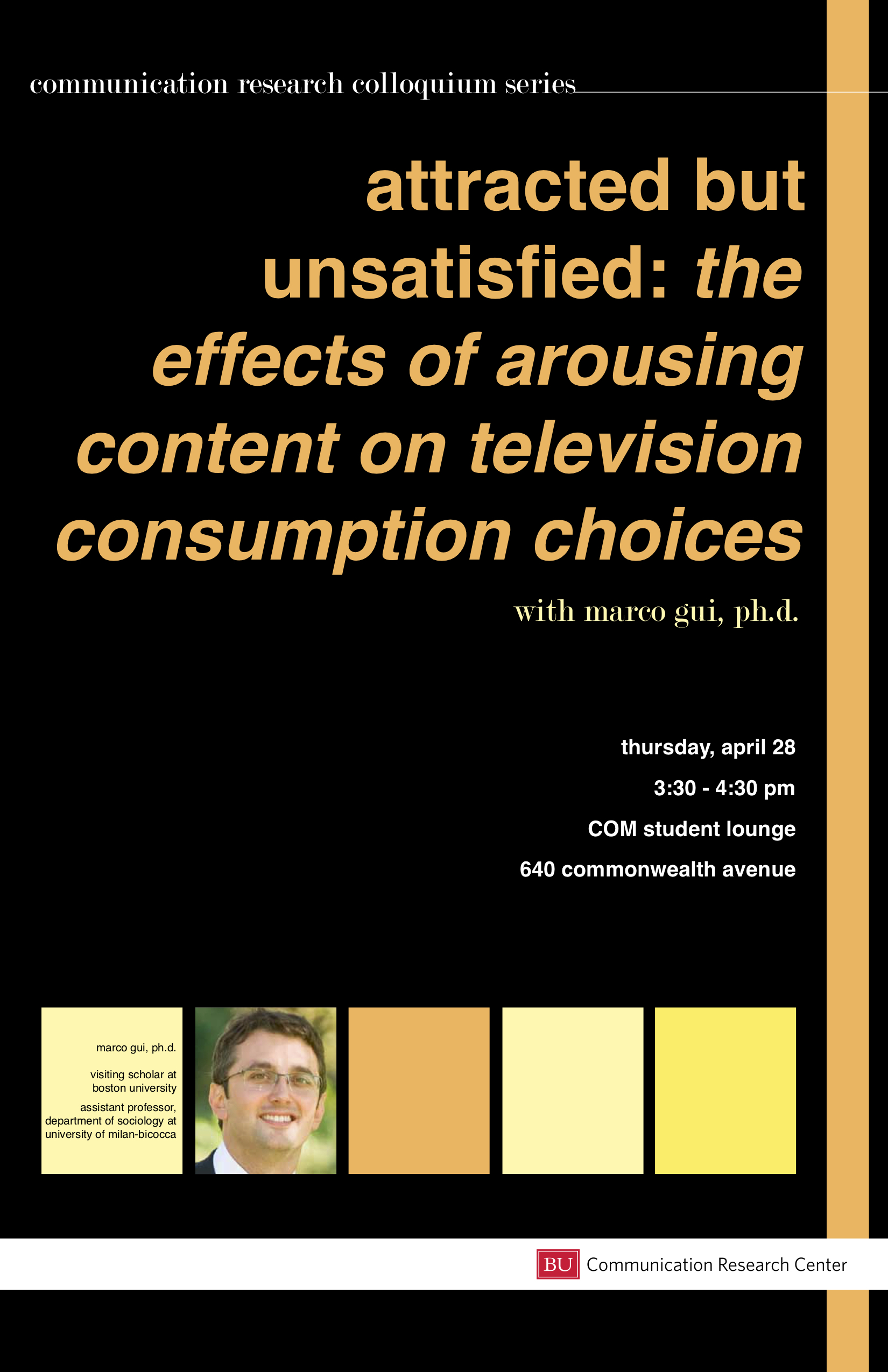 |
Attracted but Unsatisfied: The Effects of Arousing Content on Television Consumption ChoicesDr. Marco Gui
|
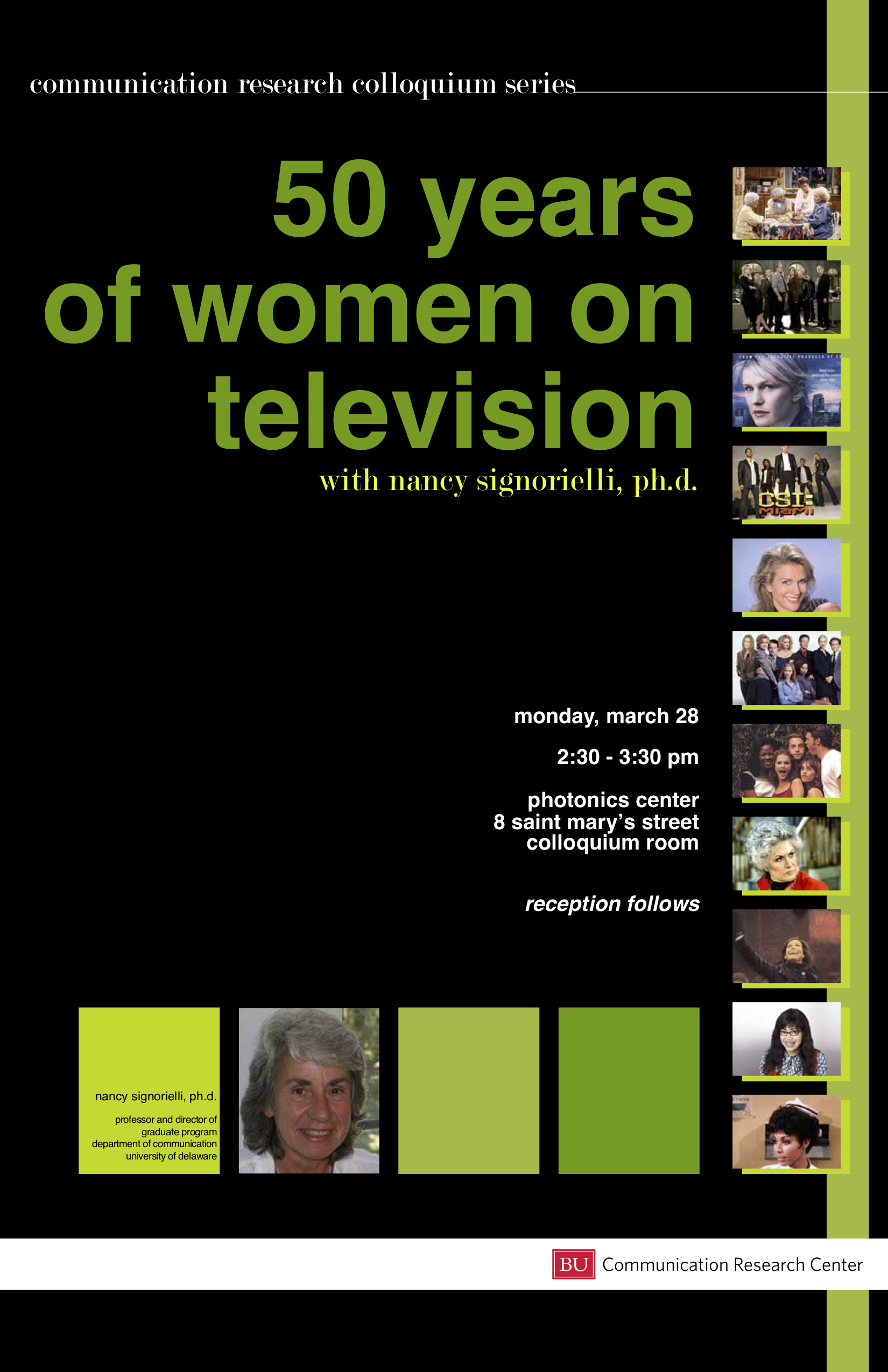 |
50 Years of Women on TelevisionDr. Nancy Signorielli
|
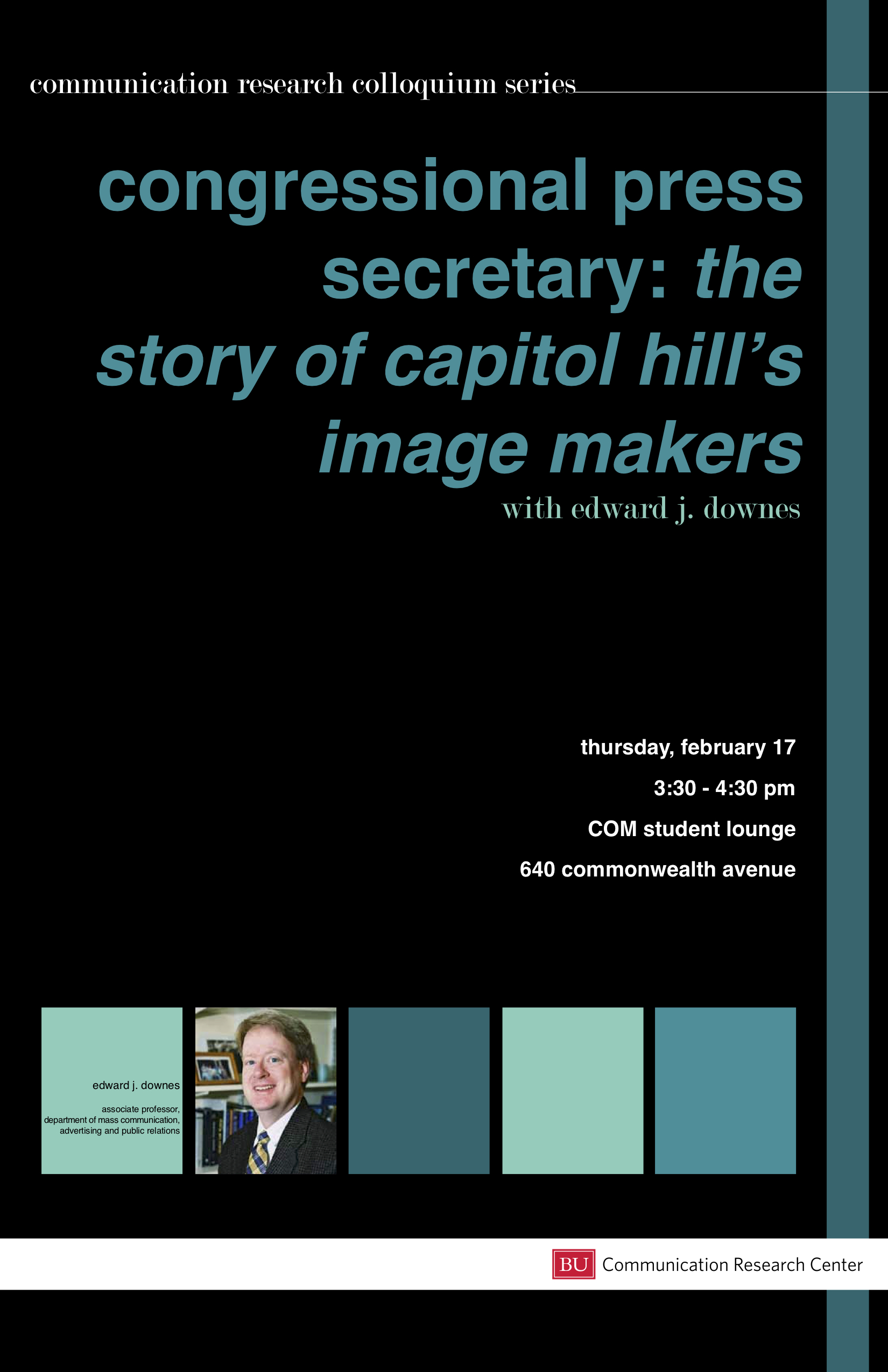 |
Congressional Press Secretary: The Story of Capitol Hill’s Image MakersEdward J. Downes
|
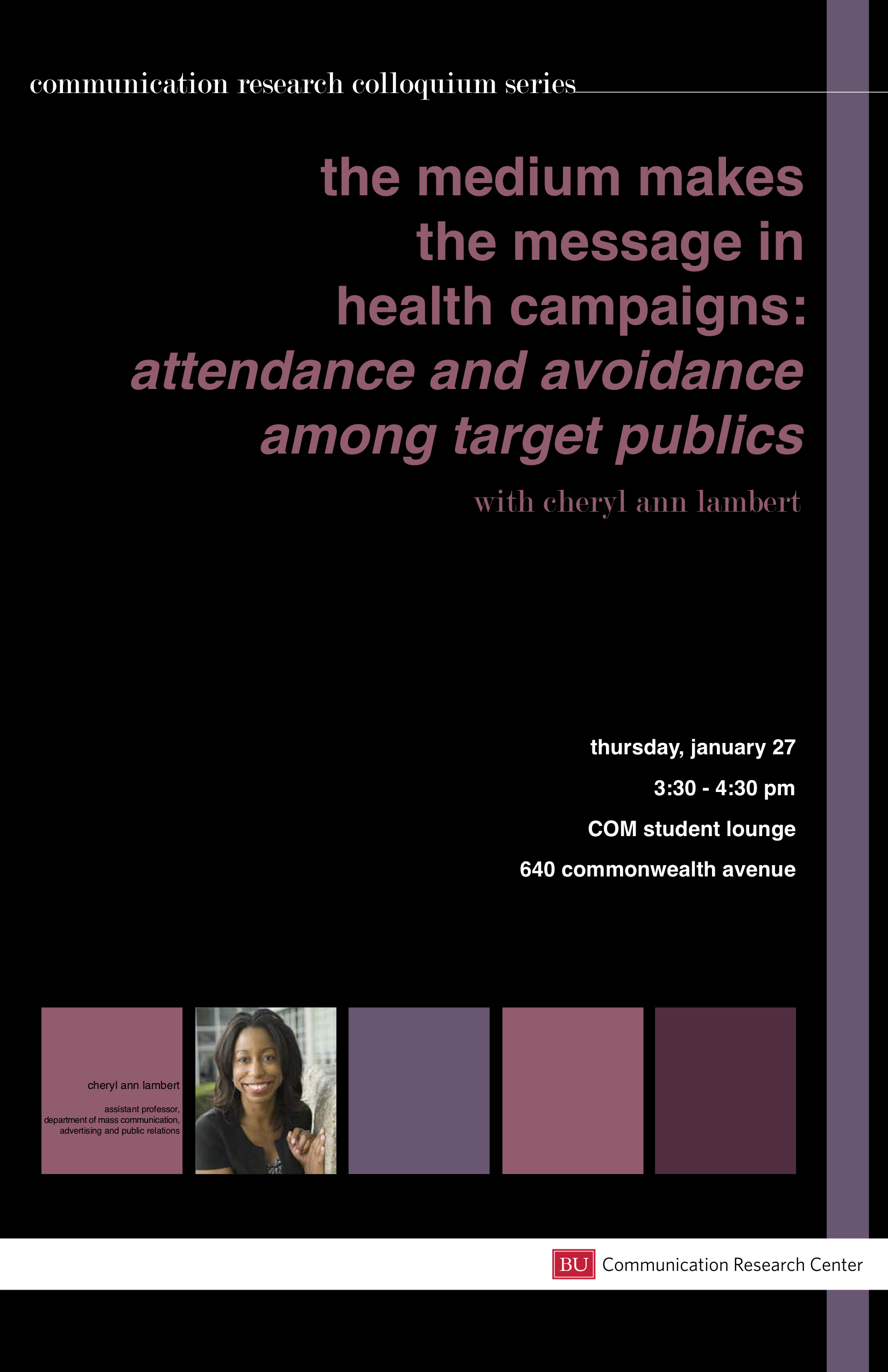 |
The Medium Makes the Message in Health Campaigns: Attendance and Avoidance among Target PublicsCheryl Ann Lambert
|
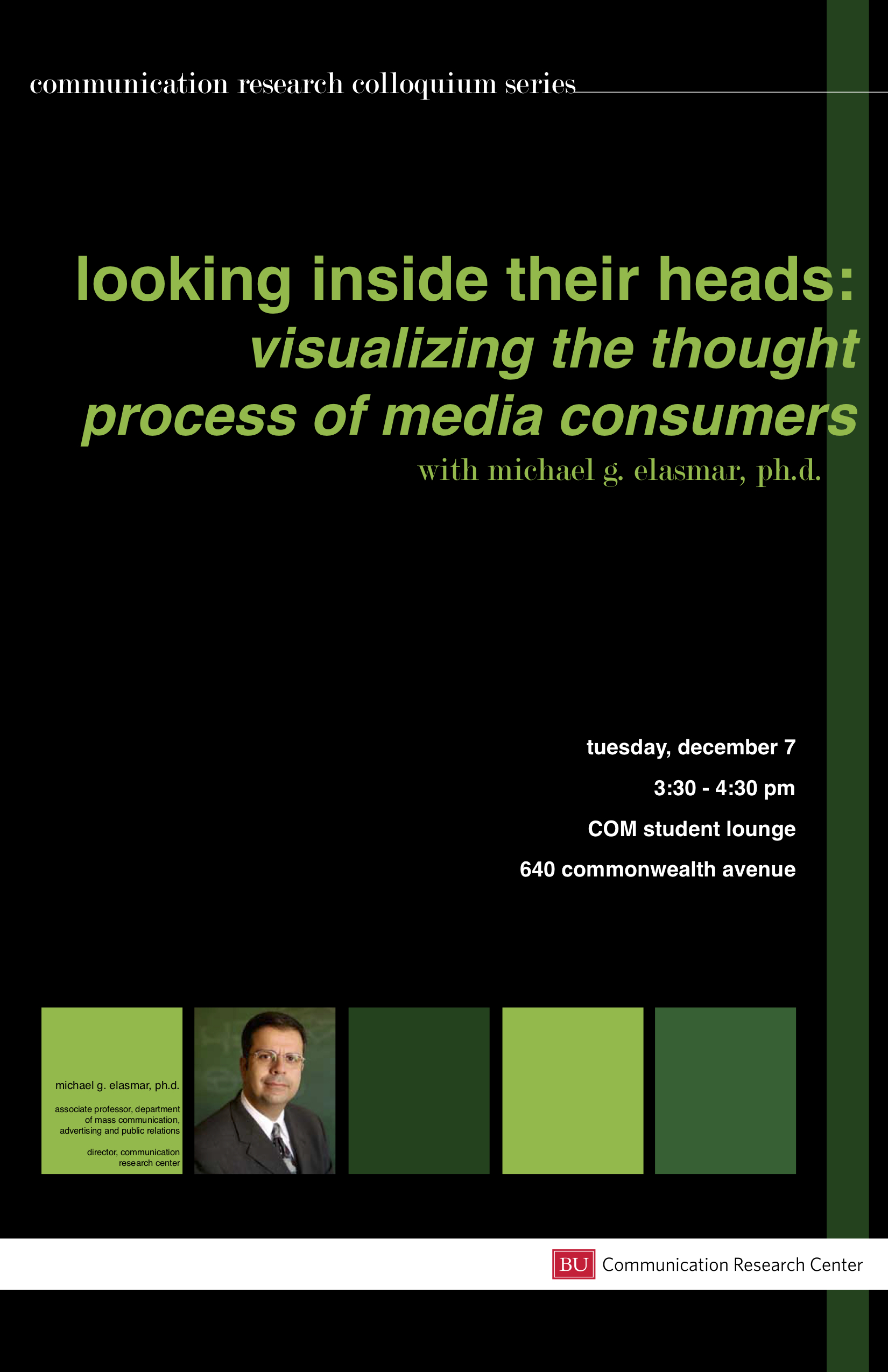 |
Looking Inside Their Heads: Visualizing the Thought Process of Media ConsumersDr. Michael G. Elasmar
|
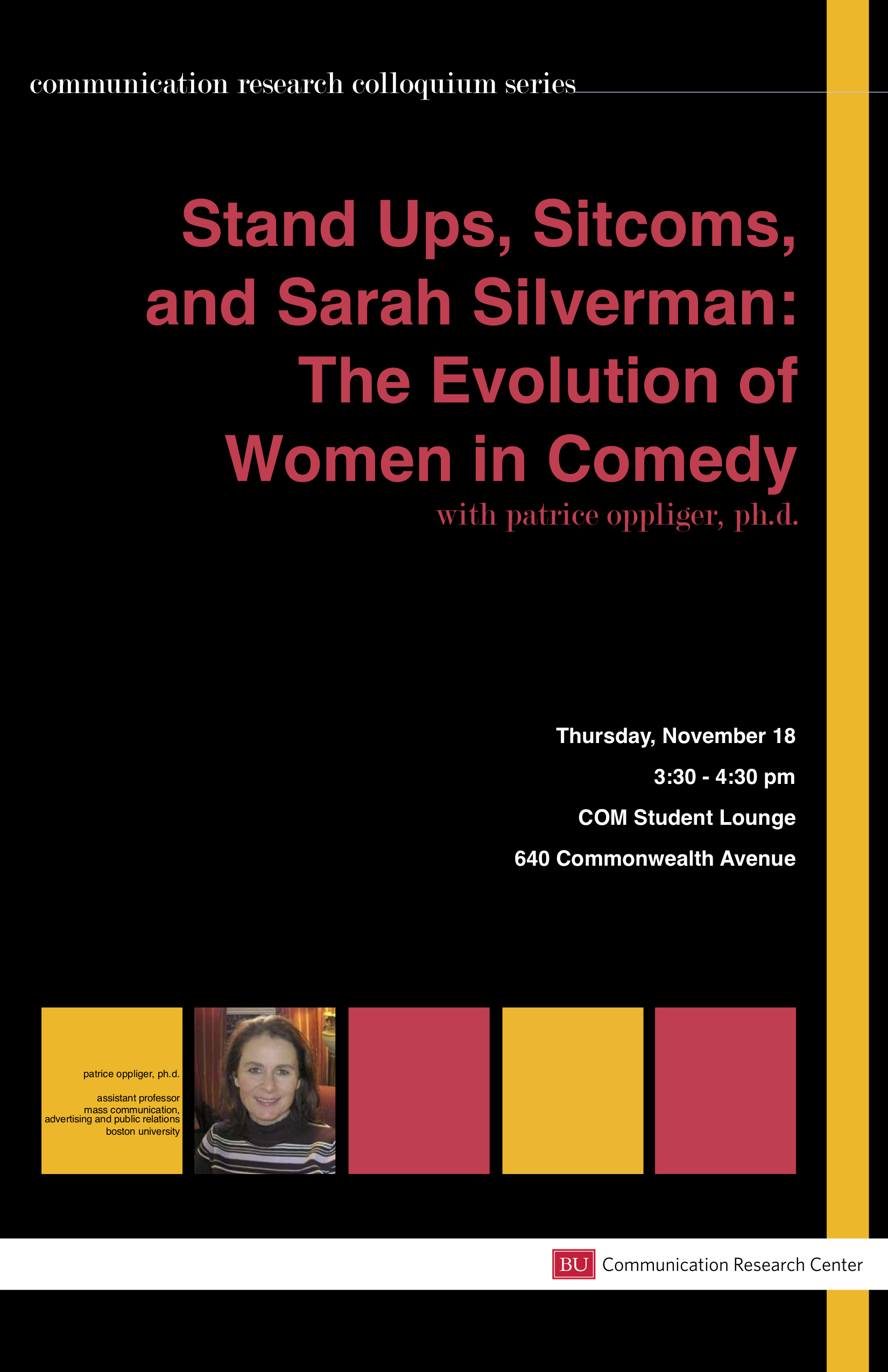 |
Stand Ups, Sitcoms, and Sarah Silverman: The Evolution of Women in ComedyDr. Patrice Oppliger
|
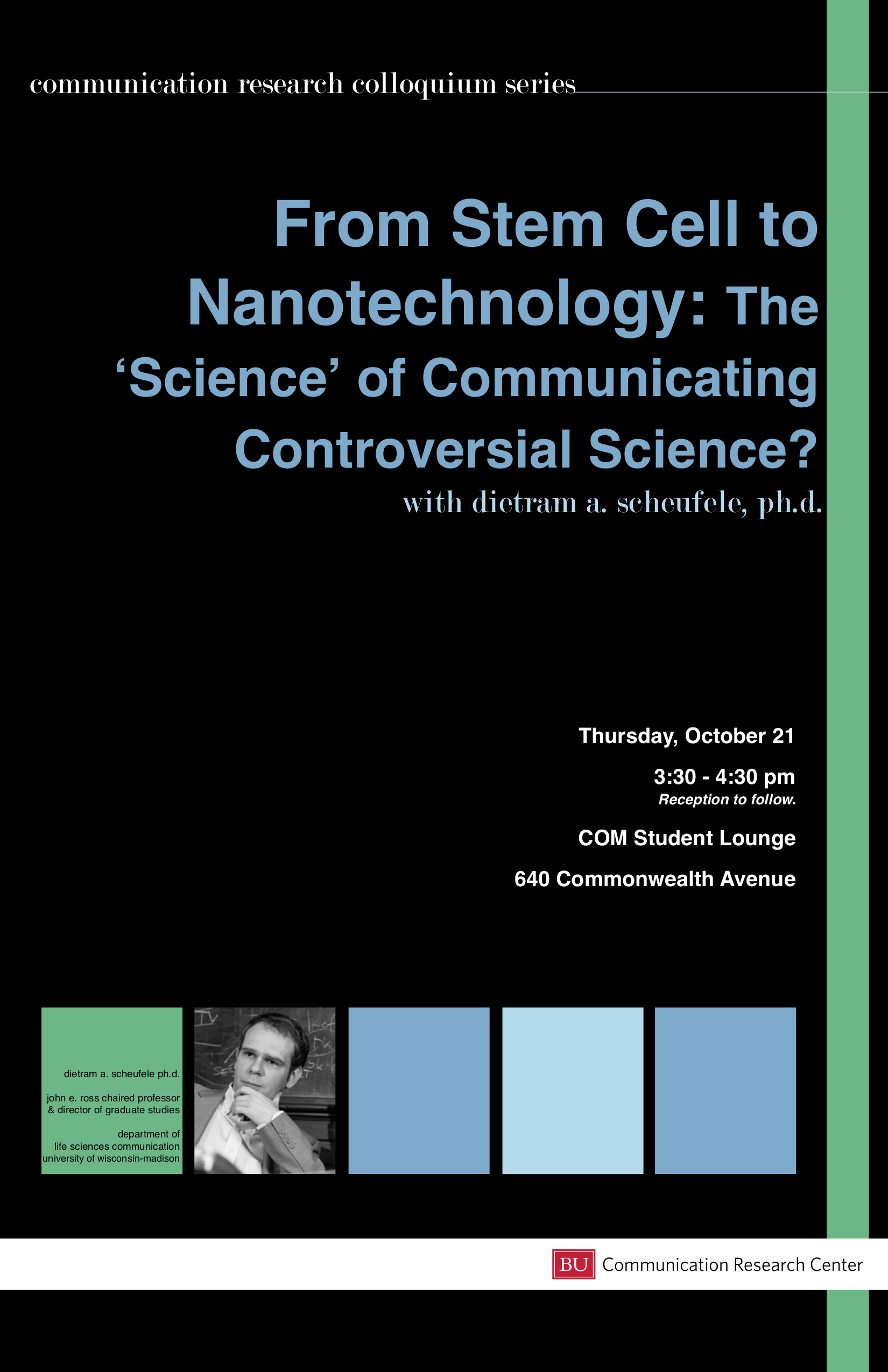 |
From Stem Cells to Nanotechnology: The Science of Communicating Controversial ScienceDr. Dietram Scheufele
|
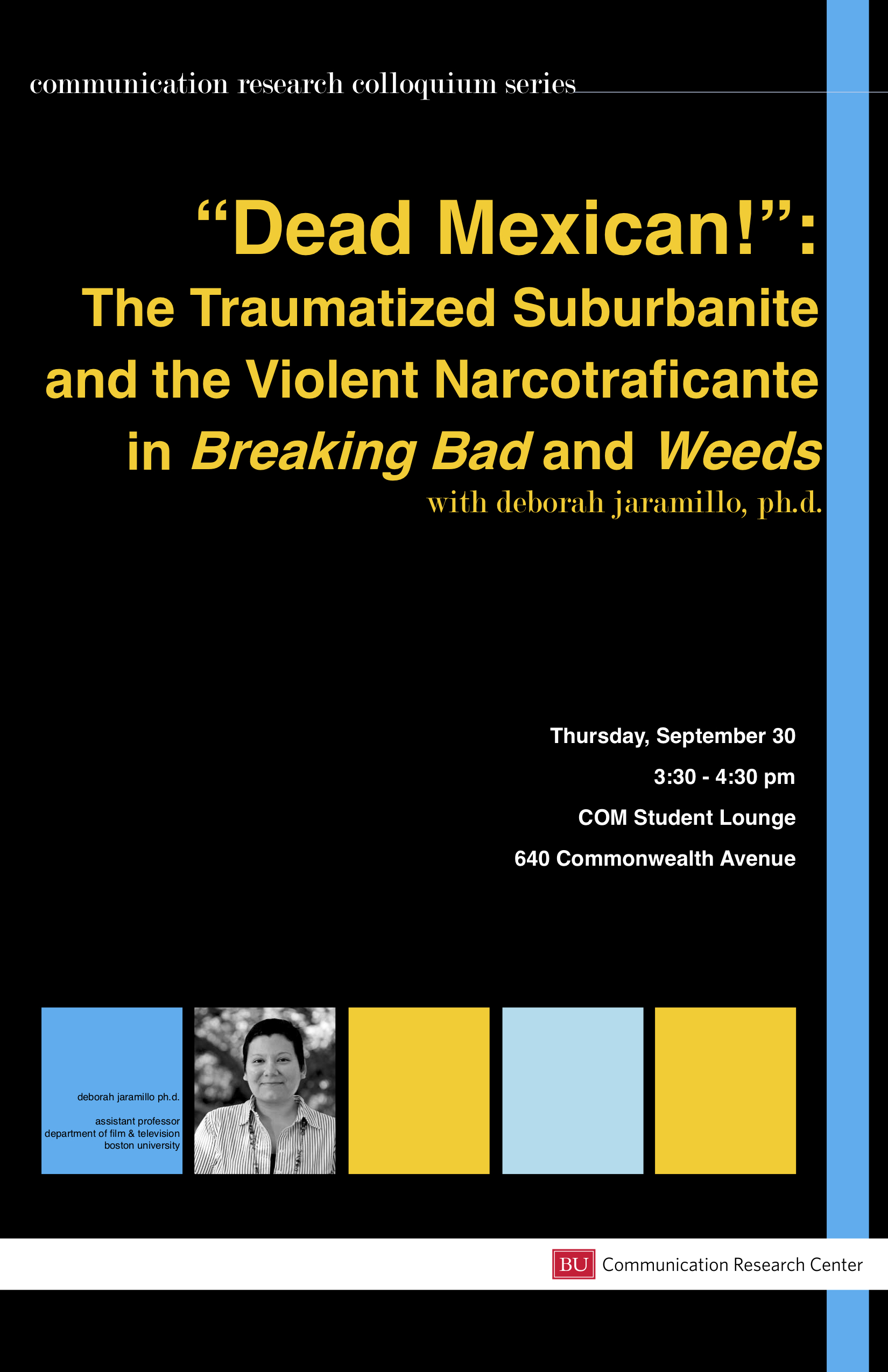 |
“Dead Mexican!”: The Traumatized Suburbanite and the Violent Narcotraficante in Breaking Bad and WeedsDr. Deborah Jaramillo
|
2009 - 2010 Lectures
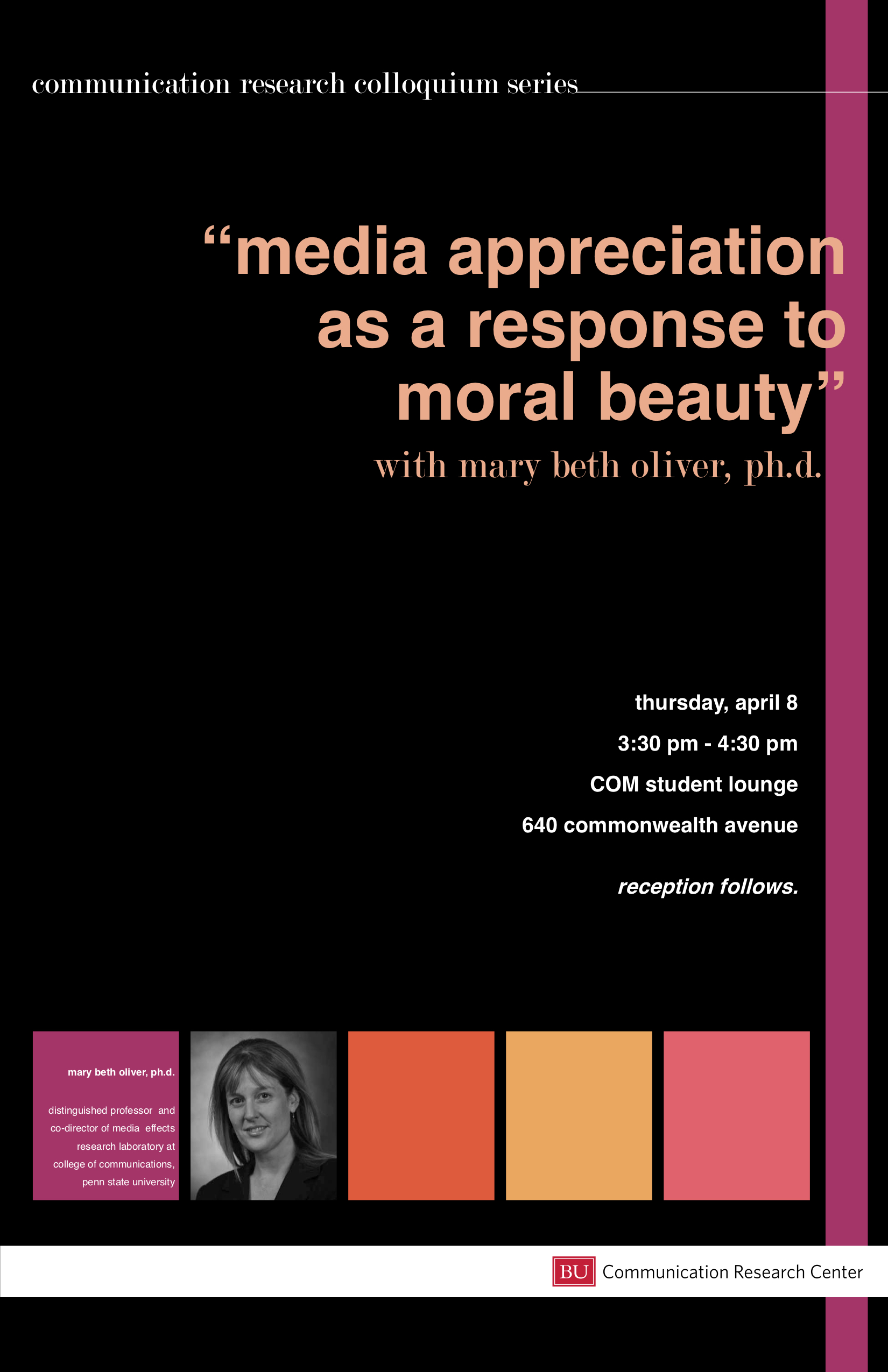 |
Media Appreciation as a Response to Moral BeautyDr. Mary Beth Oliver
|
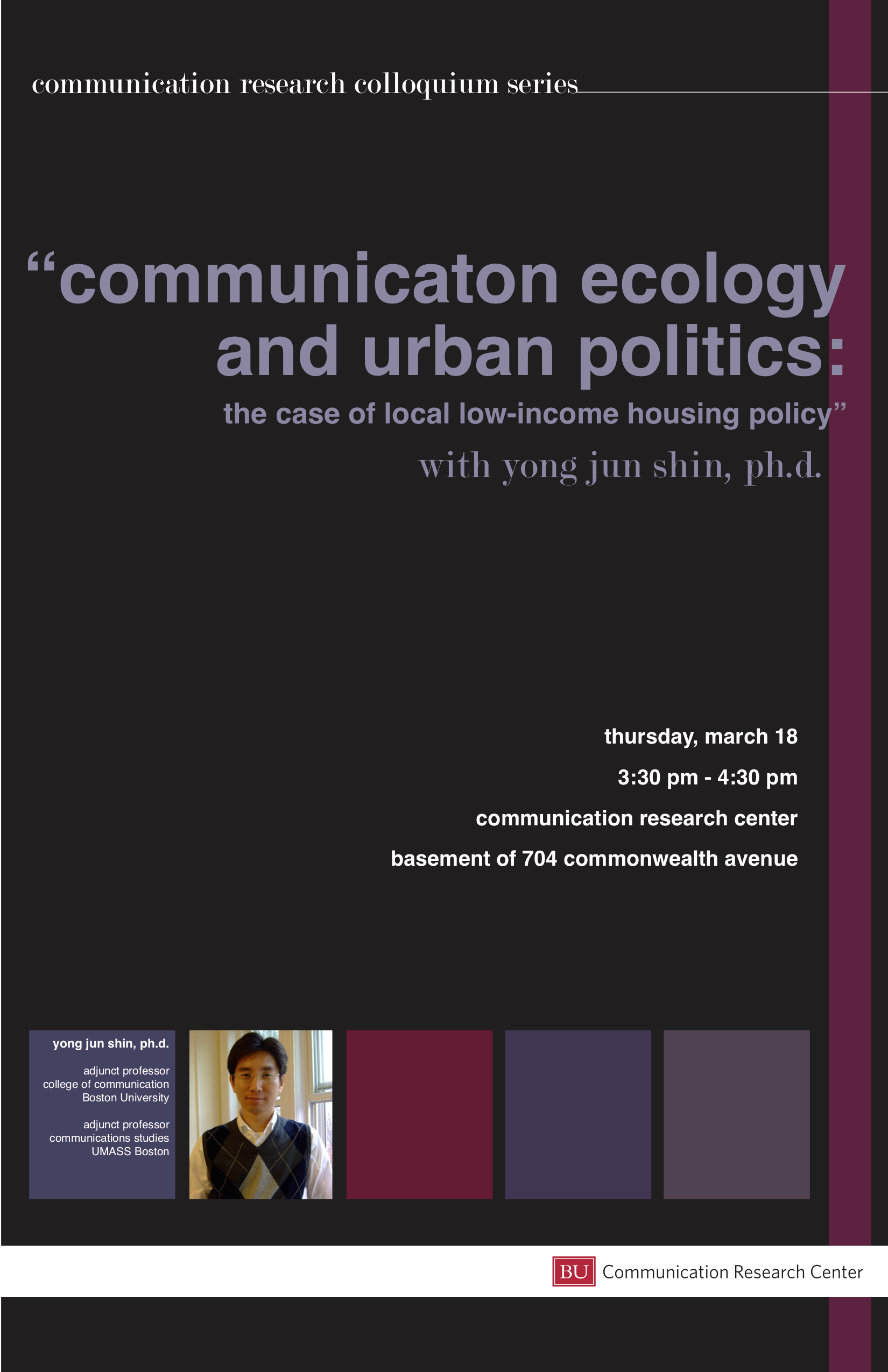 |
Communication Ecology and Urban Politics: The Case of Local Low-Income Housing PolicyDr. Yong Jun Shin
|
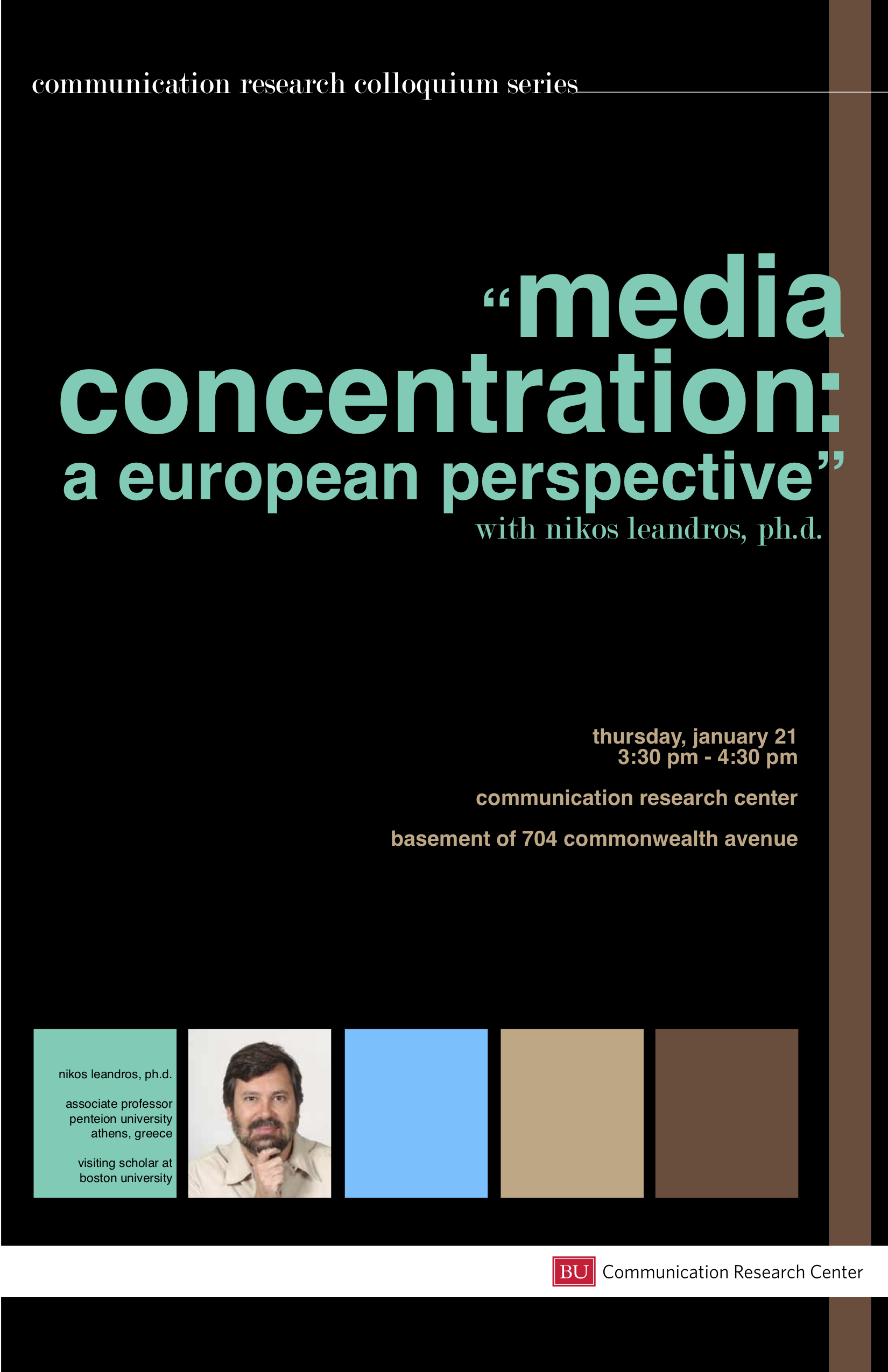 |
Media Concentration: A European PerspectiveDr. Nikos Leandros
|
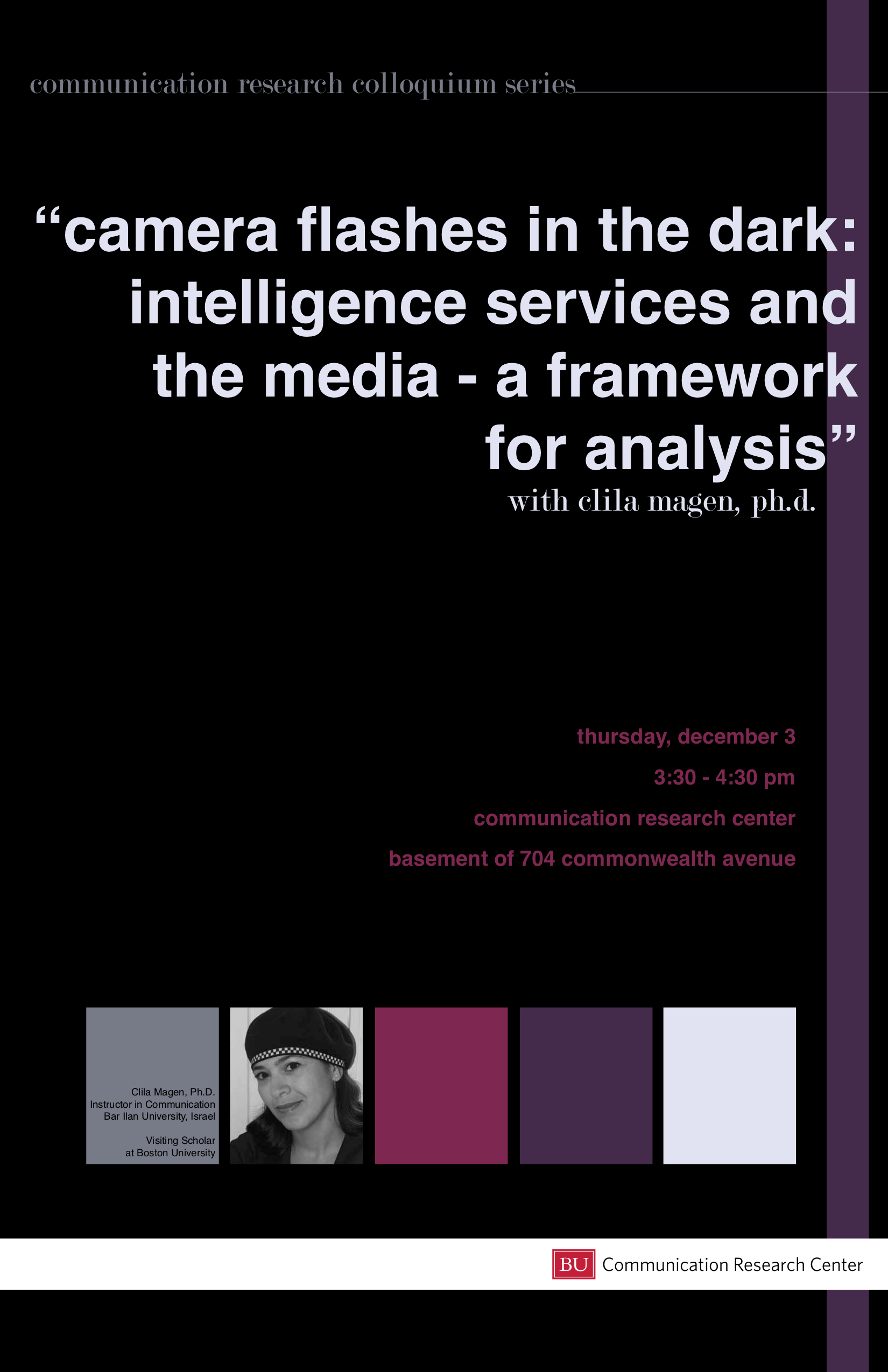 |
Camera Flashes in the Dark: Intelligence Services and the Media – A Framework for AnalysisDr. Clila Magen
|
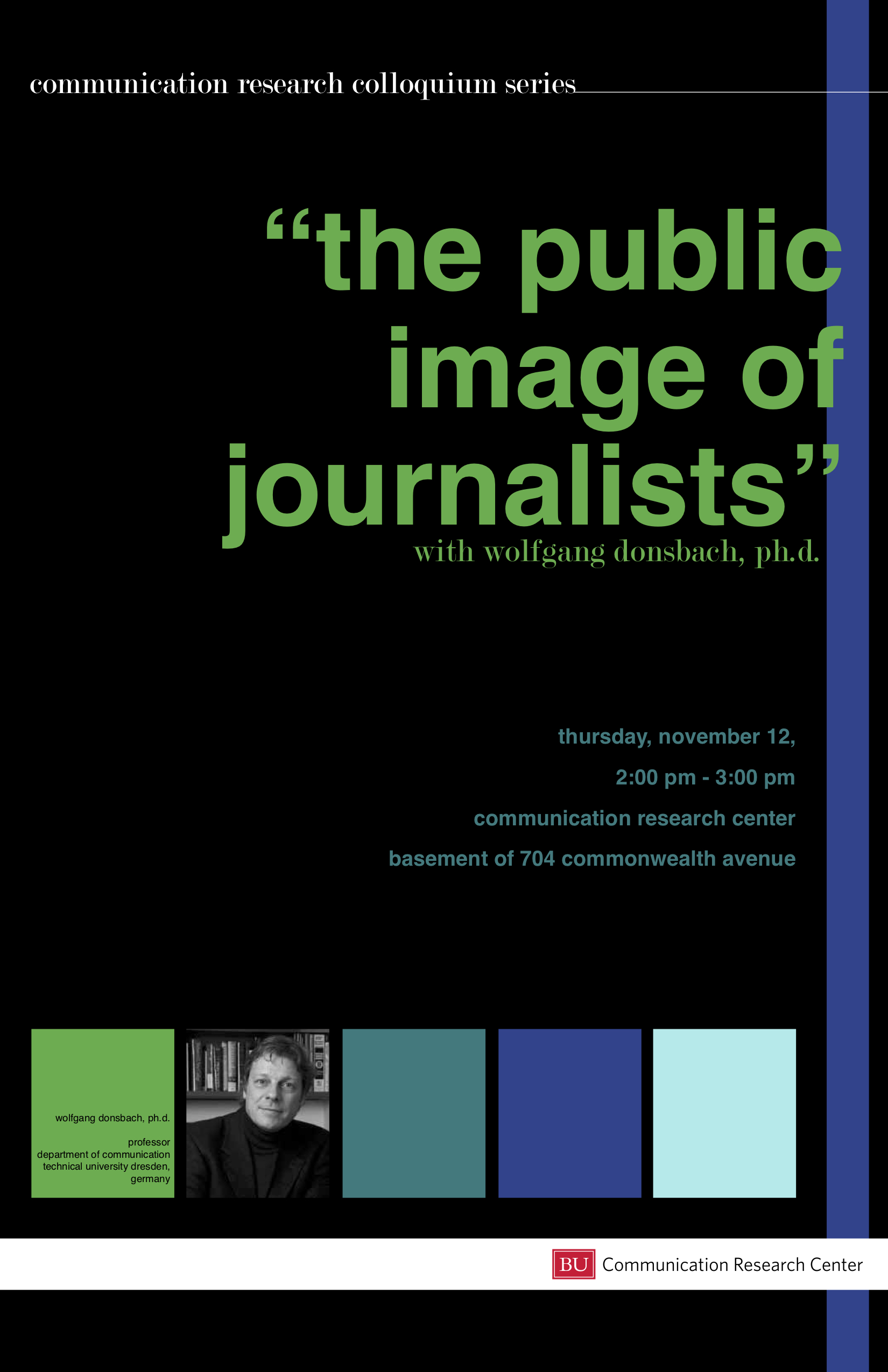 |
The Public Image of JournalistsDr. Wolfgang Donsbach
|
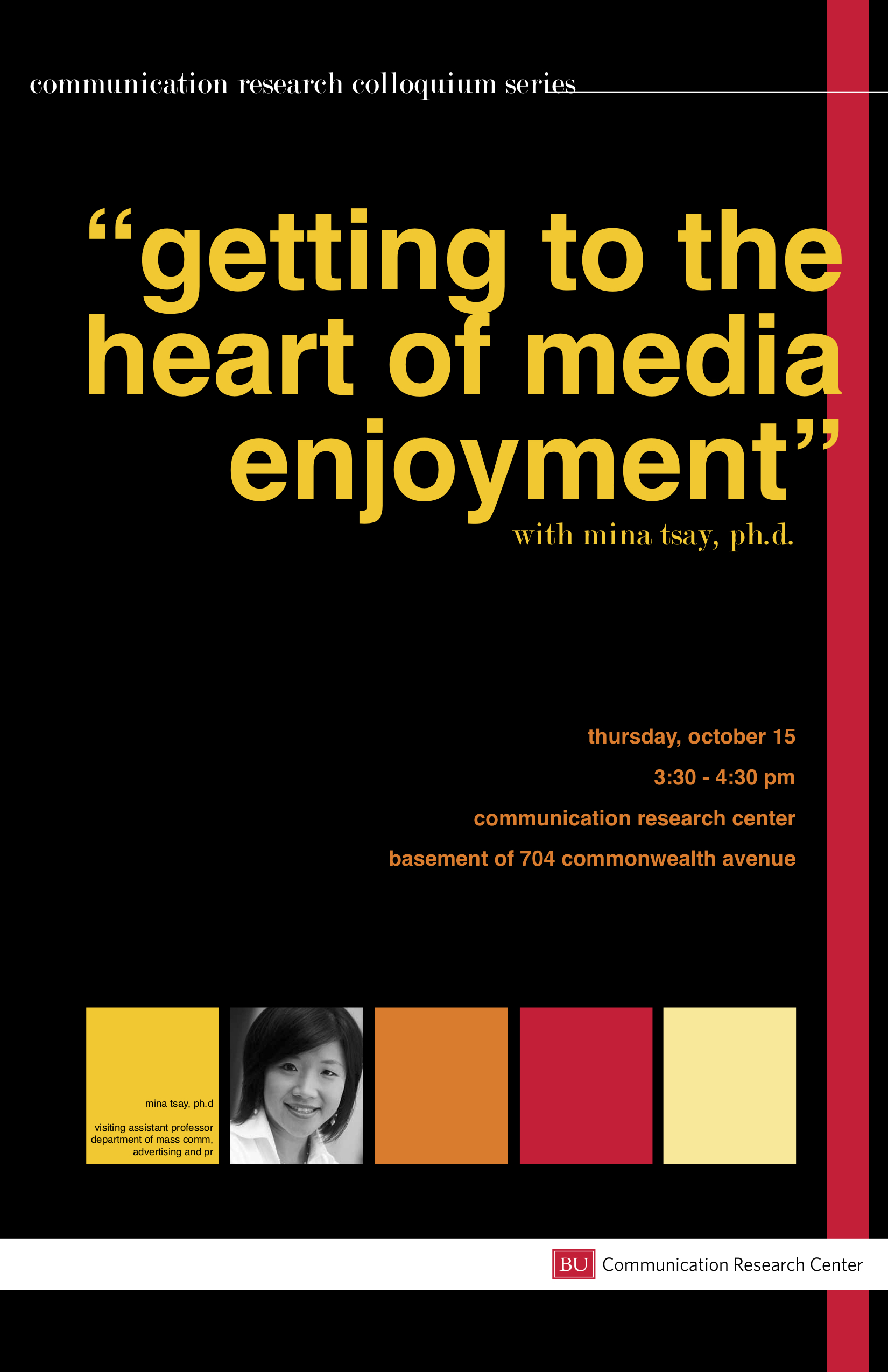 |
Getting to the Heart of Media EnjoymentDr. Mina Tsay-Vogel
|
Interviews from 2009 and 2010
 |
Diversity of Television Exposure and its Association with the Cultivation of Concern for Environmental RisksJune 2010 |
 |
Ugly War, Pretty PackageDecember 2009 |

|
Testing the ‘Proximate Casualties’ HypothesisNovember 2009 |
